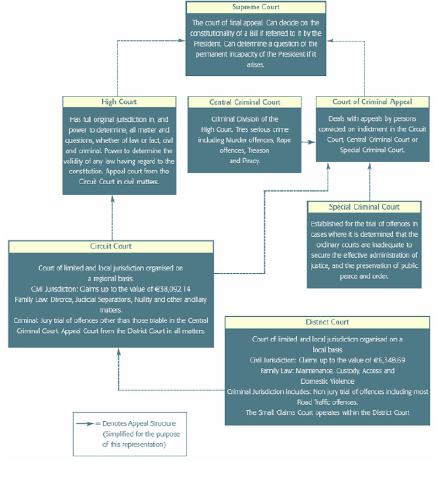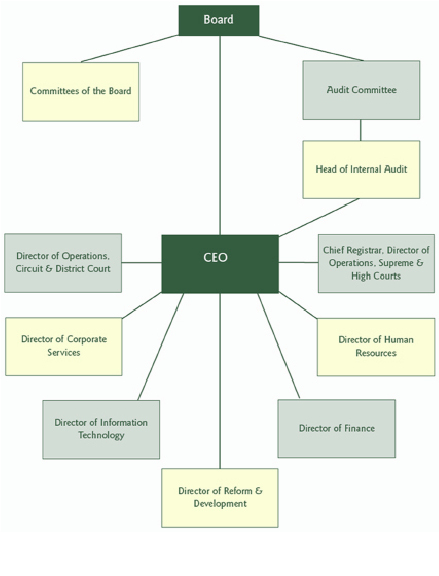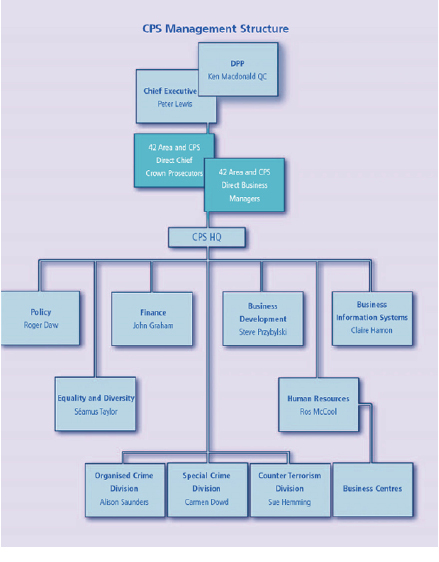Session 2007/2008
First Report
Assembly and Executive review committee
Report on the Inquiry
into the Devolution of
Policing and Justice Matters
Volume 2
Written Submissions, Other Correspondence ,
Party Position Papers, Research Papers, Other Papers
Ordered by the Assembly and Executive Review Committee to be printed 26 February 2008
Report: 22/07/08R (Assembly and Executive Review Committee)
REPORT
EMBARGOED UNTIL
Commencement of the debate in Plenary on Tuesday, 11 March 2008
This document is available in a range of alternative formats.
For more information please contact the
Northern Ireland Assembly, Printed Paper Office,
Parliament Buildings, Stormont, Belfast, BT4 3XX
Tel: 028 9052 1078
Powers and Membership
Powers
The Assembly and Executive Review Committee is a Standing Committee established in accordance with Section 29A and 29B of the Northern Ireland Act 1998 and Standing Order 54 which provide for the Committee to:
- consider the operation of Sections 16A to 16C of the Northern Ireland Act 1998 and, in particular, whether to recommend that the Secretary of State should make an order amending that Act and any other enactment so far as may be necessary to secure that they have effect, as from the date of the election of the 2011 Assembly, as if the executive selection amendments had not been made;
- make a report to the Secretary of State, the Assembly and the Executive Committee, by no later than 1 May 2015, on the operation of Parts III and IV of the Northern Ireland Act 1998; and
- consider such other matters relating to the functioning of the Assembly or the Executive as may be referred to it by the Assembly.
Membership
The Committee has eleven members including a Chairperson and Deputy Chairperson with a quorum of five. The membership of the Committee since its establishment in May 2007 has been as follows:
| Rt Hon Jeffrey Donaldson (Chairperson) | Mr Danny Kennedy |
| Mr Raymond McCartney (Deputy Chairperson) | Mr Nelson McCausland |
| Mr Alex Attwood | Mr Ian McCrea |
| Ms Carmel Hanna | Mr Alan McFarland |
| Ms Carál Ní Chuilín | Mr John O’Dowd |
| Mr George Robinson |
Contents
Volume 1
Executive Summary
Summary of Recommendations
Introduction
The Committee’s Approach
Issues, findings, recommendations and conclusions
Annex A – Summary of what will devolve and what will not devolve
Appendicies
Appendix 1 – Minutes of Proceedings relating to the report
Appendix 2 – Minutes of Evidence
Appendix 3 – Papers from the NIO
List of Witnesses
Volume 2
Appendix 4 – Written Submissions
Appendix 5 – Party Position Papers
Appendix 6 – Other Correspondence
Appendix 7 – Research Papers
Appendix 8 – Other Papers
Appendix 4
Written Submissions
_fmt.jpeg)
Mr Stephen Graham
Clerk to Assembly and
Executive Review Committee
Room 428
Parliament Buildings
Stormont Estate
Belfast
BT4 3XX
Tel: (0)28 9052 1784
Fax: (0)28 9052 5917
Email: stephen.graham@niassembly.gov.uk
9 July 2007
Dear Sir/Madam
Inquiry into the devolution of policing and justice matters
The Northern Ireland Assembly has requested that the Assembly and Executive Review Committee should report on the work which needs to be undertaken in accordance with Section 18 of the Northern Ireland (St Andrews Agreement) Act 2006 in relation to the transfer of policing and justice matters. The Committee determined that it would proceed with this work by conducting a formal inquiry. The terms of reference for the inquiry are:
Terms of Reference
1. To identify those policing and justice matters which are currently reserved matters under Schedule 3 of the Northern Ireland Act 1998 (the 1998 Act);
2. To consider which of these matters should be devolved and the extent to which they should be devolved;
3. To identify the preferred ministerial model and procedures for filling the ministerial post/posts for the new policing and justice department;
4. To identify what preparations need to be made by the Northern Ireland Assembly to facilitate the devolution of policing and justice matters and what preparations have been made;
5. To assess whether the Assembly is likely to make a request under section 4 (2A) of the 1998 Act before 1 May 2008, as to which policing and justice matters should cease to be reserved matters; and
6. To report to the Assembly by 29 February 2008.
The Committee agreed as well as inviting submissions from organisations with a specific interest in policing and justice matters, your organisation might be interested in making a written submission which addresses the terms of reference outlined above. Should you wish to do so, please submit your response by e-mail to: committee.assembly&executivereview@niassembly.gov.uk.
Alternatively, as specified in the guidance enclosed 15 hard copies of your submission should be sent to The Committee Clerk, Mr Stephen Graham, Room 428, Parliament Buildings, Stormont, BT4 3XX.
The deadline for receipt of written submissions has been extended to 26 September 2007. Please note that any submissions received may be included in the Committee’s final report.
Please note that following receipt of any written submission you might make, you may be invited to present your submission at an oral evidence session with the Committee sometime during September/October/November 2007. Further information on the work of the Committee can be accessed on the following webpage:
http://archive.niassembly.gov.uk/assem_exec/2007mandate/assem_exec.htm
If you have any queries, please get in touch with me on 028 9052 1784 or Roisin Donnelly on 028 9052 1845.
Yours faithfully

Stephen J Graham
Committee Clerk
List of Written Submissions
Committee on the Administration of Justice
Compensation Agency
Criminal Justice Inspection Northern Ireland
Disability Action
Down District Policing Partnership
Garda Síochána
HM Revenue and Customs
Include Youth
Legal Service Commission
Lord Chief Justice, Northern Ireland
Methodist Church in Ireland
Northern Ireland Affairs Committee
Northern Ireland Court Service
Northern Ireland Human Rights Commission
Northern Ireland Law Commission
Northern Ireland Office (Mr Paul Goggins MP)
Northern Ireland Policing Board
Northern Ireland Women’s European Platform
Presbyterian Church in Ireland
Probation Board for Northern Ireland
Police Service of Northern Ireland
Public Prosecution Service, Northern Ireland
Robert McCartney Justice Campaign
Serious Organised Crime Agency
The Equality Commission for Northern Ireland
The Irish Congress of Trade Unions
The Law Society of Northern Ireland
The Minister for Justice, Equality and Law Reform
The Scottish Government
Committee on the
Administration of Justice
Stephen J Graham
Clerk to the Assembly and Executive Review Committee
Room 428 Parliament Buildings
Stormont Estate
Belfast
BT4 3XX
3rd August 2007
Dear Mr Graham
Thank you for inviting the Committee on the Administration of Justice (CAJ) to make a written submission to the inquiry into the devolution of policing and justice matters. The Committee on the Administration of Justice (CAJ) was established in 1981 and is an independent non-governmental organisation affiliated to the International Federation of Human Rights. CAJ works on a broad range of human rights issues and its membership is drawn from across the community. CAJ’s activities include publishing reports, conducting research, holding conferences, monitoring, campaigning locally and internationally, individual casework and providing legal advice. Its areas of work are extensive and include policing, emergency laws, criminal justice, equality and the protection of rights. The organisation has been awarded several international human rights prizes, including the Reebok Human Rights Award and the Council of Europe Human Rights Prize.
As part of its work around policing and criminal justice, CAJ produced last year a major report on the devolution of criminal justice and policing powers to Northern Ireland. The report looks at models on offer from other jurisdictions and evaluates the advantages and disadvantages associated with each. Moreover, the report looks at other accountability mechanisms that need to be built into any system to ensure that power is administered fairly, effectively and in a human rights compliant manner. In addition, the report looks at the recent changes that have been taking place in criminal justice system in Northern Ireland as regards the impact they could have on devolution of power to the local level. Finally, it examines the issue of the delineation of powers to be devolved or retained at Westminster and the consequences this may have.
As such, we are very well placed to engage in this debate and we believe the content of our report will be extremely pertinent. In particular, chapter 2 on “governmental models for administering justice and policing functions” will be relevant for the discussions under point 3 of the inquiry’s terms of reference.
In relation to points 1 and 2 of the terms of reference concerning identification of matters which are currently reserved under Schedule 3 of the Northern Ireland Act and which of these should be devolved, this is a matter which CAJ believes is of crucial importance. We understand that some work was undertaken in relation to this by the sub-group on policing and justice matters of the Preparation for Government Committee last year. However, we believe that what is needed is a detailed examination of all the legislation that relates to criminal justice and policing matters in Northern Ireland in order to ascertain what power lies where and what exactly would be devolved. The Criminal Justice Review and Patten reports, and the various pieces of enacting legislation arising there from, contain various recommendations and sections imposing obligations and bestowing powers on the local administration, on Westminster and on the local administration post-devolution. The result is a distinct lack of clarity on who does what and when.
To take a concrete example, at the time of the passage of the legislation arising from the Patten report, much parliamentary concern was expressed about the appropriate relationship between the Secretary of State and the Policing Board. The conclusion at that time was that the Secretary of State should be given clear authority to override the decision of the Board in a number of respects.[1] Such primacy for the executive minister in Westminster was seen by many as problematic, but it might appear just as problematic, or even more so, if the “trump card” is in future held in the hands of a single locally elected minister. It is therefore essential that these powers should be re-examined in the context of future legislation to provide for the transfer of justice and policing powers to Northern Ireland.
The need for clarity is an issue that was also raised by the then Justice Oversight Commissioner who commented in his second report that:
“It would be useful for a study to be undertaken in advance of any devolution to identify the precise powers which would be transferred to the Northern Ireland Executive and what arrangements would be needed for their transfer.”
We therefore feel that a useful starting point for the Committee as it embarks on this inquiry would be to request such a detailed breakdown of powers from the Northern Ireland Office.
We enclose for circulation to the Committee copies of this covering letter and of the Executive Summary of this report, as well as a copy of the full report for you. Copies of the full report can be made available to all members of the Committee should you find this helpful. We would also be very keen to testify to the Committee should it decide to receive oral evidence, and we look forward to hearing from you in this regard.
Yours sincerely
Aideen Gilmore
Research & Policy Officer
[1] The Secretary of State can, for example, override a decision by the Board to hold an inquiry if s/he agrees with the Chief Constable that the Board’s request would: (a) interfere with national security interests; (b) relate to an individual and be of a sensitive personal nature; (c) likely to prejudice ongoing judicial proceedings; or (d) prejudice the detection of crime or apprehension/prosecution of offenders. See s. 59(3) and s.60(5) of Police (NI) Act 2000. Elsewhere, in s. 25(1)(a), the Secretary of State has a wide-ranging but relatively undefined power to issue “codes of practice relating to the discharge by the Board of any of its functions.”
Change and Devolution of Criminal Justice and Policing in Northern Ireland: International Lessons
Committee on the Administration of Justice (CAJ)
January 2006
Summary of Recommendations
1. CAJ takes no position on the constitutional status of Northern Ireland and this report therefore takes no formal position on devolution within the UK context, nor does it address a series of issues around an all-Ireland relationship. These questions can and presumably will be addressed in the course of detailed negotiations between the various political parties and the British and Irish governments, in the context of discussions to date in the 1998 Agreement and the subsequent Joint Declaration (2003). At the same time, it is fair to say that the starting premise of this work was that in principle devolution of criminal justice and policing to more localised democratic control was to be welcomed, because it brings crucial decision making closer to those directly affected by those decisions. That said, our primary concern is that any eventual models of devolution be measured against clear human rights criteria, and that assessments of their relative merits and demerits be made on the basis of such criteria.
Any proposed devolution model needs to be assessed for its ability to:
- be open and transparent, so as to secure widespread public confidence;
- ensure an efficient and effective justice system;
- provide legal, democratic and financial accountability;
- represent the diversity that is Northern Ireland, and thereby ensure trust in its ability to work impartially and fairly for all; and
- deliver the administration of justice to the highest standards, as laid down in international and national human rights law.
2. CAJ recommends that the discussion about the appropriate devolution model to adopt should itself be an open and transparent debate, and should not be, or be seen to be, held behind closed doors and the subject to horse trading between different political parties. CAJ believes that the timetable for debate and for decision making is also a matter of public interest, rather than merely party political interest. It is particularly problematic that many changes recommended in the Criminal Justice Review are being treated (unjustifiably in our view) as contingent on devolution. Further foot-dragging of this kind can only fuel speculation that some of the Review recommendations are being held back so as to be treated as “bargaining chips” in the eventual political negotiations around devolution.
3. Regarding the appropriate governmental structures in any devolved criminal justice arrangements, CAJ concludes on the basis of its research that:
- a single department/minister may meet concerns about efficiency and effectiveness but may pose concerns around credibility and legitimacy in a politically polarised society like Northern Ireland. If it is determined to pursue a single ministry model, the emphasis will need to be on safeguards (such as those outlined in recommendation 4) that will ensure that the party ‘holding’ the single ministry is behaving in an impartial and non partisan way.
- a two or more departmental model would potentially offer Northern Ireland greater security against charges of ministerial partisanship since the departments can be headed up by members of different political traditions, who could be expected to act as a safeguard upon each other. This model risks being or appearing less efficient, and if pursued, the emphasis would need to be on mechanisms aimed at ensuring coordination, and collaboration across the criminal justice agencies will need to be the primary consideration.
- Northern Ireland already has the experience of the Office of the First and Deputy First Minister, which seeks to bring together cross-community ministerial responsibility within the operation of a single department, and some consideration was given to whether a similar model could be applied to a future Ministry of Justice. In reality, no other country studied had a model of this kind, so comparisons with elsewhere cannot be easily drawn upon. When learning from experience to date in Northern Ireland, it would appear that if this joint-leadership cross-community model were to be applied to criminal justice, it would be important to (i) have a clear delineation of responsibilities between the Minister and Deputy Minister (ii) establish clear protocols governing when joint agreement is needed and/or when a veto arrangement might operate and (iii) introduce a fall back mechanism to resolve any stalemates.
4. No executive governmental model (one, multiple, shared) is going to be self-sufficient in providing safeguards in such a highly contentious and politically problematic area. Northern Ireland should give active consideration to all of the following additional safeguards:
- Constitutional safeguards and Bills of Rights: a strong Bill of Rights for Northern Ireland will be an extremely important element of developing a criminal justice system that is both human rights compliant and sympathetic, and as such has a central role to play as an engine for transformation and change within criminal justice institutions.
- Parliamentary safeguards: tried and tested traditional methods of parliamentary scrutiny such as committees, questions and reporting obligations are extremely effective methods of holding minister(s) to account.
- Inspectorates/oversight mechanisms: such mechanism have already proved essential in monitoring the implementation of change in policing and criminal justice, and more permanent mechanisms should be considered.
- Complaints systems: while these are traditionally more common in relation to policing, the Criminal Justice Review recognised the importance of criminal justice institutions adopting procedures for complaints. Clearly the more independent these mechanisms are the better.
- Effective and independent judiciary: the judiciary must be in a position to rule objectively on the standards and human rights to which a member of the executive must adhere in the exercise of his or her ministerial responsibilities. Its established presence as an impartial and distinct organ of government should be a powerful deterrent to any justice minister who is tempted to act in a way which would be inconsistent with his or her office.
- Scrutiny at the local administrative level: the Criminal Justice Review envisaged a single local entity – building upon the Patten idea of District Policing Partnerships (DPPs) – which would deliver a holistic participatory approach to local policing and community safety. Government’s decision to run two local entities in tandem (DPPs and Community Safety Partnerships (CSPs)), with little coordination, seriously risks undermining the impact either body can hope to have.
- International scrutiny mechanisms: Government policy, the judiciary, the police, and all the criminal justice agencies, are obliged to comply with the international human rights standards that the authorities have freely signed up to.
- Civilian oversight and statutory commissions: bodies such as the NI Policing Board, Judicial Appointments Commission, Police Ombudsman and Criminal Justice Inspectorate will all be extremely important in monitoring the police and criminal justice institutions.
5. CAJ recommends that any major institutional change in criminal justice and policing be built upon a detailed programme of work which ensures that the new arrangements embrace change and commit to the principles such as openness, transparency, accountability and human rights as set out in recommendation 1 of the Criminal Justice Review.
In particular, CAJ notes that a number of the key recommendations from the Criminal Justice Review that are instrumental in bringing about such change have made the least progress in implementation. Institutional resistance to change, and the failure to fully embrace cultural transformation leads to serious questions about the ability of the criminal justice system to transform itself into one which commands the confidence of the community it serves. In particular, this report highlights how recommendations relating to securing a representative workforce, a more reflective judiciary, equity monitoring of those who pass through the criminal justice system, the policy around the giving of reasons for no prosecution, the implementation of complaints mechanisms, codes of ethics and discipline, and the provision of adequate and relevant human rights training have been most protracted in their implementation. CAJ notes that institutional and political resistance to deeper cultural change is evident in relation to these recommendations.
Without pressure for deeper institutional change, rebuilding confidence in the criminal justice system faces a tough challenge. At present it is difficult to see where such pressure exists. Arguably, the devolution of criminal justice and policing powers, and the local scrutiny and accountability that this will entail, could increase such pressure. Equally, however, failure to embrace the real and meaningful cultural change envisaged by the Criminal Justice Review could mean that other recommendations and reforms run the risk of becoming redundant, and indeed the devolution of criminal justice and policing powers would be of limited affect.
6. CAJ recommends that criminal justice only be devolved once there is a clear delineation of the exact powers that are to be ‘devolved’ and those that are to remain ‘excepted’. It is particularly important that there is clarity in the area of emergency powers and national security. There will be arguments as to whether to devolve more or less authority to locally elected bodies in these particularly contentious areas, but this must be determined in advance of the transfer of powers. It is extremely worrying that, despite several requests, the Northern Ireland Office has not complied with requests from CAJ and others to provide a factual list of the various powers, who holds them currently, and which of these powers might or might not be devolved in future. It is CAJ’s view that if there is ambiguity surrounding the nature and extent of authority and powers being transferred from Westminster to Northern Ireland, this would be very destabilising for the peace process, and could seriously undermine the efficiency and legitimacy of the eventual arrangements. Decisions underway currently, for example, regarding the transfer of key intelligence functions from the Police Service for Northern Ireland to MI5 will determine to a great extent the nature of criminal justice and policing powers to be devolved. In the past, problems of communication between internal branches of the police service – Special Branch and the regular units of either the RUC or PSNI – has led to grave errors (see, for example, the Ombudsman’s inquiry into the Omagh bombing). The transfer of some of these functions to an agency outside of the Police Service of Northern Ireland makes the likelihood of such errors more not less likely in future. Very importantly, it removes some key functions – ones which traditionally lend themselves most easily to abuses of human rights – from effective local oversight. A devolution of powers that is seen by people in Northern Ireland to be devolution in name only will only be counter-productive.
For further details or a copy of the report contact: CAJ, 45-47 Donegall St, Belfast, BT1 2BR; tel: 02890 961122; e-mail: info@caj.org.uk
Compensation Agency
17 July 2007
Inquiry into the devolution of policing and justice matters
Thank you for your letter of 9 July asking the Agency to give evidence to the Assembly and Executive Review Committee about the devolution of justice and policing functions. As an Executive Agency, we are part of the Northern Ireland Office and are accountable to Ministers there. As such, any response to your request would issue from NIO Ministers covering all of the Department.
I can, however, confirm that the discussion paper issued by the Government in February 2006 envisaged the transfer to the Northern Ireland Executive of all the functions falling in the reserve field currently undertaken by the Compensation Agency, and that remains our working assumption pending the outcome of the Assembly’s consideration.
I should mention that the Agency currently ministers, amongst its compensation schemes, one covering actions taken under the Terrorism Act. While the Act itself is not to be a devolved matter, I should envisage that the Agency will be asked to continue to administer the applications – which are now at a fairly low level – on the basis of a service level agreement.
Gareth Johnston
Chief Executive
Criminal Justice Inspection
Northern Ireland
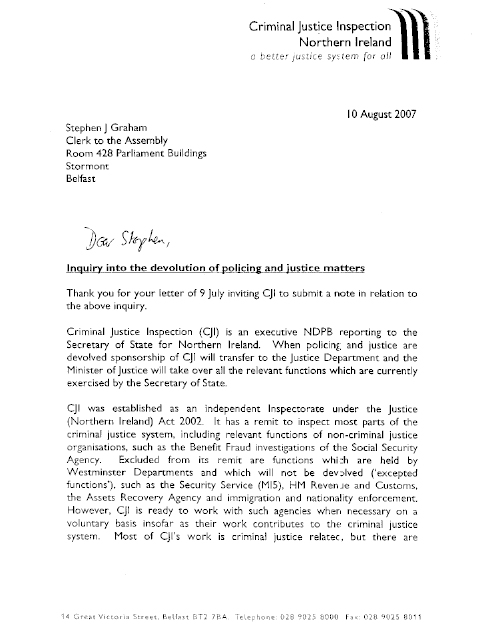
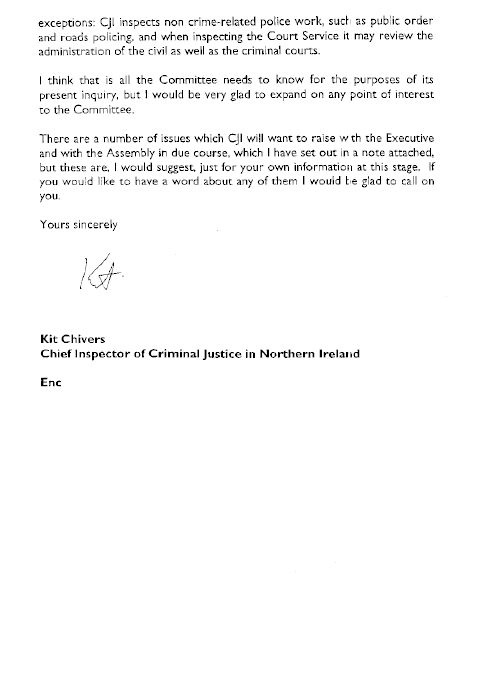
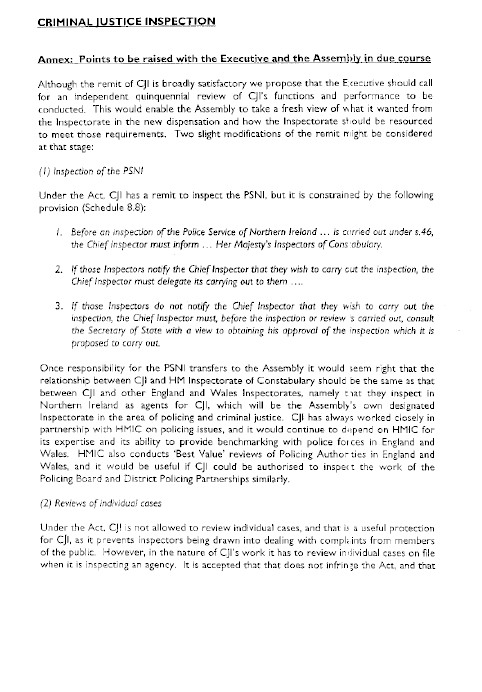
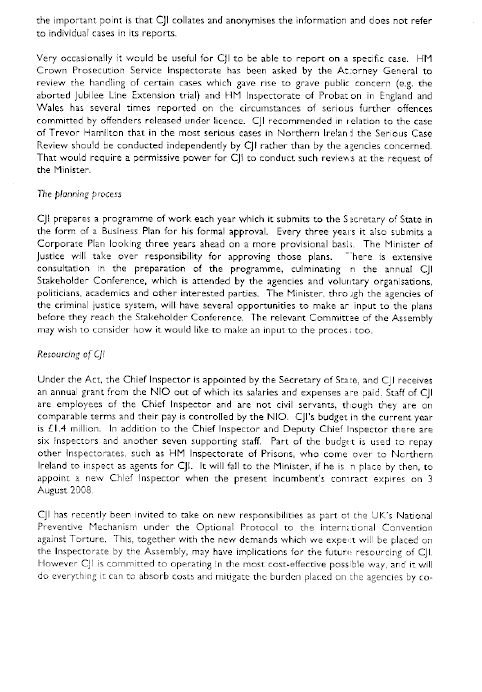
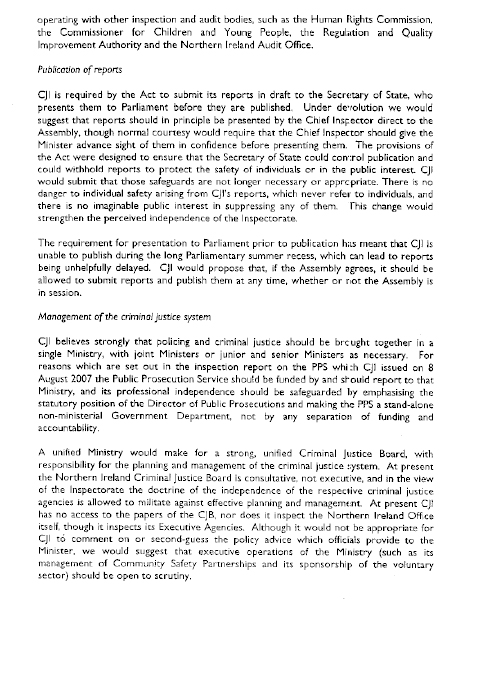
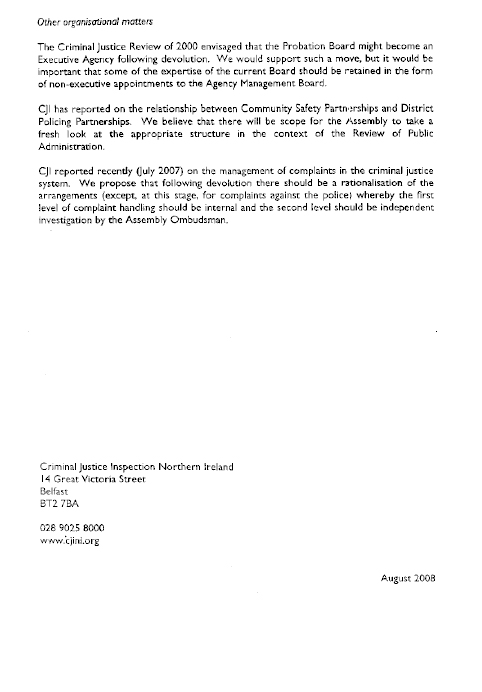
Disability Action

Inquiry into the Devolution of Policing and Justice Matters
Disability Action’s Response
August 2007
Any enquiry concerning this document should be made to the
Office of the Chief Executive
Disability Action
189 Airport Road West
Belfast BT3 9ED
Tel: 028 90 297880
Fax: 028 90 297881
Textphone: 028 90 297882
Introduction
1 Disability Action is a pioneering Northern Ireland charity, working with and for people with disabilities. We work with our members to provide information, training, transport, awareness programmes and representation for people regardless of their disability; whether that is a physical, mental, sensory, hidden or learning disability.
2 More than one in five (300,000) people in Northern Ireland has a disability and the incidence is higher here than in the rest of the United Kingdom. Over one quarter of all families here are affected.
3 As a campaigning body, we work to bring about positive change to the social, economic and cultural life of people with disabilities and consequently our entire community.
4 Our range of services is provided from a Head Office based in Belfast and three local offices, with 85 staff and 250 volunteers.
5 Disability Action welcomes the opportunity to respond to this draft and to aid our response has put the relevant page/paragraph of the draft in brackets at the end of our comments.
General Commentary
2.1 Disability Action has recently established a Centre on Human Rights for Disabled People. The aim of the Centre is to secure the human rights of people with disabilities in Northern Ireland. Details of the Centre are enclosed for your perusal.
2.2 Disability Action welcomes the opportunity to make a written submission to the Northern Ireland Assembly Inquiry into the devolution of policing and justice matters. Disability Action is concerned with the interests of people with disabilities who whether they are victims of crime or perpetrators of crime.
3.0 The Rights of People with Disabilities
3.1 Disability has, until fairly recently, been an overlooked or ‘forgotten’ dimension of human rights[1]. Despite the existence of various human rights instruments at regional, European and international levels, people with disabilities continue to experience marginalisation, exclusion, disadvantage, and discriminatory assumptions about their quality of life. That is, people with disabilities are often subject to extensive human right violations.
3.2 The International Convention on the Rights of Persons with Disabilities (hereafter referred to as the Convention), and its optional protocol, was adopted by the United Nations (UN) General Assembly in New York on 13 December 2006. This Convention was signed by both the United Kingdom and Ireland at UN Headquarters on 30 March 2007, and is currently awaiting ratification by both States.
3.3 The international convention provides a major boost for disabled people’s human rights. The Convention obliges signatory States, which now include the UK and Ireland, to “promote, protect and ensure the full and equal enjoyment of all human rights and fundamental freedoms by all persons with disabilities, and to promote respect for their inherent dignity.”
3.4 Disability Action wishes to direct the attention of the Executive to a number of articles contained within the Convention on the Rights of Disabled Persons which we feel are of particular significance to the present Inquiry:
- Article 5 requires States Parties to promote equality and prohibit all discrimination on the basis of disability
- Article 8 requires States Parties to foster respect for the rights and dignity of persons with disabilities and combat stereotypes, prejudices and harmful practices
- Article 10 requires States Parties to guarantee that persons with disabilities enjoy their inherent right to life on an equal basis with others
- Article 12 requires States Parties to ensure that persons with disabilities: have the right to recognition as persons before the law; that persons with disabilities enjoy legal capacity on an equal basis with others in all aspects of life; and that State Parties take appropriate measures to provide access by persons with disabilities to the support they may require in exercising their legal capacity.
- Article 13 requires States Parties to ensure effective access to justice for persons with disabilities on an equal basis with others, including through the provision of procedural and age-appropriate accommodations, as witnesses, and in all legal proceedings, including at investigative and other preliminary stages. Article 13 further requires State Parties to promote appropriate training for those working in the field of the administration of justice, including police and prison staff.
- Article 15 requires States Parties to guarantee freedom from torture or cruel, inhuman or degrading treatment or punishment
- Article 21 requires States Parties to ensure that persons with disabilities can exercise the right to freedom of expression and opinion, including the freedom to seek, receive and impart information and ideas on an equal basis with others and through all forms of communication of their choice
3.5 Disability Action urges the Executive to consider the forthcoming Convention as part of its Inquiry to ensure that, when ratified, Government’s obligations under the new Convention will be fully met.
4.0 Specific Commentary
4.1 There are currently no national statistics which can be drawn upon in relation to this issue. However, evidence, which we have outlined below, suggests that people with disabilities are more likely to be victims of certain crimes and anti-social behaviour compared to non-disabled people. Disability Action encourages the Executive Review Committee to actively address these issues when considering matters relating to the transfer of policing and justice.
4.2 The PSNI Statistical report shows that there were 70 incidents with a disability motivation reported to the PSNI, with 38 of these incidents recorded as crimes during the period 1 April 2005 – 31 March 2006. Twenty of the crimes recorded against disabled people during this period involved woundings or assaults. Criminal damage to property accounted for 9, theft 5, intimidation or harassment 3, and one recorded as ‘other violent crime’. There was little difference between urban and rural areas in terms of the types of crimes perpetrated apart from theft where there were 4 incidents recorded in urban areas compared with 1 in a rural area.
4.3 A study of 904 people with learning disabilities in England, Wales and Northern Ireland, ‘Living in Fear’ ( Mencap 1999) found that nine out of ten respondents reported being bullied, harassed or intimidated and of these, almost a quarter reported physical attack. There have been incidents of attacks on people with disabilities that have attracted media publicity, but it is widely estimated that there is serious under-reporting of such crimes as disabled people believe their complaint will not be taken seriously by the authorities or by society in general.
4.4 A more recent survey of disabled people in Scotland found that 47% or respondents had experienced hate crime because of their disability and 31% of these people experience incidents regularly; at least once a month.[2] Where disabled people may have become accustomed to enduring verbal abuse on a regular basis, they may not be aware that they can, or should, report the incident to the PSNI. They may be so accustomed to such behaviour that they have almost ‘normalised’ it as part of their day to day experience and would not expect the PSNI to take the incident seriously.
4.5 In addition, disabled people, particularly those with learning disabilities or visual impairments, may also have difficulty identifying and giving evidence against their attacker. In some cases, disabled people see these attacks as extensions of society’s view of them as second-class citizens.
4. 6 Research by Mencap in 2002 shows that disabled people are four times more likely to experience sexual abuse than non-disabled people, and people with learning disabilities are particularly likely to experience this type of abuse.[3]
4.7 Children and young people with disabilities can experience bullying, intimidation and verbal abuse.
4.8 Under-reporting has repercussions. When incidents go unreported, the perception in society is that they are not taking place. To believe this is more ‘comfortable’ than the realisation that ‘this does happen here’ and that it needs to be addressed. Also, there is the danger that the perpetrators of hate crimes will believe their actions are acceptable if they are not being highlighted or condemned.
4.9 People with disabilities may also interact with the Criminal Justice System as prisoners, people who are on probation, on bail, or attending court or police stations. That someone has a disability does not mean they should not have the same rights and entitlements as people without disabilities.
4.10 A study by the Prison Reform Trust (2006) found that 70% of prison staff felt that they were not adequately trained to handle prisoners with disabilities, nor did they have enough time or staff.[4] The report also identified grave concerns about many prisoners’ lack of understanding of court proceedings and the prison system.
4.11 In Northern Ireland, the Bamford Report (2006) highlights the inadequacy of the existing criminal justice system in relation to treatment for people with a mental health disability.[5]
4.12 It is vital that people with disabilities who are in contact with the criminal justice system have access to accessible legal advice and representation. Disability Action is concerned that some people with disabilities experience extensive marginalisation and isolation in detention facilities due to a lack of accessible facilities, activities, and education programmes.
4.13 Lack of awareness of disabled people’s needs, and ineffective and unskilled communication with disabled people, further combine to exacerbate the social isolation and mental health issues that people with disabilities in the criminal justice system can experience.
4.14 Disability Action strongly recommends that the Executive acknowledge and address the following:
Limited knowledge of what constitutes a hate crime;
- Lack of accessible information;
- Lack of specialist support for victims;
- Lack of specialist support for perpetrators;
- Mistrust of the Criminal Justice System;
- Fear of intimidation;
- Fear of not being seen as a credible witness; and
- Lack of understanding of disability.
5.0 Conclusion
5.1 Disability Action has welcomed the opportunity to make a submission. Disability Action looks forward to continued dialogue on this and other issues of major significance to people with disabilities throughout Northern Ireland.
[1] R. Daw (2005) Human Rights and Disability: The Impact of the Human Rights Act on Disabled People, DRC/RNID
[2] Hate Crime Against Disabled People in Scotland – a survey report (2004) Capability Scotland and Disability Rights Commission.
[3] Behind Closed Doors (2002) Mencap: London
[4] Talbot, J. (2007) No one Knows: Identifying and supporting prisoners with learning difficulties and learning disabilities, Prison Reform Trust.
[5] Forensic Services (2006), The Bamford review of Mental Health and Learning Disability (Northern Ireland)
Down District Policing Partnership
In response to your letter regarding this issue please see the following response from Down District Policing Partnership;
- From a pragmatic point of view Down District Policing Partnership believes that all Justice and Policing Matters should be transferred to the Local Assembly
- The Ministerial Post involved should rotate between the Parties and should ensure the inclusive view-point of all opinion in Northern Ireland
- The Powers of the Minister should relate only to Long Term Strategic Decisions based on Patten and the follow-up to Patten
- The Devolution of the Ministerial Post should not in any manner interfere with the operational efficiency of Policing and Justice
If you should require any further clarification of DDPP Members views please do not hesitate to contact me at 028 44 610857 or by email at alan.mccay@downdc.gov.uk
With Regards
Alan McCay
Policing Partnership Manager
Garda Síochána
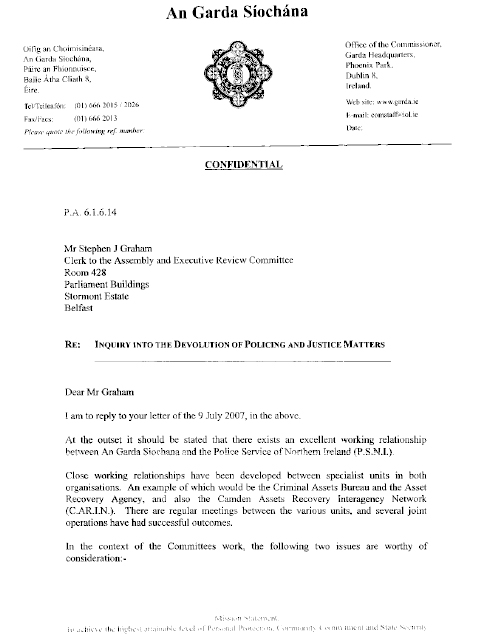
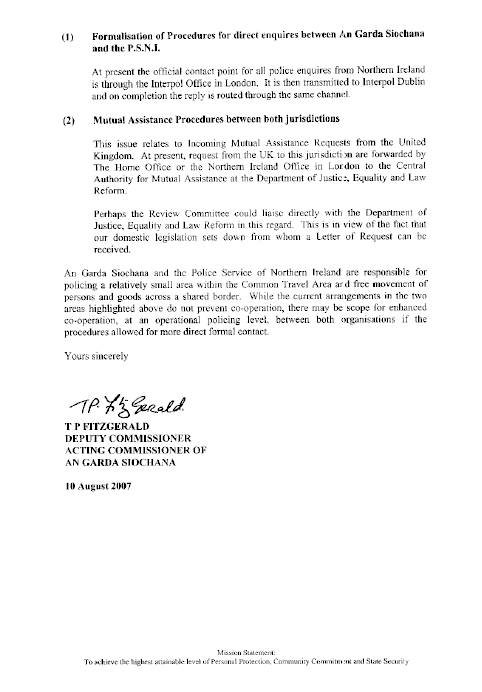
HM Revenue and Customs
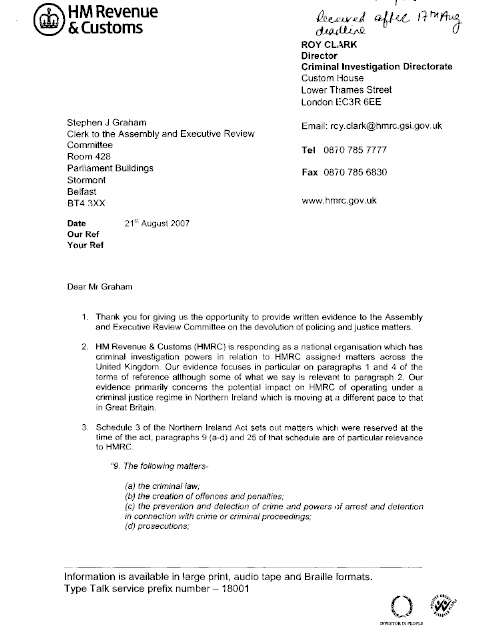
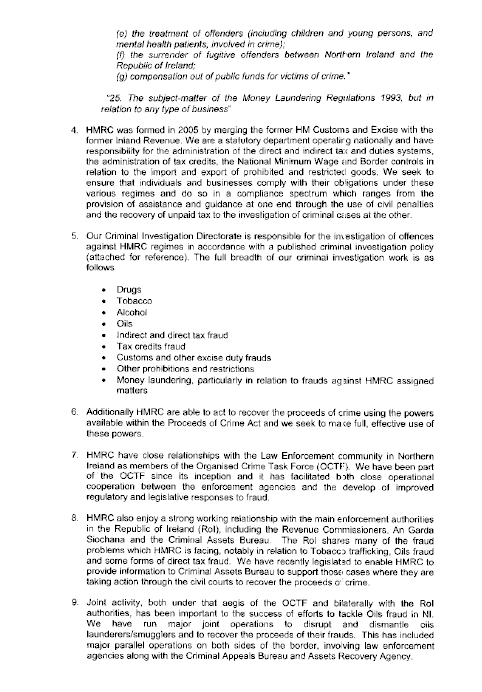
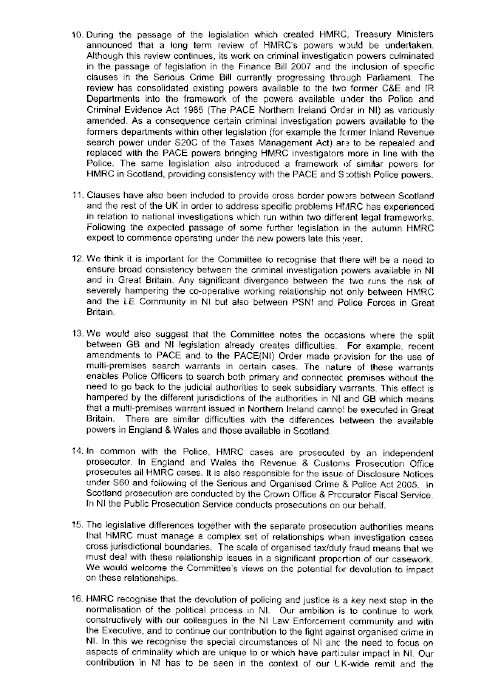
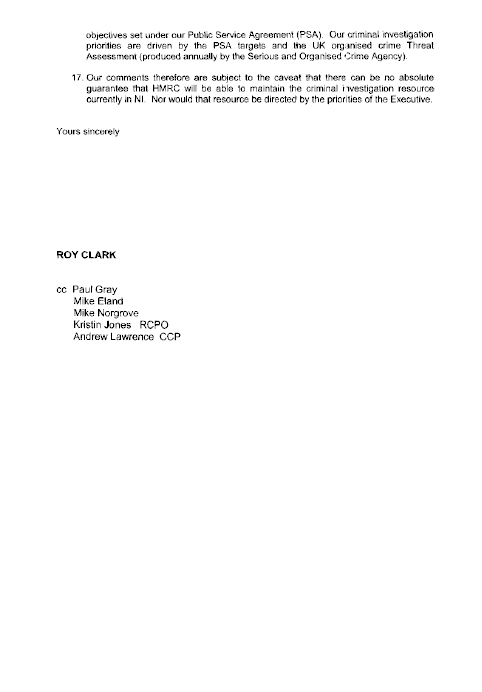
Include Youth

Written Submission to the Northern Ireland Assembly and Executive Review Committee Inquiry into the Devolution of Policing and Justice Matters
Table of Contents
Written Submission
Recommendations
Written Submission to the Northern Ireland Assembly and Executive Review Committee Inquiry into the Devolution of Policing and Justice Matters
August 2007
Introduction
1. Include Youth promotes best practice with young people in need or at risk. We achieve this through the development and promotion of resources, the provision of training, information and support of practitioners and organisations. We also undertake activities aimed at influencing public policy and public awareness - locally and nationally.
2. Include Youth promotes the development of positive choices and opportunities for vulnerable and challenging young people in the community, residential care or custody. Include Youth promotes the use of community alternatives to care and custody for children and young people.
3. Amongst the young people at risk with whom, and on whose behalf, Include Youth works are young people from socially disadvantaged areas, those who have been truanting, suspended or expelled from school, those from a care background, young people who have committed or are at risk of committing crime, misusing drugs or alcohol, undertaking unsafe sexual behaviour or other harmful activities, or of being harmed themselves.
4. Include Youth runs the Young Voices project, which is a participation project for young people who have had experience of the criminal justice system, with the aim of supporting these young people to become involved in decision-making processes which impact upon their lives. Currently the Young Voices project supports young people in two groups – one drawing its members from the Greater Belfast area, and the second based in the Juvenile Justice Centre, Bangor.
5. In addition, Include Youth runs the YOYO Practitioners Forum, which draws together professionals from a range of statutory, voluntary and community organisations working directly with young people in need or at risk, and meets on a quarterly basis.
General Comments
6. Include Youth very much welcomes the opportunity to make written submissions to the Inquiry into the Devolution of Policing and Justice Matters. Include Youth has a considerable track record of over 28 years working closely with all the relevant systems which engage with children at risk and in need. We have a sound understanding of child welfare, education and youth justice law, policy, practice and service delivery in Northern Ireland. We have a dedicated policy / advocacy role where we work to address all relevant issues concerning children and young people in conflict with the law. This work is informed by our work with young people, with practitioners as well as relevant human rights instruments and best practice evidence. As an organisation working to make children’s rights a reality in the most challenging of circumstances Include Youth is committed to working in partnership with all stakeholders in all settings.
7. Include Youth wishes to outline a number of general points in relation to the terms of reference. However, our submission focuses mainly on policing and justice matters and their impact on children and young people. We believe this Inquiry provides the Committee members with the opportunity to engage with the debate concerning children and young people at risk, particularly those in conflict with the law, in a positive and progressive way. This engagement should have significant positive impact on the lives of children, their families, the communities within which they live, together with the wider society.
Include Youth’s Vision for Youth Justice
8. Include Youth is currently working on producing a Vision for Youth Justice in Northern Ireland. Our intention is to provide a Framework for the development of a system for dealing with children in conflict with the law that is practical, realistic, achievable and children’s rights compliant. This Framework will focus on both ‘early intervention’ and the ‘formal youth justice system’. We intend to finalise this document early in the autumn and are keen to share it with members of the Committee. We believe it will be of significant assistance to members in their important deliberations regarding the devolution of policing and justice, especially where these issues relate to children and young people. However, we include below some initial findings from our work.
Terms of Reference
1. To identify those policing and justice matters which are currently reserved matters under Schedule 3 of the Northern Ireland Act 1998 (the 1998 Act);
9. We recognise that this is a broad and complex area which is demonstrated by the wide-ranging findings of previous reviews (e.g. Criminal Justice Review and the Patten Commission) and resulting legislation and reforms.
10. For the purposes of this submission, Include Youth will primarily address the reserved matters listed at Section 9, Schedule 3 of the Northern Ireland Act 1998 in respect of how these impact upon children and young people.
11. One practical issue requiring clarification concerns where responsibility lies for the treatment in the community of children who offend (i.e. supervision of court ordered community sentences). At present there exists duplication of the roles of the Youth Justice Agency and Probation Board for Northern Ireland. As a matter of urgency Include Youth recommends the Committee seeks to resolve confusion over role of Youth Justice Agency and Probation Board for Northern Ireland regarding treatment in the community of children who offend.
2. To consider which of these matters should be devolved and the extent to which they should be devolved
12. Include Youth appreciates that devolving powers in respect of justice and policing matters is controversial and divisive. It will be essential to ensure that agreed measures will secure confidence of all sections of society. We welcome the Inquiry as an important step towards devolution of powers, as we believe that local democratic control brings crucial decision making closer to those directly affected by policy decisions and interventions. Within this context of democracy and devolution, it is imperative that proposed models of devolution are measured against unambiguous human rights criteria, and comply with international human rights and children’s rights standards.
13. Include Youth believes that youth justice should be devolved as soon as possible. Should the decision be taken to phase-in devolution of particular justice and policing powers, Include Youth strongly recommends that youth justice is processed in the first phase. In particular, we refer to the Youth Justice Agency of Northern Ireland (YJA) and its’ supporting NIO functions. Include Youth works closely with the YJA and in our view, there is nothing within its organisational structure to prevent early devolution. In our opinion the agency is professionally and ethically closer to (devolved) childcare systems than to any part of the criminal justice system. We believe that current administrative partnership arrangements with such bodies as the Public Prosecution Service or Northern Ireland Court Service could be maintained effectively should youth justice be devolved before other justice functions.
14. The majority of YJA staff are qualified as social workers, youth workers or teachers, and work from a child-centred value base. Moreover, the YJA is represented on a range of regional and sub-regional multi-agency forums that address issues relating to children at risk or in need. This recognises that children in conflict with the law are often also at risk in other contexts. As recent debates have highlighted[1], responses to young people in conflict with the law cannot be considered without recognising the broader circumstances of their lives; in particular, their social and economic situation, educational experiences and attainments, family life and alternative care, physical and mental health. Internationally it is recognised that children and young people at risk of committing crime or participating in anti-social behaviour are often those who leave school early, have a disability or special needs, live in poverty, have truanted or been excluded from school, have spent time in residential care or have experienced poor parenting.[2]
15. We recommend that the Committee requests access to as yet unpublished research into these issues. The research was commissioned by DHSSPS and NIO in 2005, entitled Pathways into Secure Care and was conducted by Independent Research Solutions.
16. Include Youth considers a holistic approach must be adopted in respect of all children, including those in conflict with the law, to ensure that the numerous and diverse problems they experience in everyday life can be identified, responded to and resolved in the best interests of the child. Central to this will be proper integration of policy, legislation, planning and delivery of services for all children and young people, and an integrated, multi-service approach by government which does not fragment and compartmentalize the lives of children into pre-ordained ‘silos’. Include Youth recommends that the early devolution of youth justice, along with other devolved children’s issues, should be set within the framework of the United Nations Convention on the Rights of the Child, and other international standards (including the Beijing Rules[3], Riyadh Guidelines[4], Tokyo Rules,[5] and the UN Rules for the Protection of Juveniles Deprived of their Liberty). It should also take into consideration all relevant recommendations of the United Nations Committee on the Rights of the Child.
3. To identify the preferred ministerial model and procedures for filling the ministerial post/posts for the new policing and justice department;
17. Include Youth is not convinced that placing youth justice within a new department of criminal justice and / or policing is appropriate or in the best interests of children, their families or the communities within which they live. Include Youth recommends that all issues relating to children in conflict with the law would be best located and progressed within an over-arching Department for Children and Young People, with its own Minister/Ministers and developed along a children’s rights - based model. Such a department should adopt an integrated, coherent multi-agency approach dealing with all aspects of children’s lives, including education, mental health, conflict with the law, public health, children requiring alternative care arrangements, anti-social behaviour, age appropriate play space etc. It is our strong view that placing youth justice within the criminal justice framework is ill-advised. It would continue to criminalise and further marginalise children already at risk who experience a range of complex issues and unmet needs as discussed above.
18. Additionally we strongly contend that a shift in emphasis away from criminal justice diminishes public protection. This has not happened in European States where the age of criminal responsibility is higher and the evidence suggests that a social justice emphasis enhances the safety of all citizens. Proper integration of children’s services means that early intervention, family support and preventative services will be better co-ordinated, as will provisions for those children who are deemed in need or at risk in the contexts of education, mental health or care. The Northern Ireland Children’s Strategy: Our Children and Young People – Our Pledge[6] outlines how services will be developed to meet six intended outcomes for all children and young people. These are:
- being healthy
- enjoying, learning and achieving
- living in safety and with stability
- experiencing economic and environmental well-being
- contributing positively to community and society
- living in a society which respects their rights
19. Include Youth asserts that, as these outcomes apply to all children and young people, including those in conflict with the law, they should provide the framework within which mainstream service provision can fulfil these functions.
20. We recommend that current powers within the Office of First Minister and Deputy First Minister should be extended in respect of their oversight function vis-à-vis other government departments obligations and duty of care to children and young people who fall within their jurisdiction, particularly in relation to the Outcomes identified in the Children’s Strategy.
21. With regards to the ministerial model, our preference is to locate all matters pertaining to children and young people within one department. We accept that this may be a long-term objective achieved incrementally. Nevertheless Include Youth believes that the speedy devolution of youth justice will be an important step towards a discrete department better serving the children and young people in NI and their communities. Include Youth would welcome the opportunity to provide further information and evidence to the Committee.
22. In the absence of a discrete Department for Children and Young People, how do we deal with current practicalities? Include Youth believes that structures for the devolution of youth justice - of the Youth Justice Agency - should emphasise the best practice approaches to children in conflict with the law outlined above, including redress to criminal justice systems as a matter of last resort. Include Youth respectfully suggests that the Committee recommends to the NI Assembly that youth justice be decoupled from the adult criminal justice process and located within a Ministry more geared towards the rights, care and welfare of children and young people.
23. In order to determine exactly where to place this brief, for example, within Department of Education, Department of Health Social Services and Public Safety, or OFMDFM – each of which currently has a clear brief in respect of certain aspect of children’s lives – Include Youth recommends that the Committee examines international best practice, including societies emerging from conflict. We believe it is imperative that to inform decisions regarding the devolution of youth justice, members of the Committee and the NI Assembly should have an understanding of the complex and often emotive nature of the key issues in the area of youth justice, alongside evidence of what works.
24. In the broader context of determining a ministerial model for the devolution of justice and policing more generally, we endorse research conducted by colleagues in the Committee on the Administration of Justice (CAJ) in 2006 entitled: ‘Change and Devolution of Criminal Justice and Policing in Northern Ireland: International Lessons’. This work examines the (i) single department/minister model, (ii) two or more departmental model or (iii) shared ministry within a single department.
25. As stated above, whichever model is agreed it must ensure compliance with international human rights and children’s rights standards. Crucial to this will be a range of safeguards, many of which have been outlined in some detail in the CAJ research.
4. To identify what preparations need to be made by the Northern Ireland Assembly to facilitate the devolution of policing and justice matters and what preparations have been made
26. Include Youth recommends that in preparation for the devolution of matters pertaining to youth justice, the NI Assembly should engage in a programme of information gathering, outreach and engagement with children and young people, families and communities. It is imperative that a thorough understanding is reached as to why children and young people become involved in offending behaviour which can often have devastating consequences on victims of crime, families, wider communities, not to mention the individual child or young person involved.
27. Whilst we appreciate that elected members spend considerable time speaking to and advocating on behalf of their constituents, we are also aware that many children and young people in conflict with law have had little or no direct experience of their elected representatives.
28. Include Youth’s Young Voices participation project recently underwent a very successful independent Evaluation[7], a copy of which is enclosed for your information, together with a Summary and Recommendations Document. The Evaluation demonstrates that it is possible to engage and enable the active participation of young people at risk, particularly those with experience of the criminal justice system, in public consultation initiatives, with very positive results.
29. Our experience of managing this process is that young people in conflict with the law have considerable, pertinent experience which they are eager to share when they feel listened to, valued and treated with respect. As one Young Voices participant stated: ‘People never listen to me – that’s what makes this different is that people in here listed to me and take on my views and asked me about why I did the things I did’ (page 24).
30. We believe that elected members would benefit significantly through direct engagement with young people in conflict with the law, as very often the prevalent media images of young people in securing eye-catching headlines. Media representation of the lives of children and young people serves to undermine them and their communities. Include Youth would be very keen to work with Committee members, and indeed more widely with colleagues in the Assembly, to help facilitate such a process of engagement through our Young Voices project.
31. ‘Before contact with the likes of Young Voices, we tapped into some groups in schools, community based groups etc. and the make up of these groups would vary – the Young Voices model gives us the opportunity to engage with the most hard to reach young people.’ Agency Representative, page 26
32. Additionally as mentioned above we believe that the Assembly will be assisted in their deliberations by accessing the international and local evidence concerning effective ways of preventing offending by children and young people and structuring services.
5. To assess whether the Assembly is likely to make a request under section 4 (2A) of the 1998 Act before 1 May 2008, as to which policing and justice matters should cease to be reserved matters
33. As stated, Include Youth identifies no barriers to the speedy devolution of youth justice once and appropriate and effective ministerial structure is agreed to ensure the best outcomes for children and young people, their families and communities.
Conclusion
34. Include Youth intends the above as a constructive submission, and we are keen to testify to the Committee should an oral submission be deemed helpful. Include Youth is committed to working in partnership with our colleagues in the NI Assembly. We request that we are kept fully informed of progress in relation to the Inquiry into the devolution of policing and justice matters, and look forward to the issues raised and recommendations made in this response being addressed and progressed.
Written Submission to the Northern Ireland Assembly and Executive Review Committee Inquiry into the Devolution of Policing and Justice Matters
Recommendations
1. Include Youth recommends that proposed models of devolution are measured against unambiguous human rights criteria, and comply with international human rights and children’s rights standards.
2. Include Youth believes that youth justice should be devolved as soon as possible.
3. Include Youth recommends that all issues relating to children in conflict with the law would be best located and progressed within an over-arching Department for Children and Young People, with its own Minister/Ministers and developed along a children’s rights - based model.
4. In the absence of the immediate establishment of a Department for Children and Young People, Include Youth respectfully suggests that the Committee recommends to the NI Assembly that youth justice be decoupled from the adult criminal justice process and located within a Ministry more geared towards the rights, care and welfare of children and young people.
5. Include Youth considers a holistic approach must be adopted in respect of all children, including those in conflict with the law, to ensure that the numerous and diverse problems they experience in everyday life can be identified, responded to and resolved in the best interests of the child. Central to this will be proper integration of policy, legislation, planning and delivery of services for all children and young people, and an integrated, multi-service approach by government which does not fragment and compartmentalize the lives of children into pre-ordained ‘silos’.
6. We recommend that current powers within the Office of First Minister and Deputy First Minister should be extended in respect of their oversight function vis-à-vis other government departments obligations and duty of care to children and young people who fall within their jurisdiction, particularly in relation to the Outcomes identified in the Children’s Strategy.
7. Include Youth recommends that in preparation for the devolution of matters pertaining to youth justice, the NI Assembly should engage in a programme of information gathering, outreach and engagement with children and young people, families and communities.
8. As a matter of urgency Include Youth recommends the Committee seeks to resolve confusion over role of Youth Justice Agency and Probation Board for Northern Ireland regarding treatment in the community of children who offend.
9. We recommend that the Committee requests access to as yet unpublished research into youth justice issues. The research was commissioned by DHSSPS and NIO in 2005, entitled Pathways into Secure Care and was conducted by Independent Research Solutions.
[1] Davies, Z. and Mc Mahon, W. (Eds) (2007) Debating Youth Justice: from punishment to problem solving? Centre for Crime and Justice Studies
[2] Farrington, D.P. (2001) Risk-focused Prevention and Integrated Approaches in Pease, K. (Ed.) Reducing Offending. London: Home Office; and Youth Justice Board (2001) Risk and Protective Factors Associated with Youth Crime and Effective Interventions to Prevent It. Research Note No. 5, Chapter 4. Reducing Levels of Risk – What Works. London: Youth Justice Board
[3] United Nations Standard Minimum Rules for the Administration of Juvenile Justice
[4] United Nations Guidelines for the Prevention of Juvenile Delinquency
[5] United Nations Standard Minimum Rules for Non-Custodial Measures 1990
[6] OFMDFM (2006) Our Children and Young People – Our Pledge. A ten year strategy for children and young people in Northern Ireland 2006-2016, OFMDFM
[7] Green, R. (2007) Evaluation of Young Voices Project July 2004 – March 2007: ‘A Genuine and Authentic Voice for Children and Young People at Risk’ , Include Youth
Legal Services Commission
S.J. Graham Esq
Clerk to the Assembly and Executive Review Committee
Room 428
Parliament Buildings
Stormont
BELFAST
BT4 3XX
9 August 2007
Dear
Inquiry into the Devolution of Policing and Justice Matters
Introduction
I am replying to your letter of 9 July to Sir Anthony Holland in his capacity as Chairman of the Northern Ireland Legal Services Commission (the Commission). Sir Anthony’s term of office came to an end on 31 July 2007 and I have been appointed by the Lord Chancellor as the Interim Chairman until the substantive appointment of Chairman is made.
The Commission
The Commission was created on 1 November 2003 through the commencement of the Access to Justice (Northern Ireland) Order 2003. It has assumed responsibility for the provision of Legal Aid in Northern Ireland from the Legal Aid Department of the Law Society of Northern Ireland.
The Commission is a non departmental public body sponsored by the Northern Ireland Court Service (NICtS) which is answerable to the Lord Chancellor. The Northern Ireland Court Service funds-
1. the running costs of the Commission through a grant in aid, and
2. the expenditure of the Commission on criminal and civil legal aid through a grant.
Under the present arrangements-
1. the responsibility for policy development for criminal legal aid rests with the Northern Ireland Court Service, although the NICtS works closely with the Commission in developing proposals and administrative arrangements for criminal legal aid; and
2. the Commission has responsibility for administration and reform of civil legal aid and works closely with the NICtS as the sponsoring department in developing civil legal aid policy.
Devolution
The Commission would support the devolution of responsibility for policing and justice issues on a basis that can command respect and support across the community.
It believes that it is important that Northern Ireland has the discretion to develop the approaches to these policing and justice matters that are appropriate to its needs, drawing as is relevant on what happens in other jurisdictions.
If devolution of policing and justice issues is agreed, decisions in respect of legal aid will have to be made about-
1. whether the policy roles currently carried out by the NI Court Service in relation to legal aid should remain with the Court Service or whether these roles should pass to the new Department of Justice;
2. whether responsibility for all aspects of civil and criminal legal aid should be carried by one body, either the Commission or the Department, rather than being split between them; and
3. whether the NI Legal Services Commission should remain as a public body and be accountable to the new Department of Justice, or whether it should cease to be a public body with its responsibilities being taken over by the Department.
The Commission has, of course, a strong vested interest in the outcome and its preferences have to be viewed in that context. However, it offers the following points for consideration-
1. the devolution of responsibility for the core policing and justice responsibilities will be a very testing process for all involved and it might be sensible to minimise the changes on other related fronts;
2. it has been deemed appropriate to keep legal aid at arms length from government in both England and Wales and in Scotland and it would seem prudent to maintain that position in Northern Ireland;
3. the Commission has faced, and continues to face, serious difficulties in taking over responsibilities from the Law Society, improving the delivery of present services, and planning the reform of legal aid; ideally, it should be given the space to continue this work without fundamental disruption; and
4. at some point in time, responsibility for policy and execution in respect of civil and criminal legal aid must be brought together- at present the Commission has responsibility for paying out large sums of money for criminal legal aid without any control over who gets aid and how much; it might be sensible to resolve this at devolution rather than later.
Conclusion
The Commission recognises that, in the overall context of what your committee is considering, legal aid issues may not be a high priority.
However, we think that getting the legal aid arrangements right under devolution is important since-
1. legal aid consumes a lot of resources - the allocated running costs for the Commission in 2007/8 are approximately £7m while £65m is allocated to legal aid;
2. Ministers in a devolved executive will want to be confident that, on the devolution of responsibility,
a. appropriate funding is made available to meet existing and anticipated commitments;
b. legal aid merits this level of funding against all the other competing demands for resources, and
c. the arrangements in place are delivering value for money; and
3. the availability of legal aid is crucial to ensuring that people in need receive the help they need to secure access to justice. .
The Commission would be happy to provide the Committee with any further information in relation to criminal and civil legal aid that it might require to assist with its deliberations.
I hope that this submission is of assistance to the Committee.
Yours sincerely,
R B Spence
Interim Chairman
Legal Service Commission
S J Graham Esq
Clerk to the Assembly and Executive Review Committee
Room 428
Parliament Buildings
Stormont
BELFAST BT4 3XX
18 January 2008
Inquiry into the Devolution of Policing and Justice Matters
I am writing further to Ronnie Spence’s letter to you of 9 August 2007 about the implications for the Northern Ireland Legal Services Commission (the Commission) of the proposed devolution of policing and justice matters.
The Commission’s views remain as set out in the letter of 9 August. However, following a meeting with the Chair of the Assembly and Executive Review Committee on 10 January 2008, I thought that it might be helpful to draw the Committee’s attention to an additional point.
We understand that consideration is being given to the position of the Northern Ireland Court Service after devolution and, in particular, to whether it might be an agency of a Ministry of Justice or assume more of an arm’s length relationship with the Executive. This is not an issue on which the Commission wishes to express a view. However, it does have implications for the Commission, itself an “arm’s length” NDPB with the Northern Ireland Court Service as its sponsor department.
In a post devolution scenario we believe that consideration should be given to the Commission having a direct relationship with a Ministry of Justice as its sponsor department rather than with another arm’s length body. There are a number of factors that might support such a view:
- Short and clear lines of accountability.
- Easier to ensure that account is taken of the impact on legal aid (including its cost) when legislative and policy proposals are considered in the justice and other spheres.
- The major funding issues associated with legal aid will be more efficiently addressed if the Commission has a direct link with the responsible department.
- Better scope for developing shared back office services with other “justice” bodies.
On the other hand, the Northern Ireland Court Service has built up considerable expertise on legal aid matters which it would be detrimental to lose. If a decision were taken to shift sponsorship of the Commission from the Northern Ireland Court Service to a Ministry of Justice, then there would be a case for transferring the part of the Northern Ireland Court Service that sponsors the Commission into the Ministry.
I hope that the Committee finds these points helpful in its deliberations.
Yours sincerely
Jim Daniell
Chairman
Lord Chief Justice, Northern Ireland
Sent by e-mail
30 July 2007
Inquiry into the Devolution of Policing and Justice Matters
1. Thank you for your letter of 9 July 2007 to the Lord Chief Justice, Sir Brian Kerr. He has asked me to reply on his behalf. The Lord Chief Justice is grateful for the opportunity to comment on the devolution of those justice matters which impact on the judiciary. In providing his views he has asked me to emphasise that he recognises that, ordinarily, policy decisions are a matter for Government, however, in this case there will be aspects of change which will have such an effect on the judiciary that it is important for his views to feature large in the Committee and Assembly’s thinking. He will, of course, make himself available to meet the Committee if that would be helpful.
2. I should perhaps say at the outset that the Lord Chief Justice does not regard a number of the issues covered by the Committee’s terms of reference to be matters on which he should comment. There are others on which he has little to contribute. For instance on timing he thinks that all parties involved would welcome reasonable notice to enable preparation so that change is made as smoothly and efficiently as possible.
3. The Lord Chief Justice would like to comment on three main areas; safeguarding independence, judicial appointments and certain other matters which will be devolved and, related to the first point, the model for the Northern Ireland Court Service.
Safeguarding independence
4. The Lord Chief Justice became Head of the Judiciary in Northern Ireland, as well as President of the Courts, in April 2006 under Section 12(1) of the Justice (NI) Act 2002 as amended by Section 11 of the Constitutional Reform Act 2005. The Lord Chief Justice wants to emphasise the importance of judicial independence as a constitutional principle and the need for judges to be outside political influence. The United Nations Basic Principles on the Independence of the Judiciary[1] state:
“1. The independence of the judiciary shall be guaranteed by the State and enshrined in the Constitution or the law of the country. It is the duty of all governmental and other institutions to respect and observe the independence of the judiciary …
4. There shall not be any inappropriate or unwarranted interference with the judicial process …”
5. This principle was recognised in the Justice (Northern Ireland) Act 2002 and the Constitutional Reform Act 2005 so that:
“3. Guarantee of continued judicial independence
(1) The Lord Chancellor, other Ministers of the Crown and all with responsibility for matters relating to the judiciary or otherwise to the administration of justice must uphold the continued independence of the judiciary.
(3) A person is not subject to the duty imposed by subsection (1) if he is subject to the duty imposed by section 1(1) of the Justice (Northern Ireland) Act 2002 (c. 26).
(4) The following particular duties are imposed for the purpose of upholding that independence.
(5) The Lord Chancellor and other Ministers of the Crown must not seek to influence particular judicial decisions through any special access to the judiciary.
(6) The Lord Chancellor must have regard to-
(a) the need to defend that independence;
(b) the need for the judiciary to have the support necessary to enable them to exercise their functions;
(c) the need for the public interest in regard to matters relating to the judiciary or otherwise to the administration of justice to be properly represented in decisions affecting those matters.
4. Guarantee of continued judicial independence: Northern Ireland
“….1 Guarantee of continued judicial independence
(1) The following persons must uphold the continued independence of the judiciary –
(a) the First Minister,
(b) the deputy First Minister,
(c) Northern Ireland Ministers, and
(d) all with responsibility for matters relating to the judiciary or otherwise to the administration of justice, where that responsibility is to be discharged only in or as regards Northern Ireland.
(2) The following particular duty is imposed for the purpose of upholding that independence.
(3) The First Minister, the deputy First Minister and Northern Ireland Ministers must not seek to influence particular judicial decisions through any special access to the judiciary.”
6. Section 6 of the Constitutional Reform Act 2005 also provides that the Lord Chief Justice may make representations to Parliament and the Northern Ireland Assembly. The provision in respect of the Assembly is as follows:
“(1) The Lord Chief Justice of Northern Ireland may lay before the Northern Ireland Assembly written representations on matters within subsection (2) that appear to him to be matters of importance relating to the judiciary, or otherwise to the administration of justice, in Northern Ireland.
(2) The matters are-
(a) excepted or reserved matters to which a Bill for an Act of the Northern Ireland Assembly relates;
(b) transferred matters within the legislative competence of the Northern Ireland Assembly, unless they are matters to which a Bill for an Act of Parliament relates.
(3) In subsection (2) references to excepted, reserved and transferred matters have the meaning given by section 4(1) of the Northern Ireland Act 1998.”
7. This provision will enable the Lord Chief Justice to make written representations on certain matters that relate to the judiciary or the administration of justice in Northern Ireland. The Lord Chief Justice sees this as an important provision given his role as Head of the Judiciary in Northern Ireland.
8. He regards it as essential that Government Departments[2] generally, but especially the new Ministry of Justice (whatever its title), should consult the judiciary (through the Lord Chief Justice’s Office) on any proposals which will have an impact, either directly or indirectly, on the judiciary. The Lord Chief Justice thinks it essential for this message to be emphasised at the outset for the new Ministry.
9. The Lord Chief Justice also anticipates that he and the new Minister(s) for Justice will need to have an effective working relationship which would be supported by periodic meetings. The different roles and responsibilities need to be recognised, and clearly he cannot engage on individual cases, but he is willing to develop such a relationship.
Appointments and other significant issues being transferred
10. Under the Justice (Northern Ireland) Act 2002, as amended, the Lord Chancellor remains responsible for certain issues impacting on the judiciary in Northern Ireland (and England and Wales). These include the determination of judges’ remuneration and other matters concerning terms and conditions of service. Some of his other responsibilities, however, will transfer to the First Minister and deputy First Minister or the Minister of Justice. The principal ones of these which the Lord Chief Justice would like to highlight are judicial appointments, the duty to ensure that there is an efficient and effective system to support the carrying on of the business of the courts in Northern Ireland and that appropriate services are provided for those courts (Section 68A of the Judicature (NI) Act 1978)[3].
11. At present, in most cases, the Northern Ireland Judicial Appointments Commission makes recommendations for appointments to judicial offices listed at Schedule 1 to the Justice (Northern Ireland) Act 2002, as amended, to the Lord Chancellor. On devolution of justice these recommendations will be made to the First Minister and deputy First Minister (with some variation of more senior appointments). They must act jointly in considering them. The Commission is also required to give the First Minister and deputy First Minister advice on the procedure to be adopted for appointments of the Lord Chief Justice or a Lord Justice.
12. The Chairman of the Judicial Appointments Commission is the Lord Chief Justice. The Commission itself comprises five independent members, two from the legal professions and five members of the judiciary in addition to the Chairman. It has a statutory duty to make appointments on merit alone, but these should, so far as is reasonably practical, be such that those holding listed judicial offices are reflective of the community in Northern Ireland. The Commission is also required to engage in a programme of action designed to secure, so far as is reasonably practical to do so, that appointments are listed to judicial officers as such that those holding such offices are reflective of the community.
13. The Lord Chief Justice thinks that it would be important for there to be a protocol between the Commission and the Office of the First Minister and deputy First Minister about judicial appointments. This will include means of communication, indicative timescales for schemes etc. The Commission has enjoyed a very constructive working relationship with the Lord Chancellor to date and the Lord Chief Justice sees no reason to doubt that this will be the case with the First Minister and deputy First Minister as well.
Structural arrangements for the Court Service on devolution
14. The Court Service staff, under Section 69 of the Judicature (NI) Act 1978, are a separate Civil Service coming under the Lord Chancellor and Secretary of State for Justice.
15. The Lord Chief Justice thinks that it is important to consider the future of the Northern Ireland Court Service staff in the context of the role which they provide to the judiciary. In other words, he thinks that the arrangements for the Court Service should reflect the fact that they are providing support to an independent judiciary in the administration of justice by the judiciary. Indeed, the importance of this relationship is illustrated by the fact that the Court Service was set up as a separate Service in the first place under the Lord Chancellor who was then head of the judiciary. The Lord Chief Justice appreciates that there are different models that could be adopted for the Court Service in the future. He believes, having considered the different models that exist elsewhere, that the appropriate approach here to preserve the independence of the judiciary from the Executive is to establish a body at arms length from Government under a Board chaired by the Lord Chief Justice. The Board would also have representation from the Ministry of Justice, as well as judicial, legal and independent input. This arrangement is often referred to as a non-ministerial department. While there is a relationship, therefore, with the ministry (and there would need to be clear accountability mechanisms) the purpose of such a structure is to ensure appropriate distance from direct ministerial control so as to preserve the appropriate constitutional position vis a vis the judiciary.
16. One of the strengths of such a regime is that there is a clear mechanism for ensuring that the necessary resources are provided for the courts in line with the statutory responsibility on the Minister of Justice to secure an efficient and effective system to support the carrying on of the business. A concern is that if the funding is not provided by this means then, if the budget is part of the justice budget as a whole, it would be subject to pressures elsewhere which might impact adversely on the operation of the courts and independence.
17. It has also been argued that a Board structure reinforces the independence of the judiciary as well as improving the relationship between the courts staff and the Board and, therefore, assists in the improvement of the delivery of civil and criminal justice.
18. The non-ministerial department model is currently in place in the Republic of Ireland and is proposed for Scotland (as well as being evident elsewhere in Europe). Further details on these models can be provided if required. It is common to both that legislation is, or will be, required to establish this arrangement as well as the governing Board.
19. Thought will clearly need to be given to the precise approach taken to the Court Service under devolution but the Lord Chief Justice thinks that it is essential to take into account the need for the judiciary to be independent of the Executive, for there to be an efficient and effective system in place for administering the courts, and for there to be recognition of the approaches being taken in other jurisdictions.
Conclusion
20. The Lord Chief Justice wants to emphasise the importance of preserving the independence of the judiciary; his hope of a constructive working relationship with the Minister(s) for Justice; the need for consultation on issues impacting on the judiciary; the need for a protocol between the JAC and the FM/dFM; and his view that the Court Service should become a non-ministerial department under a Board to safeguard independence.
21. The Lord Chief Justice will make himself available to give evidence to the Committee if it would find that helpful.
Simon Rogers
Principal Private Secretary to the Lord Chief Justice
Stephen Graham Esq
Clerk to the Assembly and
Executive Review Committee
Room 428, Parliament Buildings
Stormont Estate
BELFAST BT4 3XX
[1] General Assembly resolutions 40/32 of 29 November 1985 and 40/146 of 13 December 1985
[2] And Government sponsored bodies as appropriate.
[3] The UN Basic Principles state: “7. It is the duty of each Member State to provide adequate resources to enable the judiciary to properly perform its functions.”
 Methodist Church in Ireland
Methodist Church in Ireland
Council on Social Responsibility
Northern Executive
Rev. Dr. Frederick L. Munce MBE
Stephen J. Graham (Committee Clerk)
Northern Ireland Assembly and Executive Review Committee
Room 428, Parliament Buildings,
Belfast
BT4 3XX
17 August 2007
Dear Mr. Graham,
Inquiry into the devolution of policing and justice matters
General Introduction
1. The Council on Social Responsibility (CSR) is a department of the Methodist Church in Ireland that seeks on behalf of the Church to undertake informed study and analysis of a range of social, political, economic and constitutional issues. It attempts to consider these issues with insight, and to provide realistic and practical recommendations for action.
2. We welcome the opportunity to submit an initial response to the Northern Ireland Assembly and Executive Review Committee in relation to the transfer of policing and justice matters.
3. We request the Committee note that this initial submission is due to the short period of response time available from receipt of your letter (16 July 2007) until the final submission date (17 August 2007), and this during the summer season when many of those whom we normally consult are on holiday. It would also have been helpful to have sufficient time to consult fully the Northern Ireland (St. Andrew’s Agreement) Act 2006 and policing and justice matters under Schedule 3 of the Northern Ireland Act 1998. We will respond more fully when we have had the opportunity to consult with our members and interested parties.
4. We recognise and acknowledge the necessity for the devolving of police and justice matters to the Northern Ireland Assembly in the interests of democracy, transparency and accountability and that it should be as soon as possible, consistent with good governance, human rights compliance and be a workable, robust institution.
5. Clearly there are a number of reserved matters upon which the Church does not have a strong view or opinion. There are, however, reserved matters to which we now refer.
Political
6. The real political questions over transfer of responsibility of policing and justice powers surround time-scale and control mechanisms, i.e. what is the composition, power and nature of the Ministerial Department? Furthermore, should the present political situation in the Assembly for Northern Ireland break-down, how quickly does the Northern Ireland Office take over and to what extent should the Northern Ireland Office retain a watching brief?
One potential model could be that two separate ministers are appointed. One minister for policing and one for justice. They should probably head two departments, but it may be possible to integrate them. Clearly if this were the scenario, they would have to work together to a large degree.
Legal
7. The area of the workings of the legal profession and all matters relating to the Supreme Court are of interest. The Bain Report (page 112) on the Review of Legal Services in Northern Ireland presents a good overview on how legal services operate. Specifically however, we do have strong views on ensuring the independency of the judiciary and the maintaining of fairness and integrity in the legal processes. There could legitimately be a range of opinion as to how this may be achieved. We believe the legal profession through the Law Society and other bodies are well placed to submit their views directly to the Committee and we look forward to receiving details of their submission in due course.
Justice
8. The CSR is interested in exploring and investigating ways and means of instilling confidence in the whole community and thus supports the establishment of a Ministry of Justice. One obvious Doomsday scenario for most people is the possibility of a Minister for Justice who is partial, or who may not discharge properly the function of the office because of a party political slant. There must be safeguards and a constant watching brief to ensure integrity and fairness in this vital area. A question needs to be asked: what sanctions could be taken in a situation where republican (or loyalist) paramilitary racketeering, crime and gangsterism takes place and continues where there is say, a Sinn Fein (or Unionist with links to loyalist paramilitaries) Minister(s) for Justice? The CSR hope this situation would not occur and urges that confidence-building sanctions for such a scenario is put in place.
It is also important to state that we believe any Minister of Justice must not have the power to override the decisions of the Chief Constable of the day. This is imperative particularly as it is the role of the Northern Ireland Policing Board to provide the checks and balances for the PSNI.
Policing
9. We are intensely interested in encouraging good policing and practice. We believe the Northern Ireland Policing Board has been (and continues to prove) effective. Substantial progress has been made and this is to be welcomed. It is our fervent hope that such progress continues. If this is to happen there needs to be a development of trust. There is also the need for sensitivity as to whom the PSNI advise and report. Those to whom they may potentially report may have been former terrorists. We believe the proposed triple lock of government, assembly and executive is essential. Reassurances regarding the control, role, authority and responsibility of the PSNI and the Chief Constable should be clearly outlined, and any legislation affecting the PSNI should be in line with policing in the rest of the United Kingdom.
Victims
10. The Methodist Church through the CSR has a particular and caring pastoral commitment to victims and has been prominent in dealing with deep-rooted hurts experienced by many. Our publications, ‘Healing the Hurts of the Past’ and ‘Towards a Theology of Suffering and Pastoral Healing’ are worship liturgies and bible studies and are widely used by all Christian churches. A submission was made to the N.I. Affairs Committee on ‘Reconciliation – Ways of Dealing with Northern Ireland’s Past’ and pastoral concern in action has been suggested through ‘Methodist Memories’: memories, emotions, tales and healing. These documents may be accessed through www.irishmethodist.org and following the links. The N.I. Human Rights Commission, the Northern Ireland Office, the Christian Churches in Ireland, the political parties and other agencies have acknowledged the efforts of the CSR in relation to victims. Victim’s issues will continue to be central in the formulation of a strategy for the future.
Prosecution
11. Prosecutions, particularly for those offences carried out prior to the Good Friday Agreement may lead into a discussion on the need for a Truth Commission or some other body to be established to consider unsolved murders and crime. It is important that the questions be raised: Do we need this type of Commission or are further enquiries simply a drain on the Exchequer? What would be the likely outcomes of such a Commission?
On The Runs
If legislation such as that earlier proposed for ‘On The Runs’ is received and adopted, then the moral position is repugnant. The view would be that the offenders could be seen to be getting away with murder and crime without paying their due to society. Especially for victims, whose loved ones are dead, this would be very hard to take and to accept.
While it may be understood that this is not amnesty, it may be mere words. There would be a judicial process to go through but as the outcome would be decided in advance, it becomes increasingly difficult for the ordinary person on the street to see the difference, hence ‘violence and paramilitaries with all the perceived attendant crime wins again’. Will part of any renewed legislation also allow freedom from prosecution for members/former members of the security forces? None of this would be helpful or act as an incentive for truth recovery processes.
The matter of ‘OTR’s’ will need to be dealt with as in other conflict resolution situations. Theoretically and academically it may make good sense to bring closure in this way, but it would be very hard to take for so many, a high price to pay and this in itself will bring a corrosive element to any such resolution.
Clearly, the ‘OTR’ issue is very raw and an open wound for many victims. The appointment of a Victim’s Commissioner will be pivotal and a genuine process of engagement, persuasion, and listening to the hurts will be vital to the success of the Ministry of Justice.
Further issues arise: once free, do these people still operate on ‘license’ as with the early prisoner release scheme? If not, then we recommend they should be. Perhaps some form of probation process could be established. Could the International Monitoring Commission or some other agency have a role in monitoring the activities of former ‘OTR’S’?
We could reasonably expect the N.I. Human Rights Commission to have a major involvement in these processes.
Other unfinished, yet related, business; The Disappeared and the Exiles
The fate of those who are still missing – ‘The Disappeared’ - is very poignant. Will closure be possible and has every legal, financial, and political stone been turned? What can be said about the fate of those who have fled Northern Ireland – ‘The Exiles’ – because of paramilitary intimidation and their form of ‘justice’? Even though some of these people may be law-breakers or at least anti-social in their behaviour, where is their justice now?
It could be that the simpler and better option is that the whole difficult matter of ‘OTR’s’, The Disappeared, and The Exiles needs to be re-visited and for all party discussions to take place.
We look forward to hearing from you in due course.
Yours sincerely
Rev. Frederick L. Munce MBE DUniv
49 Olde Forge Manor (028) 90604200
BELFAST BT10 0HY 07773 656834
fredmunce@myself.com
Northern Ireland Affairs Committee
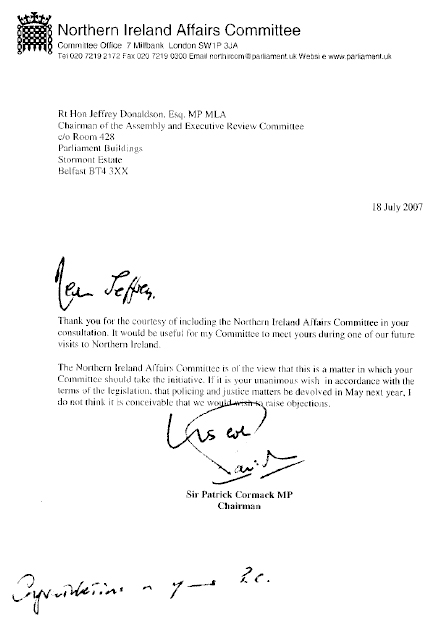
Northern Ireland Court Service
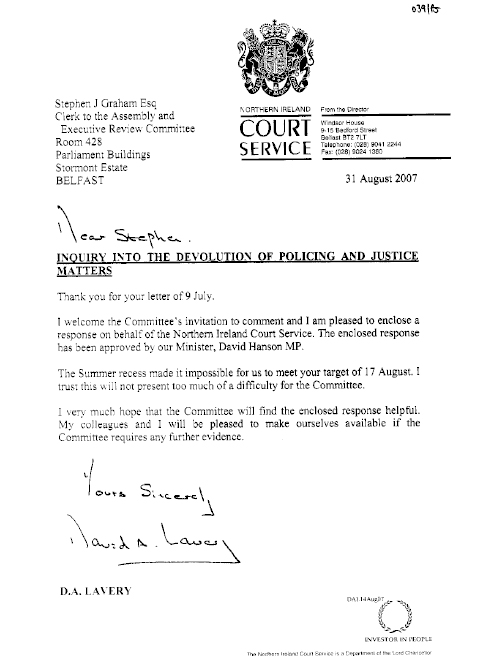
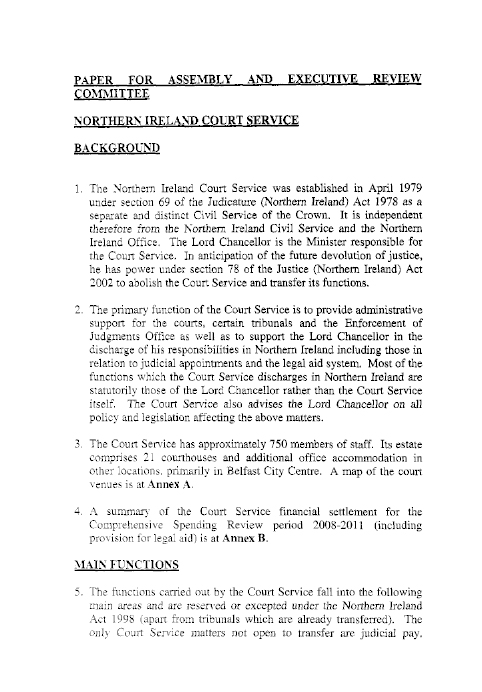
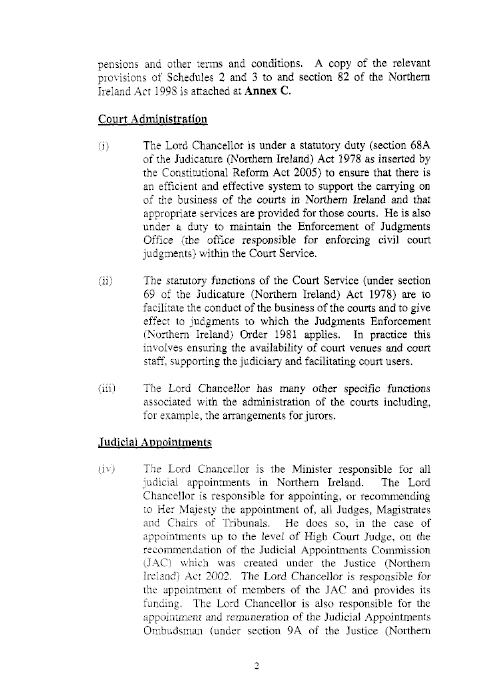
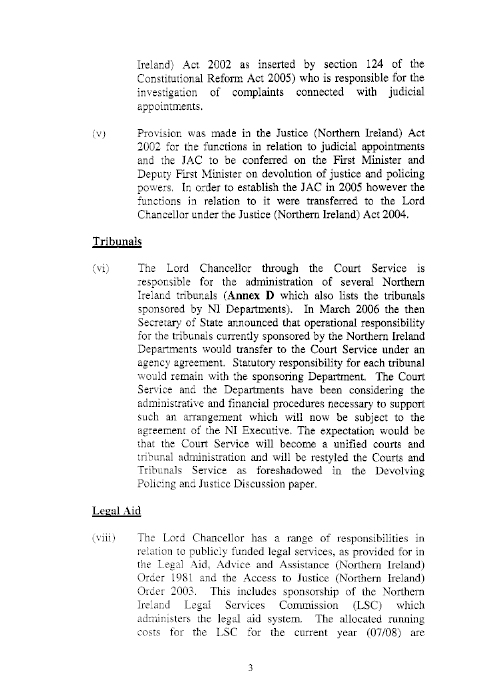
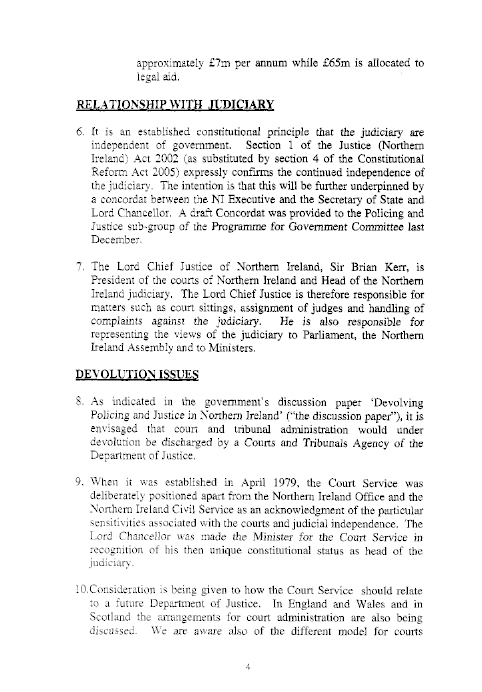
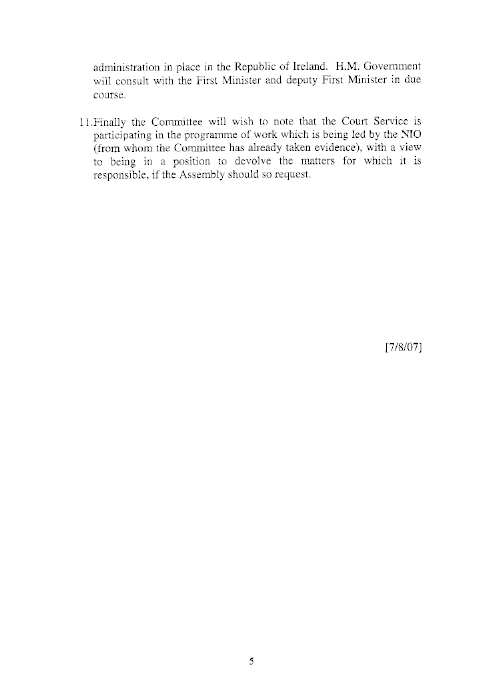
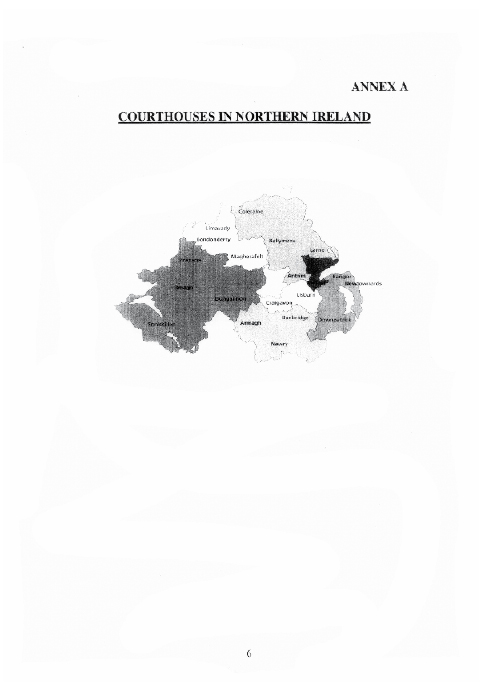
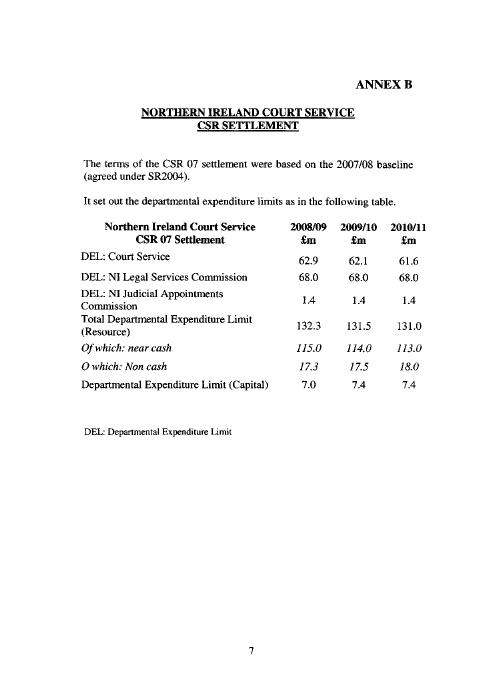
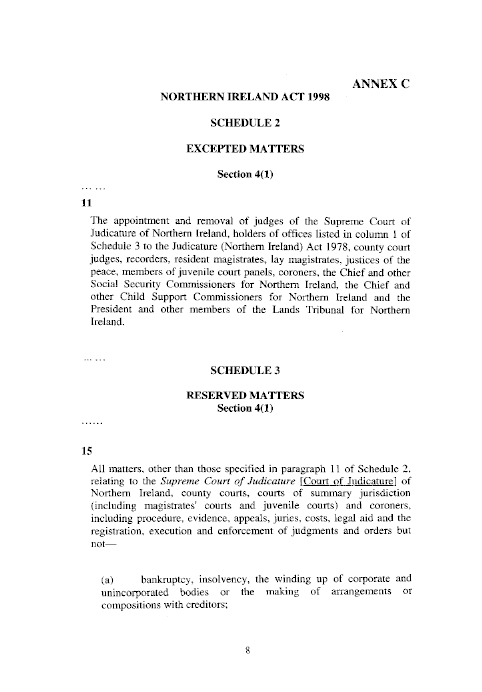
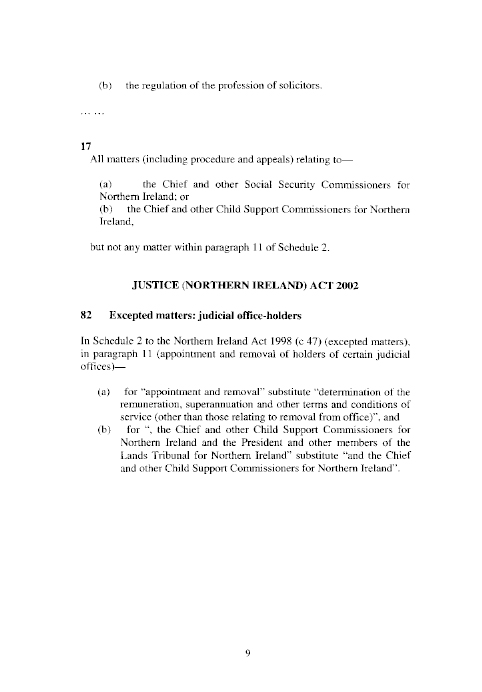
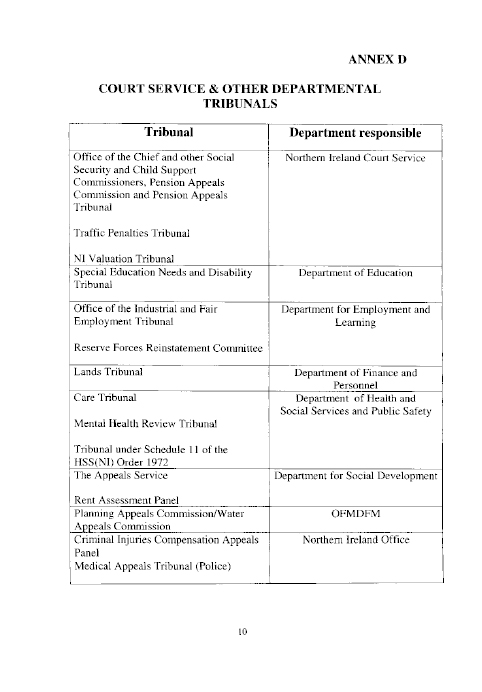
Northern Ireland
Human Rights Commission

Assembly and Executive Review Committee Inquiry
into the devolution of policing and justice matters:
Evidence of the Northern Ireland Human Rights Commission
1. The Northern Ireland Human Rights Commission (the Commission) is a statutory body created by the Northern Ireland Act 1998. It has a range of functions including reviewing the adequacy and effectiveness of Northern Ireland law and practice relating to the protection of human rights,[1] advising on legislative and other measures which ought to be taken to protect human rights,[2] advising on whether a Bill is compatible with human rights[3] and promoting understanding and awareness of the importance of human rights in Northern Ireland.[4] In all of that work the Commission bases its positions on the full range of internationally accepted human rights standards, including the European Convention on Human Rights (ECHR), other treaty obligations in the Council of Europe and United Nations systems, and the non-binding ‘soft law’ standards developed by the human rights bodies.
2. The Commission welcomes the opportunity to respond to the Committee’s inquiry. There is no overwhelming human rights principle favouring decentralisation of policing and justice, and it should be noted that the central government retains ultimate responsibility for ensuring compliance with the state’s international human rights obligations. The Commission nonetheless broadly welcomes the proposed devolution of these matters, to the extent that it provides opportunities to bring a rights-sensitive area under more localised democratic control and accountability, which has the potential to enhance cross-community confidence in the wide range of organisations involved in delivering policing and justice. That enhanced confidence ought, in turn, to bring about enhanced representativity and effectiveness, and thereby should improve the capacity of the policing and justice systems to protect human rights and provide appropriate responses to violations, in terms of investigation and redress.
3. In making its response, the Commission draws, in particular, on the following human rights standards relevant to justice and policing:
i. The European Convention on Human Rights, in particular, Article 2 (everyone’s right to life shall be protected by law); Article 3 (no one shall be subjected to torture or to inhuman or degrading treatment); Article 5 (right to liberty and security of person); and Article 6 (right to fair and public hearing within a reasonable time by an independent and impartial tribunal established by law);
ii. Article 5 of the International Convention on the Elimination of All Forms of Racial Discrimination (ICERD) which undertakes “…to guarantee the right of everyone, without distinction as to race, colour, or national or ethnic origin, to equality before the law”;
iii. The Report of the World Conference against Racism, Racial Discrimination, Xenophobia and Related Intolerance,[5] which “calls upon States to provide effective access to administrative and legal procedures and other remedial action to victims of racism, racial discrimination, xenophobia and related intolerance in the workplace”;
iv. General Recommendation No. 12 of the United Nations Committee on the Elimination of All Forms of Discrimination Against Women, relating to “legislation in force to protect women against the incidence of all kinds of violence in everyday life”;
v. UN Security Council Resolution 1325 (women’s direct role in conflict resolution and reconstruction processes) and Article 7 of the Convention on the Elimination of All Forms of Discrimination Against Women (CEDAW) (women’s equality in political and public life/taking part in forming government policy), and
vi. the UN Convention on the Rights of the Child, in particular Article 3 (best interests); and Article 12 (right to express opinion).
Scope of devolution
4. The Terms of Reference seek “To identify those policing and justice matters which are currently reserved matters under Schedule 3 of the Northern Ireland Act 1998 (the 1998 Act); and to consider which of these matters should be devolved and the extent to which they should be devolved”.
5. It is apparent that, whatever the extent of devolution, some matters will remain within the competence of the central UK authorities, and in a range of matters there will need to be effective co-operation with the Republic. It will be important to ensure that there is clarity of ministerial functions and administrative arrangements across the jurisdictions (i.e. Northern Ireland, Republic of Ireland and the UK) in relation to responsibilities for excepted and devolved matters that may cross boundaries.
6. This may include, for example, inter-relationships between PSNI; Metropolitan Police; Garda Síochána; the Security Service; Serious Organised Crime Agency (SOCA); and the Border and Immigration Agency. In particular, attention should be given to ensuring clear arrangements are in place in relation to information sharing and accountability mechanisms of the above organisations.
7. Clear protocols are required governing the handling of covert human intelligence sources (CHIS) managed within PSNI and the Security Service, alongside robust accountability mechanisms in relation to oversight of covert policing operations. It is important to ensure that the Office of the Police Ombudsman should have the necessary powers to fulfil this important function in relation to policing, and that the same or similar oversight should extend to CHIS management and covert operations of the Security Service. There is a clear risk that different levels of accountability could provide a disincentive for CHIS to co-operate with the police.
Departmental model
8. The Inquiry additionally seeks “To identify the preferred ministerial model and procedures for filling the ministerial post/posts for the new policing and justice department”. We are not clear from the call for evidence as to whether the Committee intends to limit discussion to the departmental model as specified in Schedule 5 of the Justice and Security Act (2007), or whether there is scope to explore the range of models outlined in the discussion paper produced by the NIO, Devolving Policing and Justice in Northern Ireland (2006).
9. Whatever departmental model is proposed, ministerial appointment procedures need to ensure that the interests of the diverse population of Northern Ireland are fully represented. While it may be considered more urgent or more necessary to address this issue in terms of “the two main communities”, given the history of sensitivities around policing and justice, we should not lose sight of the fact that Northern Ireland society is becoming ever more diverse. The Commission would not venture to intrude on the discretion of democratically elected MLAs to determine whether representativity at this level requires a dual ministry or deputy minister, or may be secured by robust oversight mechanisms. It would, however, point out that if opting for a dual model that at least in the short term will de facto represent only the two main traditions, there is some risk that this would serve to entrench difference and could marginalise the attention given to other interests.
10. There should therefore be scope to review the ministerial model and procedures for fulfilling the ministerial posts as we progress towards a more stabilised society and increased confidence within communities of policing and criminal justice functions. This might involve reviewing any requirement that restricts ministerial candidates to membership of the larger political designations. It may also involve reviewing the efficiency of a dual ministry, giving consideration to the desirability of moving towards a more ‘normal’ model of a single ministry. It is surely to be hoped that, over time, we may move towards a situation where the policing and justice ministry is no more contentious than any other major department.
11. Whatever model is preferred, there should be a clear delineation of ministerial responsibilities in relation to decision making processes across the criminal justice agencies, particularly if the model is headed up by two ministers.
12. Robust scrutiny and oversight and accountability mechanisms governing devolved matters must be in place so as to build public confidence in the criminal justice system. If at some future date those mechanisms are themselves to be devolved, they must remain independent of the ministry.
Preparations: not merely institutional issues
13. The inquiry is asked “To identify what preparations need to be made by the Northern Ireland Assembly to facilitate the devolution of policing and justice matters and what preparations have been made”.
14. It is important that the Inquiry considers the necessary steps needed to establish structural arrangements, but conceptual issues around policing and criminal justice should also figure in the discussion. While the focus to date has been on constitutional/ministerial arrangements for the devolution of criminal justice functions, opportunities present themselves in which to consider issues relating to the vision and values that underpin a future devolved criminal justice system in Northern Ireland. This might include, for example, ensuring that alternatives to prison are thoroughly investigated for low-level, low-risk offenders (this category would include women prosecuted for non payment of fines); and that community-based restorative justice schemes are fully utilised wherever appropriate.
15. It might also include re-visiting definitions of security within a post-conflict society. For example, recent research[6] has demonstrated that many women characterise security as a “holistic concept which encompassed a range of ‘securities’, and within which personal and economic security is central”. This concept has a direct bearing upon values and targeting of resources that underpin initiatives to deliver and sustain safe environments in the public and private domain.
16. This research also refers to the need for a “more robust analysis of how policy makers analyse and think about the impact of different policies”. This highlights the importance of UN Security Council Resolution 1325 (women’s direct role in conflict resolution and reconstruction processes) and Article 7 of CEDAW (women’s equality in political and public life/taking part in forming government policy).
17. Other relevant research that may be of interest to the Committee is the international comparative research carried out by the Committee on the Administration of Justice (CAJ), Change and Devolution of Criminal Justice and Policing in Northern Ireland: International Lessons (2006). This report examines possible institutional models that a devolved criminal justice system might adopt and seeks to identify institutional models that maximise human rights protection, promoted accountability and afford protection to minorities.
Assessing cross-community confidence
18. Although not expressly addressed in the Terms of Reference, the Committee may wish to explore what steps need to be taken to assess the level of confidence within communities prior to the Assembly requesting devolution of policing and justice matters. This is particularly relevant to Northern Ireland where there is a long legacy of mistrust and lack of confidence in the criminal justice system amongst some communities, making achievement of meaningful consultation with communities difficult and complex.
19. To the extent that cross-community confidence in any proposed model for devolution is a pre-requisite, this might be a timely opportunity for the relevant oversight and consultative bodies (for example, the Policing Board, District Policing Partnerships, Community Safety Partnerships) to assess their respective and collective roles in terms of an ability to provide space for diverse interest groups wishing to contribute to discussions relating to the future shape of policing and justice functions. Groups that may not to date have engaged with the issues include, the traveller community; the children’s sector; minority ethnic groups including migrant workers and the lesbian, gay, bisexual and transgender population.
20. We hope that this response will help inform the work of the Committee. At this time, the Commission is not requesting an opportunity to present oral evidence; we will of course be pleased to provide clarification of any matters arising from this response.
August 2007
Northern Ireland Human Rights Commission
Temple Court, 39 North Street
Belfast BT1 1NA, Northern Ireland
Telephone: (028) 9024 3987
Textphone: (028) 9024 9066
Fax: (028) 9024 7844
Email : information@nihrc.org
Website: www.nihrc.org
Northern Ireland Law Commission
Inquiry into the devolution of policing and justice matters
1. The Northern Ireland Law Commission was established by the Justice (Northern Ireland) Act 2002 and the relevant sections were brought into force on 16 April 2007. I was appointed chair of the Commission on that date. A chief executive has now been appointed and it is hoped that the 4 commissioners provided for in the legislation will be appointed in October. The Commission will then embark on a process of consultation leading to the establishment of its work programme in accordance with the legislation.
2. The establishment of the Commission was a recommendation of the Criminal Justice Review Group and its remit covers civil and criminal law including practice and procedure and revision and repeal of statute law.
3. At present matters relating to the criminal law are the responsibility of the NIO and matters relating to practice and procedure within the courts are the responsibility of the Northern Ireland Court Service. The remaining matters are mainly the responsibility of Northern Ireland Departments.
4. The Commission will have to establish robust consultation procedures in respect of the development of its work programme. That will include consultation with the responsible departments. If policing and justice matters are devolved it will be necessary to put in place arrangements to ensure that the Commission has the opportunity to consult appropriately with the Assembly on any proposals relating to those issues.
5. The Commission’s work programme must be approved by the Secretary of State who is obliged by s 51(3) to consult the First Minister and deputy First Minister on that issue.
Declan Morgan
Chair
Northern Ireland law Commission
Northern Ireland Office
(Mr Paul Goggins MP)
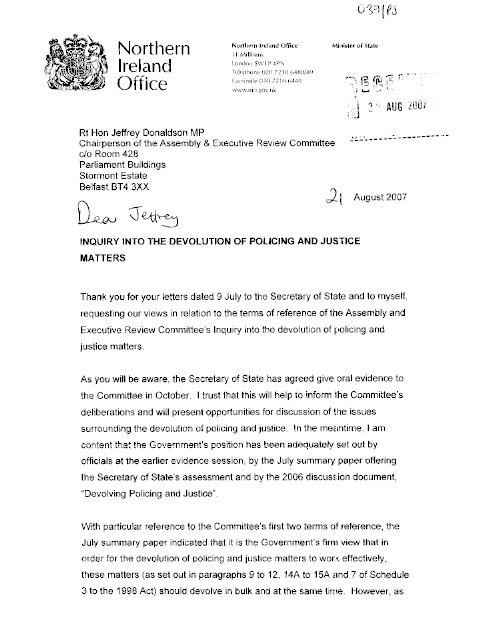
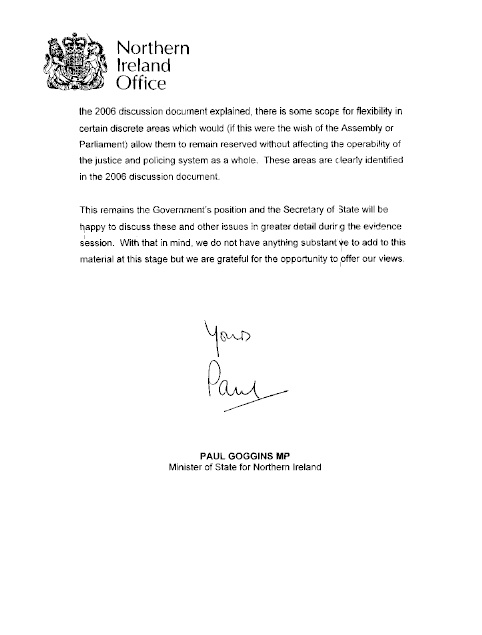
Northern Ireland Policing Board
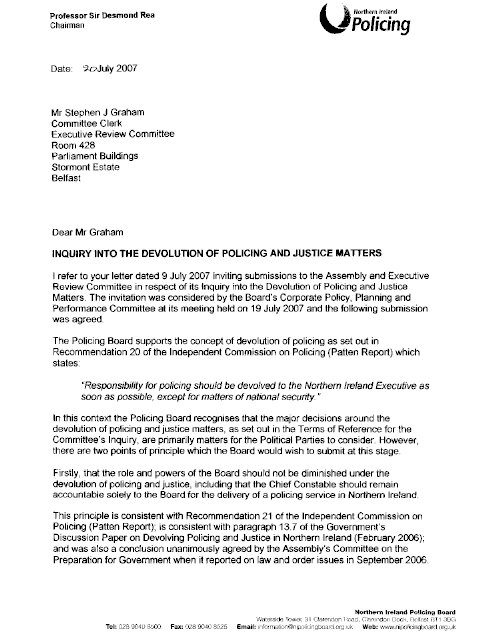
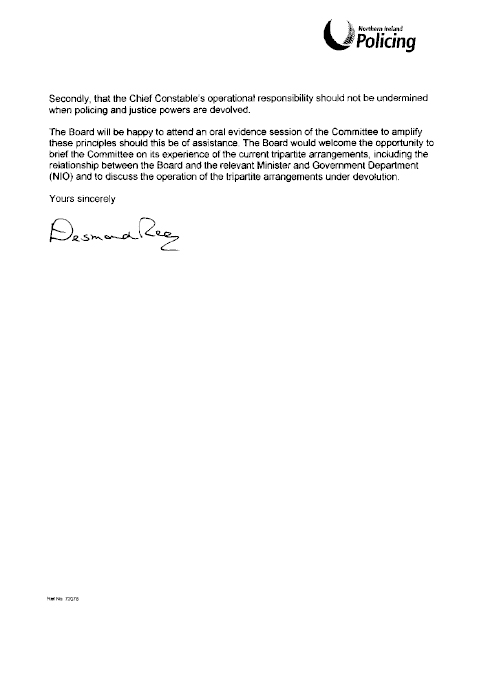
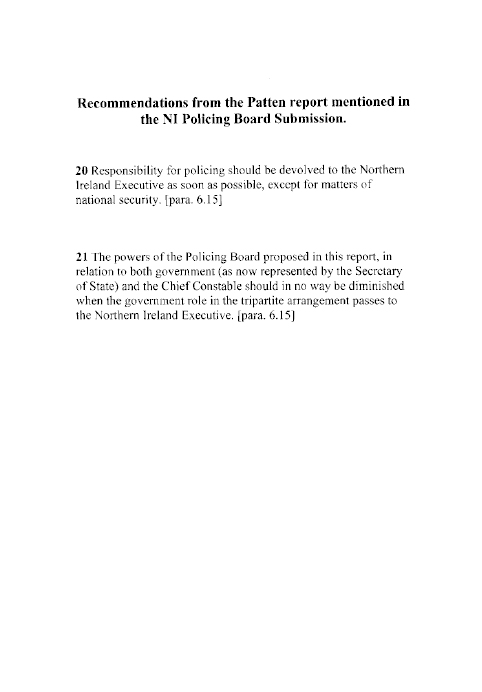
Northern Ireland Women’s
European Platform
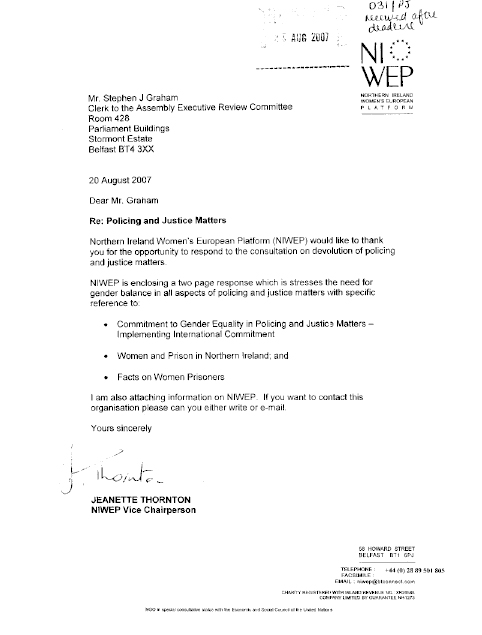
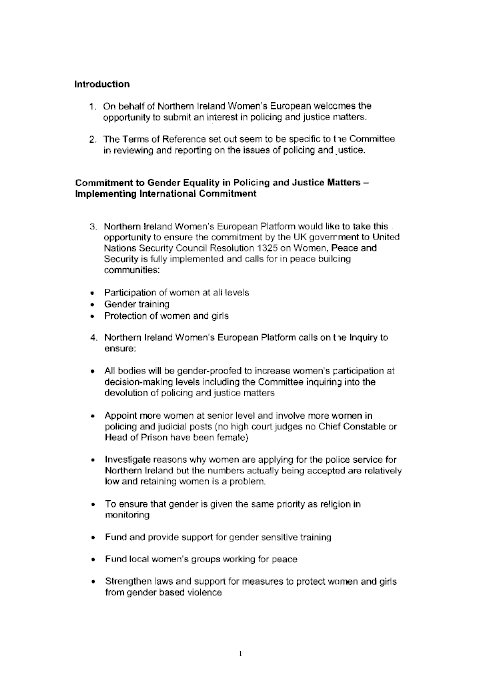
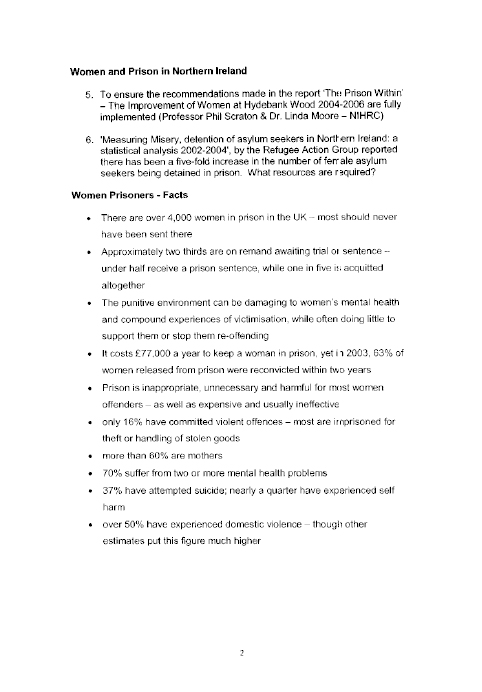
Presbyterian Church in Ireland

Church and Society Committee
Devolution of policing & justice
1. The Presbyterian Church in Ireland includes members who have served as police officers and, particularly over the years of the ‘Troubles’, has been very conscious of the level of threat which many have lived with and also the suffering that has resulted from death and injury. We, therefore, make our comments from the context of having been supportive of policing.
2. We are also very much aware of the changes that have taken place in policing and are conscious of the challenges of adapting a policing service to the new situation. We have been broadly supportive of the changes while having reservations about, for example, with the 50/50 rule. At the same time, we believe that a police service should be more representative of the whole community thus increasing its broad accountability.
3. With regard to the devolution of policing & justice we would express some caution. While our society continues to evolve in a peaceful setting we would want to resist any changes which simply devalue the efforts that were made in policing and justice to serve the whole community and the price that many paid in doing so.
4. While we believe it is a sign of a healthy society that it takes responsibility for maintaining its own rule of law, we also believe that the time when this responsibility is taken on will have to reflect a maturity and integrity within that community and among its leadership.
5. We would like to take the time to consult more widely before finally expressing a view and discussing it with you.
Rev. Dr. Lesley Carroll
Co-convenor Church & Society Committee
5 Lismoyne Park
Belfast
BT15 5HE
02890778279
lcarroll@presbyterianireland.org
16th August 2007
Probation Board for Northern Ireland
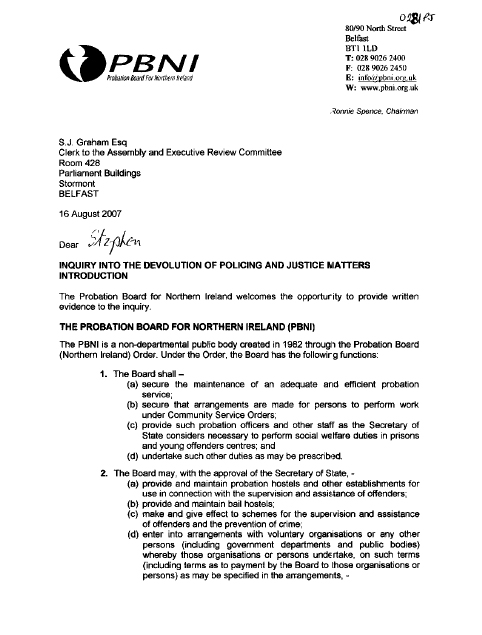
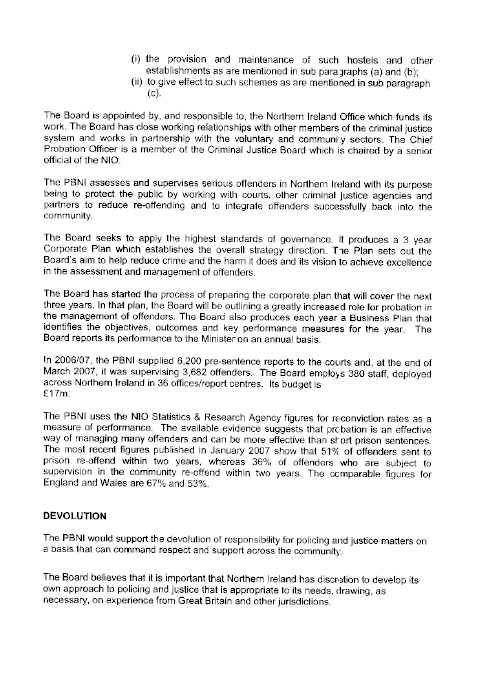
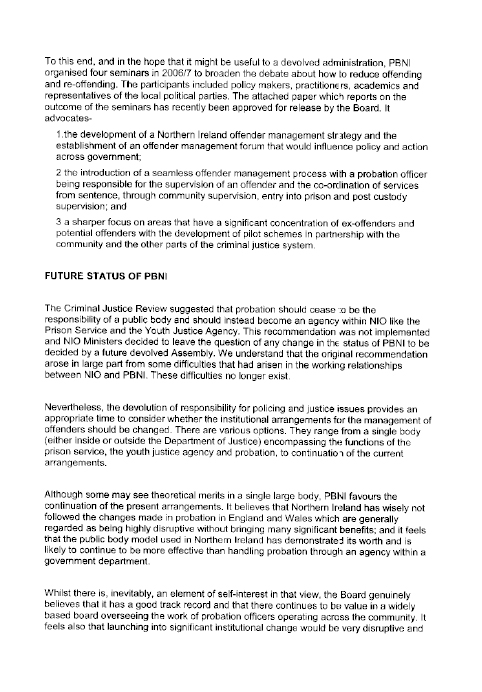

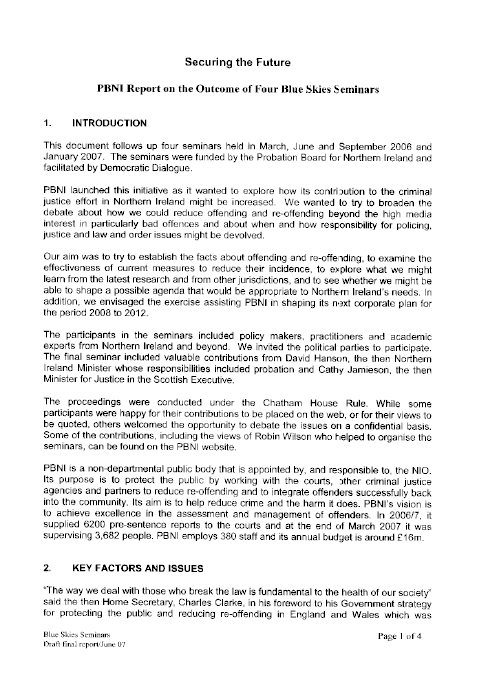


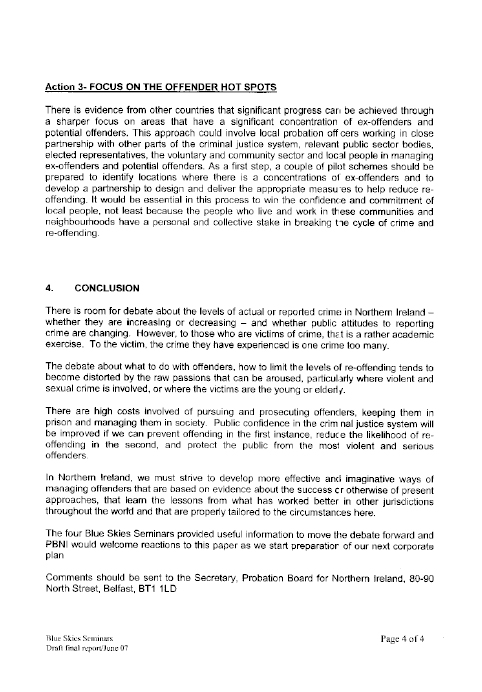
Probation Board
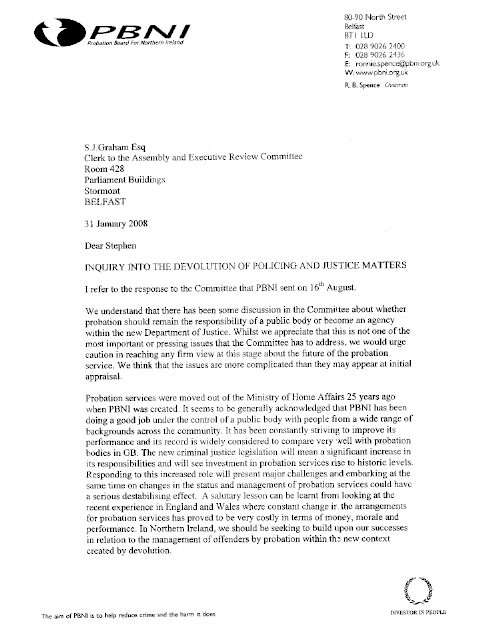
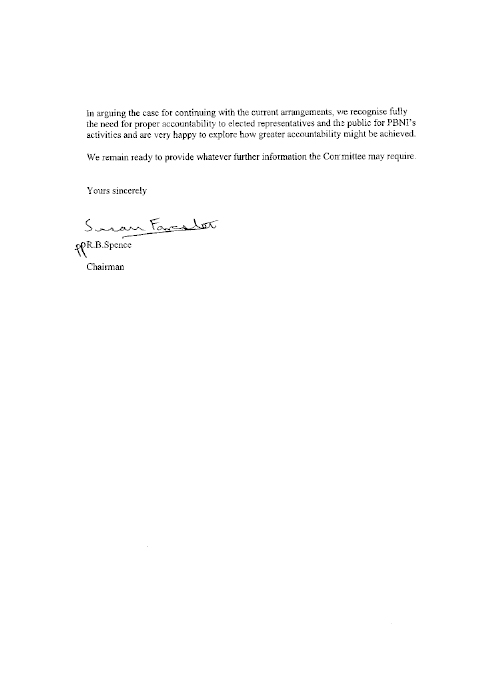
Police Service of Northern Ireland
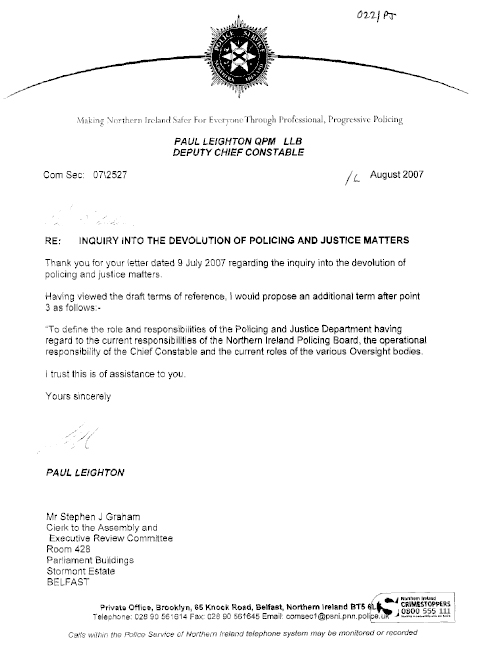
Public Prosecution Service,
Northern Ireland
Stephen J Graham Esq PPS Ref: ED 246/6 Vol 3
Clerk to the Assembly & Executive
Review Committee
Room 42B
Parliament Buildings
Stormont Estate
Belfast
14 August 2007
Dear Mr Graham
Thank you for your letter and enclosure dated 9 July.
I have now had an opportunity of discussing these matters with the Director on his return to the office. He has asked me to reply.
I have considered the terms of reference of the Assembly and Executive Review Committee. You seek to identify those policing and justice matters which are currently reserved matters under Schedule 3 to the Northern Ireland Act 1998 and to consider which of these matters should be devolved and the extent to which they should be devolved.
Paragraph 9 of Schedule 3 lists the following matters:-
“(a) the criminal law;
(b) the creation of offences and penalties;
(c) the prevention and detection of crime and power of arrest and detention in connection with crime or criminal proceedings;
(d) prosecutions;
(e) the Treatment of Offenders (including children and young persons, and mental health patients, involved in crime);
(f) the surrender of fugitive offenders between Northern Ireland and the Republic of Ireland;
(g) compensation out of public funds for victims of crime
Upon devolution, it will be necessary to devolve some or all of the matters set out above.
You also seek to identify the preferred ministerial model and procedures for filling the ministerial post/posts for the new policing and justice department.
While the matters set out at paragraph 9(a), (b), (c), (e), (f) and (g) are most likely to fall within the remit of a Department of Justice, the Director does not consider it appropriate for the prosecution of offences to be placed in that Department which has operational responsibilities for other areas of criminal justice. The Director agrees with the view of the Criminal Justice Review (2000) that public confidence in the criminal justice system is enhanced by the independence and clear separation of the functions of the key components of the criminal justice process, namely investigation, prosecution and adjudication. This provides an assurance of objective, dispassionate decision making and of checks and balances.
It is vital that the independence of the Director and the prosecuting authority is maintained and protected. This was clearly envisaged by the Criminal Justice Review and is established and exemplified in the Justice (Northern Ireland) Act 2002. Section 42(1) of the 2002 Act provides that the functions of the Director will be exercised by him independently of any other person. The Director is the head of the Public Prosecution Service and the Deputy Director, public prosecutors and other members of staff are subject to his direction by virtue of section 29(6) of the 2002 Act. While the Director and Deputy Director will be appointed by the Attorney General for Northern Ireland in accordance with section 30 of the 2002 Act, the relationship between the Director of Public Prosecutions and the Attorney General for Northern Ireland is to be consultative only as set out in section 42(2) – (3) of the 2002 Act. Again, this is in accordance with the recommendations of the Criminal Justice Review.
It is, as I have indicated, an essential and fundamental principle that the Public Prosecution Service for Northern Ireland is independent in the discharge of its functions and is perceived so to be. It is the duty of the Director of Public Prosecutions to take decisions as to prosecution in accordance with law and practice. He exercises this quasi judicial function in a wholly independent manner and is not subject to interference, question or pressure. For example, section 29(11) of the 2002 Act provides that:-
“The Director (and the Deputy Director and members of staff of the Service) may not be required in any proceedings of the Assembly to answer any question or produce any document relating to a matter other than the finances and administration of the Service”.
Given this statutory scheme, the Public Prosecution Service should be funded in a manner which not only ensures it can carry out its duties and responsibilities in an efficient manner but also will maintain and protect the independence of the prosecuting authority. In the Director’s view this is best obtained by establishing appropriate arrangements with the Office of First and Deputy First Minister. In addition, the arrangements with OFMDFM would allow the Director to express his views on, for example, matters of law reform which impact upon prosecutorial functions without impinging upon the operational responsibilities of the Department of Justice. While responsibility for law reform rests with ministers in the Assembly, the Director considers that they are entitled to his views on the implications of change and such an arrangement would provide an effective channel of communication for such matters.
In advance of devolution of justice consideration should be given to a concordat on the independence of the prosecution. The concordat should aim to set out arrangements to be agreed between Her Majesty’s Government and the Northern Ireland Executive that safeguard the independence of the Public Prosecution Service for Northern Ireland following the devolution of responsibility for criminal justice matters to the Northern Ireland Assembly and Executive.
If the Public Prosecution Service is to operate as independently as possible as a distinct institution following devolution, the requirements for a new financial and personnel management system will need to be met through administrative change. Such arrangements ought to begin well in advance of devolution.
Finally, you may wish to give consideration to the provisions of section 25 of the 2002 Act in the context of the extension of standing orders to the Attorney General’s functions.
I hope you will find these observations of assistance.
I will forward a hard copy of this letter to you in the post.
Yours sincerely
W R JUNKIN
Deputy Director
Robert McCartney Justice Campaign
McCartney family’s submission to the Inquiry into the devolution of policing and justice.
Our submission to the committee concerns the lack of cooperation of Sinn Fein members into the murder investigation of our brother Robert. Building the community’s confidence in the sincerity and fundamental belief in the principle of policing of all parties in the Northern Ireland Executive and Assembly has been cited as a prerequisite for the devolution of policing and justice. The fact that no Sinn Fein member has cooperated directly with the police regarding the investigation into the murder of our brother Robert can only serve to undermine this confidence and thus delay the transfer of these powers.
Background.
Robert was murdered ‘allegedly’ by Sinn Fein and IRA members on 30th January 2005 and despite numerous Sinn Fein members presence in the vicinity of the bar at the time (Sinn Fein’s own estimate was 12 but the number is believed to have been higher) none of its members did or have spoken directly with the PSNI.
The investigation into Robert’s murder was hampered by the IRA’s successful efforts to destroy forensic and physical evidence (including the destruction of the knife and the cleaning down of the bar), silencing of witnesses and the refusal of its and Sinn Fein’s members to cooperate with the police.
Since 2005 we have campaigned strenuously to bring Robert’s killers to justice and in spite of rather than because of ‘republican’ cooperation a man currently stands charged with Robert’s murder.
In 2005 Sinn Fein claimed to have suspended its members whom refused to comply with party policy at the time, which was to supply information through a solicitor or via the ombudsman. Accepting Sinn Fein’s assertion that political sensitivities surrounding cooperation with the police from within the nationalist community was the main cause for the lack of direct cooperation with the PSNI, the Ombudsman opened her office to facilitate this process (a third way, it was called). Despite this unprecedented step (a step some of the officers of the Ombudsman’s office were deeply unhappy with) only one Sinn Fein member agreed to the speak to the Ombudsman’s investigating officers and was so unnerved by the probing questions that no other members came forward instead supplying written statement, some unsigned to the Ombudsman via a solicitor. The Ombudsman Nuala O’Loan concluded that the whole exercise had been ‘fruitless’.
Current position.
Over the past few months the PSNI has been in contact with Sinn Fein regarding the lack of cooperation of its members. The police entered into talks with Sinn Fein because the investigating officer believes that the party can help if it chooses to. The detective in charge is a professional and interested only in policing and spoke with Sinn Fein because he knew that they could deliver, only the will would prevent them from doing so. The police have confirmed to our family this week that Sinn Fein are not cooperating with the investigation.
Conclusion.
The effective and transparent cooperation of Sinn Fein members with the investigation into Robert’s murder and clarification on the party’s policy regarding those members whom refuse to do so is in our view essential if the community’s confidence is to grow strong enough to allow for the devolution of policing and justice powers to the executive.
In the light of the brutal murder of Harry Holland in West Belfast over a week and the strong response from Sinn Fein it is our position that the ‘nationalist communities’ sensitivity to working with the police is no longer an acceptable or valid excuse and the continued refusal of Sinn Fein to cooperate with the PSNI in relation to Robert’s murder signals an ‘a la carte’ approach to policing.
It is our view that the lack of cooperation by Sinn Fein into Robert’s murder should be considered by the committee when fulfilling its remit to prepare a report to the Secretary of State into the timeline for devolving policing and justice powers.
If necessary we can provide the committee with further details of the Sinn Fein members who have yet to cooperate with the PSNI.
RobertMcCartney Justice Campaign.
104 Glendale Park,
Belfast, BT8 6HS.
Serious Organised Crime Agency
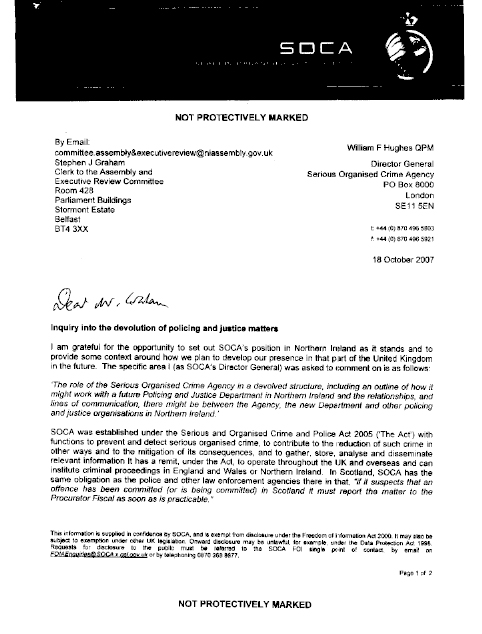
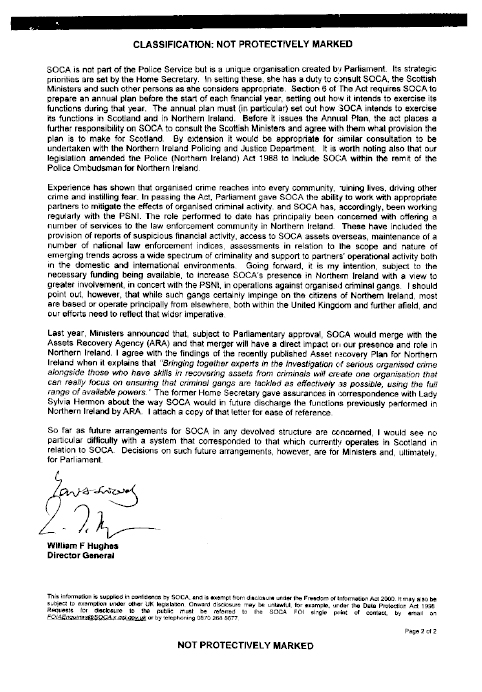
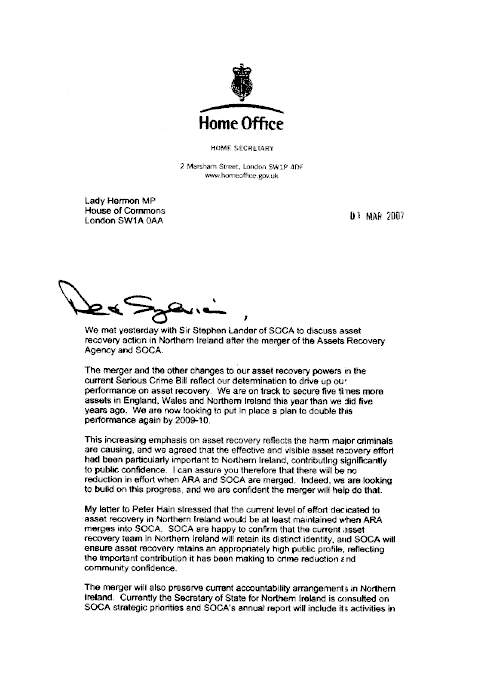
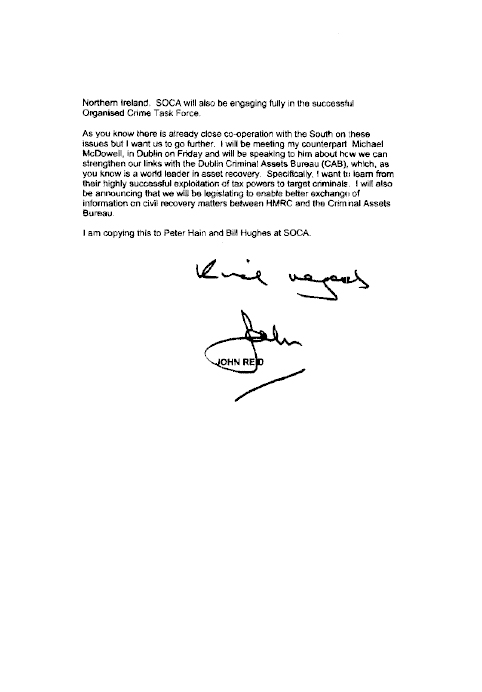
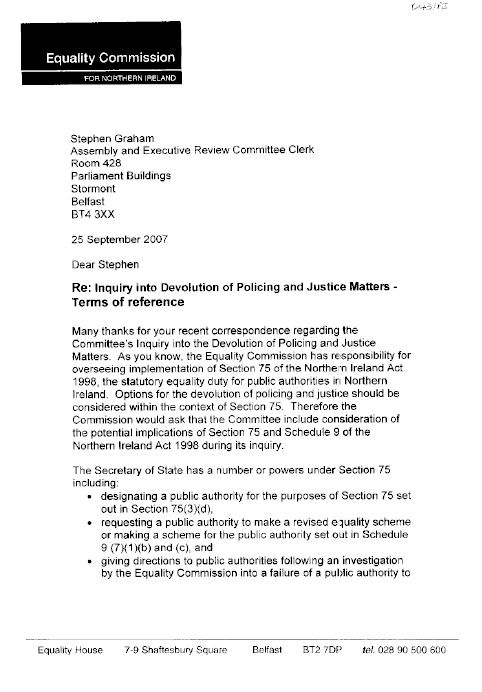

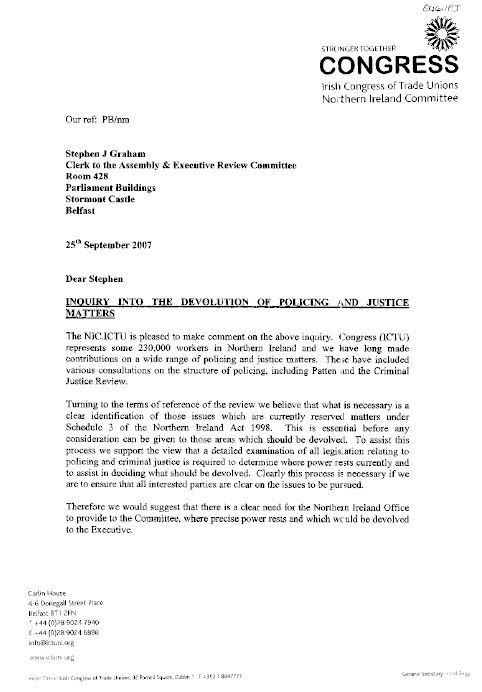

LSNI Response to the Assembly and Executive Review Committee of the Northern Ireland Assembly, in Relation to its Enquiry into the Devolution of Policing and Justice
LSNI welcomes the opportunity to comment on those Justice and Policing issues which will fall to the devolved Northern Ireland Assembly and on which it considers it appropriate for it to comment, in the context of its role as the representative body for the solicitors’ profession in Northern Ireland.
As such, it is our intention to comment only, on those devolvable issues which have the capacity, to impact upon solicitors in their day to day business on behalf of clients and in particular on the interface between those clients/members of the public and, the Courts, the Judiciary and general administration of justice in Northern Ireland and also on those issues, which have the potential to adversely impact upon the independence of the solicitors’ profession in Northern Ireland.[1]
Taking the issues scheduled in the Summary of Justice and Policing issues contained in Appendix 1of the Report on the Devolution of Policing and Justice produced by the Committee on the Programme for Government on 22nd January 2007, seriatim we would therefore comment or remark as follows - Issues 9 (a) (b) & (c)
9 (a) The criminal law and the creation of offences and penalties; the prevention and detection of crime and powers of arrest and detention in connection with crime or criminal proceedings.
The Society as a matter of course and as one of its primary functions, acting in the public interest, comments on an on going basis on developments within Criminal law & Practice, as they affect its members and the manner, in which they represent their clients.
We will continue to do so and look forward to interface with the Assembly’s Ministry of Justice (or as otherwise denominated on this basis).
We believe, that our role is confined to commenting on legislative as it evolves from the legislature.
9(d) Prosecutions
We understand that the appointment of the Attorney General for Northern Ireland will fall to the FMdFM. The Attorney General for Northern Ireland will subsequently appoint the Director of Public Prosecutions for Northern Ireland. The independence of the prosecution service from Government is a prerequisite of a democratic Society. Once the appointment is in place any relationship between the Attorney General for Northern Ireland and the DPP as to the latter’s operational functions should be consultative only, given that the former is a political appointment or is capable of being perceived as such. We will comment later on the structure of any Ministry of Justice to satisfy this need for independence.
We support the proposal that the devolution of the statutory rules applying to the prosecution system, including the role of the PPS and the Attorney General for Northern Ireland will be subject to the agreement of Concordats between the UK Government and the NI Administration on the independence of the prosecution system.
Any departure from the principle of independence can only result in undue pressure on the Criminal Courts system as cases are defended and appealed, with ultimate recourse to the European Courts.
We note only at this stage the creation of an Advocate General for NI, as a role of the Attorney General of England & Wales, to deal with excepted matters.
9 (e) Treatment of offenders (including children and young persons, and mental health patients, involved in crime).
Our general comments in relation to Issue 9(a) etc., as set out above apply.
9(g) Compensation
We consider that it is essential to establish and maintain a properly funded and administered system for the compensation of the victims of crime. Given the unsatisfactory experience of our members as to the operation of the existing scheme, we would recommend its independent review as soon as possible.
9(h) Community Safety Partnerships
Our general comments in relation to Issue 9(a) etc., as set out above apply.
9 A Chief Inspector of Criminal Justice for Northern Ireland.
The Society looks forward to developing its interface and relationship with the Chief Inspector of Criminal Justice for Northern Ireland. We would stress the absolute necessity for the position to be independent of Government.
10 Parades
Our general comments in relation to Issue 9(a) etc., as set out above apply.
11 The Police and the policing accountability framework.
11(a) Co-operation between the PSNI and the Garda Siochana in relation to a specific series of matters
These are issues for Government policy and as such we do not consider it appropriate to comment, as they do not in principle impact on our representation of clients nor the operation of the criminal law. We reserve the right to comment in future, should this prove otherwise.
12 Firearms & Explosives
Our general comments in relation to Issue 9(a) etc., as set out above apply.
15 The Courts
Solicitors are “Officers of the Court” and as such susceptible to regulation thereby; the Lord Chief Justice has statutory responsibility under the Solicitors (Northern Ireland) Order 1976 for approving our Regulations for the control of the profession. It is central therefore to the independence of the solicitors’ profession in Northern Ireland that the Courts and Judicial system, of which it is part, is not only independent, but also seen to be so. We do commend the creation and maintenance of necessary appropriate levels of transparency and oversight. Where these are in existence they should continue. There should also be a continuous process of review to identify new areas for oversight.
The areas to be devolved under this general heading fall into five categories: -
- The Northern Ireland Court Service (including the Lord Chancellor’s functions in respect of Court administration).
- Legal Aid.
- Judicial appointment arrangements (subject to the agreement of a Concordat between UK Government and the NI Administration governing the independent Judiciary) become the responsibility of the FMdFM.
- Appointment of arbitrators, referees and advisory bodies other that those falling within the remit of the NI Judicial Appointments Commissioner.
- Making of recommendations to the Crown in the appointment of Queen’s Counsel.
In relation to these five issues we consider it a sine qua non that the efficient and effective administration of such matters is in the interests of the public within a framework of democratic and financial accountability, based on recognised international standards for the independence of the Judiciary – we would refer the Committee to the recognised United Nations and Council of Europe’s Standards (annexed hereto).
(1) The NI Courts Service
We believe that the current status of the Northern Ireland Court Service as separate and independent of both the Northern Ireland Civil Service and the Northern Ireland Office should be maintained. The Northern Ireland Court Service’s primary function is to provide administrative support for the Courts and in particular the Lord Chief Justice.
In recognition of the over-riding principle of continuing the independence of the Judiciary, we would support, the concept of a non-ministerial department chaired by the Lord Chief Justice for Northern Ireland. The Law Society of Northern Ireland would be pleased to nominate members to its Board.
Implicit, in devolution issues across the board, is the absolute necessity, for adequate funding and financial arrangements to follow devolved powers.
The Northern Ireland Assembly, in the absence of any fiscal raising powers of its own must be adequately resourced to deal with areas of responsibility with which it is charged.
Legal Aid is an area, in which, the interests of the public are paramount. Despite controversy and mis-guided publicity, the fact remains that Legal Aid exists to provide legal services to that section of the community, which is economically least able to provide for itself. Lawyers are entitled to be paid a fair and reasonable fee for such work.
It is unlikely public funding could replicate the capital investment and infrastructure reflected in the 550 solicitors’ practices throughout seventy four cities, towns and villages in Northern Ireland, providing readily accessible legally aided services to the often economically deprived population here. For that reason, we must take this opportunity to remind the Committee that Central Government must put it in the position to properly fund Legal Aid on an ongoing basis with proper future budgeting and contingency planning. Inadequate past funding has - (and we do not consider this the appropriate venue to ventilate all the arguments) - led to a pattern of under funding reflected in slow payments and administrative delays. We urge the Committee, to ensure that it starts with a clean slate so that future Legal Aid budgets are clearly separate, from the budgets for other issues of justice and policing.
3 Judicial Appointment Arrangements
The Lord Chancellor’s power to accept recommendations from the Northern Ireland Judicial Appointments Commission as to the appointment of Judges will be transferred back to FMdFM, subject to an agreed Concordat between the UK Government and the NI Assembly. We have already referred to the need for systemic independence in this regard and in support of recognised international standards, under-pinning the principle of the independence of the Judiciary. The independence of the Judiciary is a pre-requisite of a free and democratic society. Any perception of bias can only undermine public respect for and confidence in the operation of the Courts and the Rule of Law. Similar comments apply in relation to the removal of Judges.
In this process of devolution to the FMdFM There must be a transparent published concordant Involving the Lord Chief Justice for Northern Ireland, the Judicial Appointments Commission for Northern Ireland and the OFMdFM, which commands the confidence of the legal profession and all other stakeholders, not least the general public.
4 Appointment of Arbitrators
Similar comments apply as at.
5 Making Recommendations re QC appointments
Similar comments apply. We reserve our position to comment more fully in due course, if necessary, on the appointment of solicitor QC’s.
15 The Northern Ireland Law Commission
We commend the establishment of the Commission and look forward to a positive relationship and involvement with it to reflect that hitherto enjoyed with the Office of Law Reform for Northern Ireland.
Departmental Models
It has been suggested to the Law Society of Northern Ireland that we should express a view on the appropriate “Departmental model “ for a devolved Ministry of Justice. We understand that the Review Committee did not reach a consensus from amongst three potential models it considered.
There are an infinite number of models in existence internationally. We have not considered these in any detail, but consider that the models operating in Scotland and the Republic of Ireland may be worthy of consideration for this jurisdiction.
Broadly, however the Law Society of Northern Ireland would commend the formation of a distinct Ministry of Justice with a single responsible Minister supported by a Junior Minister, each representing opposite views and traditions. Such an arrangement must be structured to make provision for the independence of the prosecution process (see our comments above in relation to the role of Attorney General for Northern Ireland vis a vis the DPP (NI)); and ensure public confidence and credibility.
Conclusion
The Law Society of Northern Ireland looks forward to a positive and constructive relationship with the Ministry of Justice.
Our President and the Senior Office Bearers of the Society will make themselves available to give evidence to the Committee if it would find that helpful.
[1] The Law Society of Northern Ireland is established by Royal Charter, which provides its representative functions but it also has statutory powers and obligations pursuant to the Solicitors (Northern Ireland) Order 1976, for the discipline, education and control of the Solicitors’ profession in Northern Ireland).
Indepenence, efficiency
and role of judges
Recommendation No. R (94) 12
and explanatory memorandum
Legal Issues
-1-
Indepenence, efficiency
and role of judges
Recommendation No. R (94) 12
adopted by the Committee of Ministers
of the Council of Europe
on 13 October 1994
and explanatory memorandum
Council of Europe Press, 1994
-2-
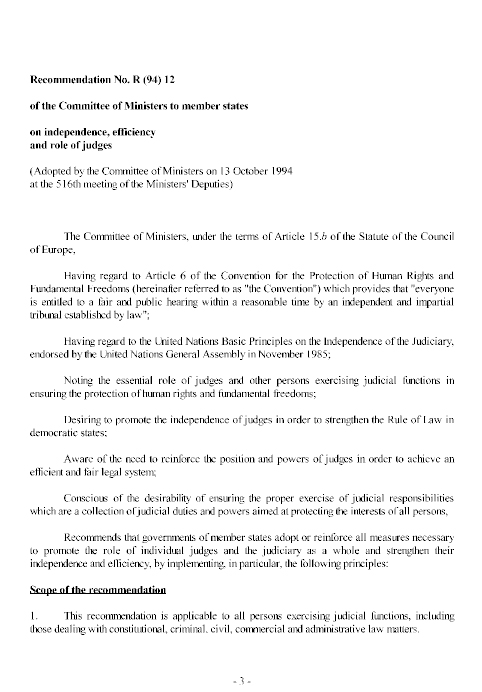
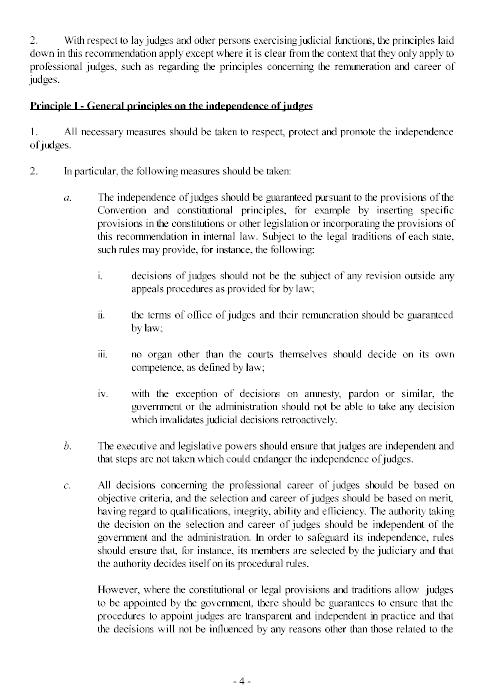
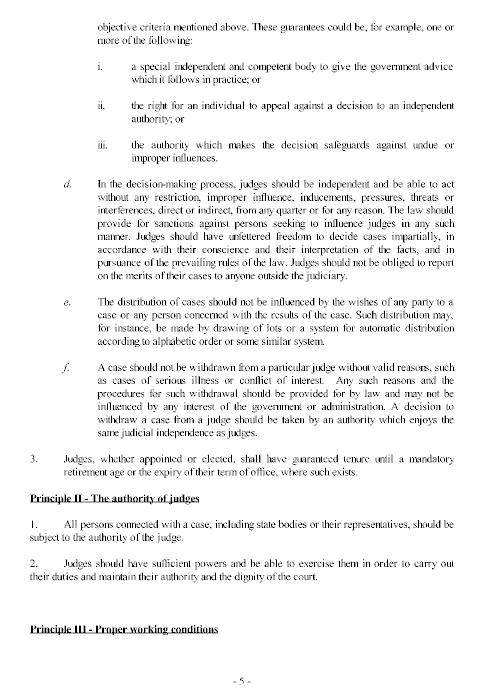
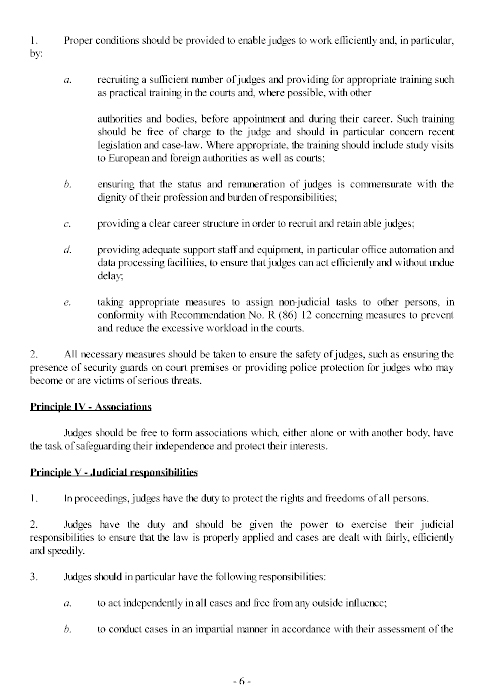
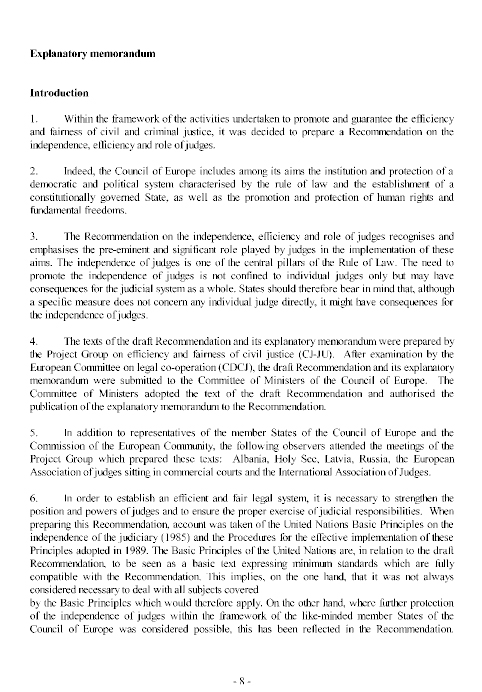
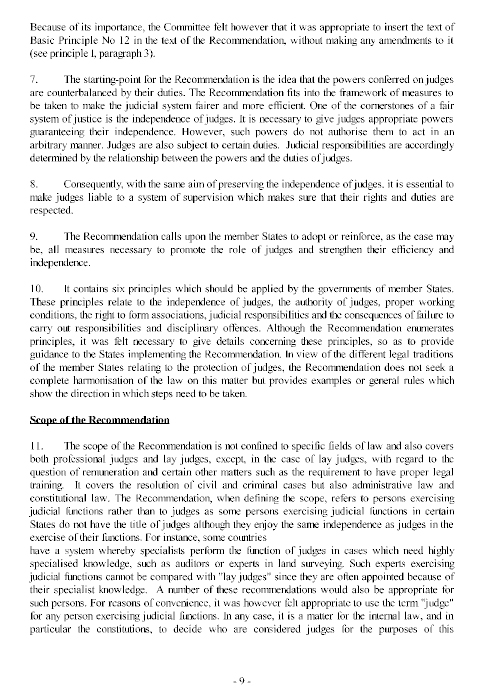
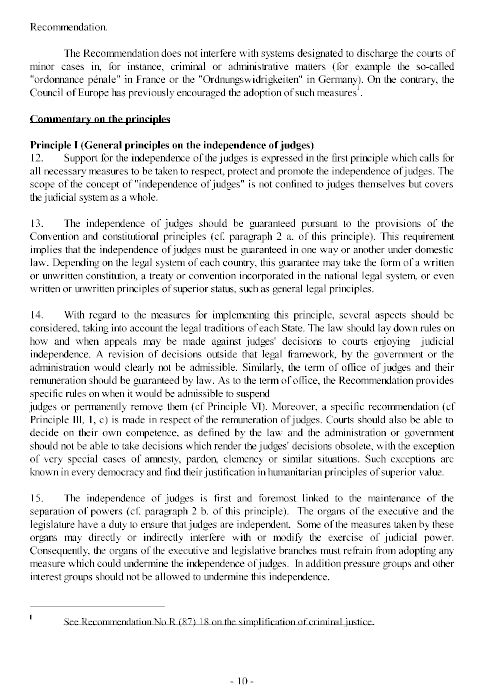
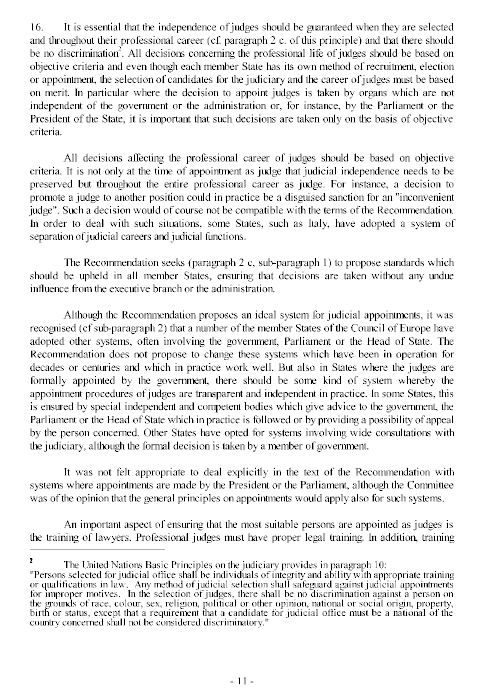
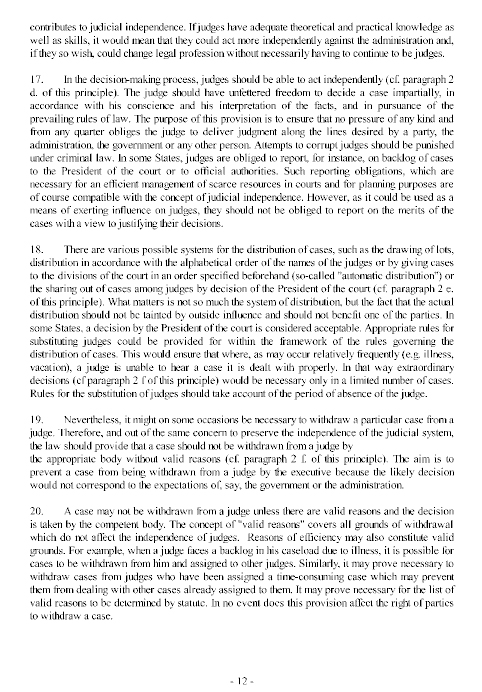
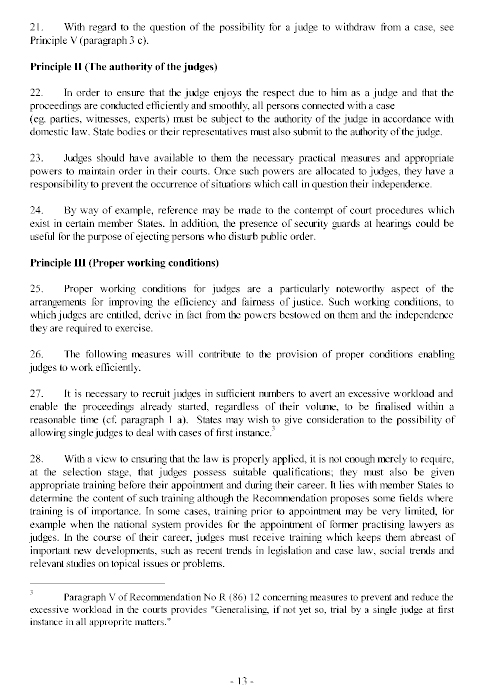
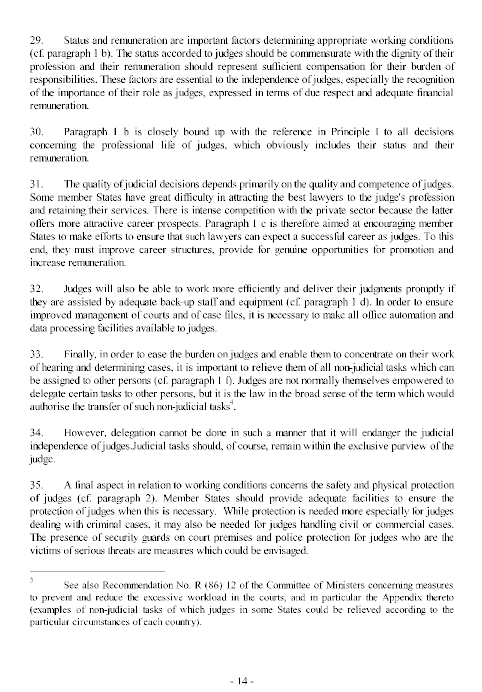
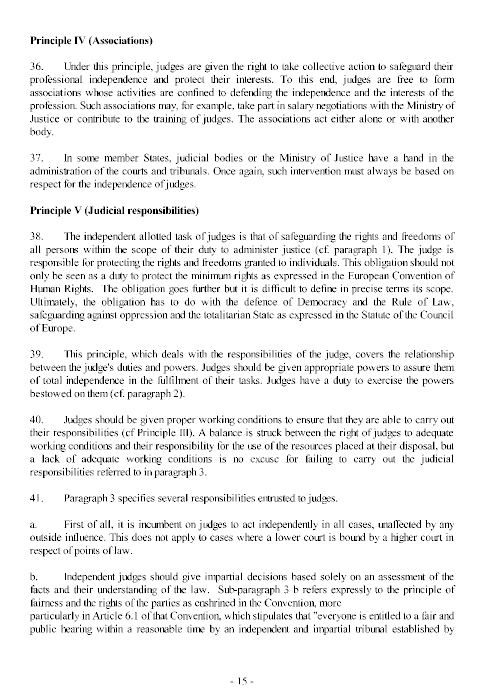
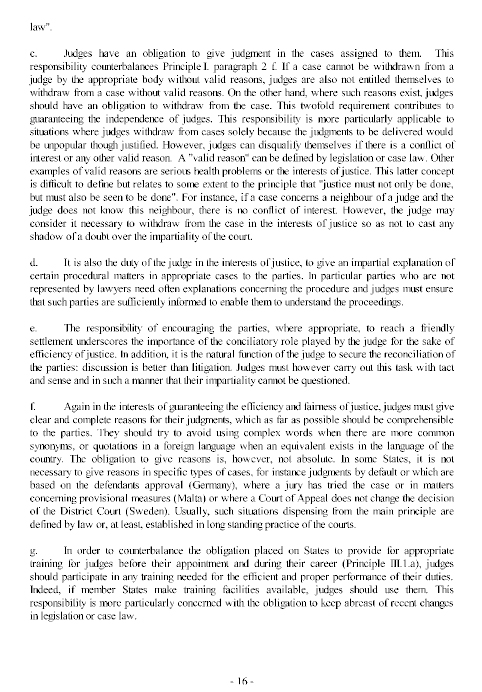
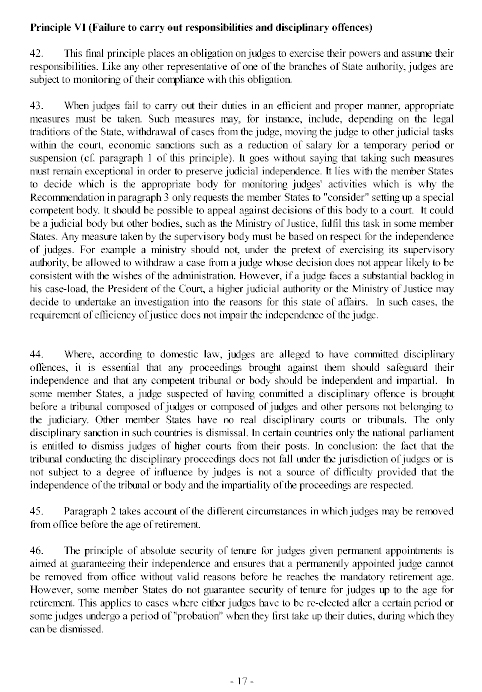
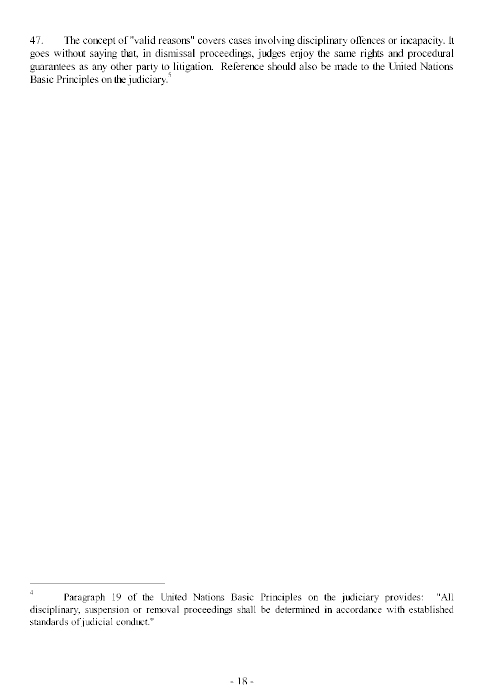
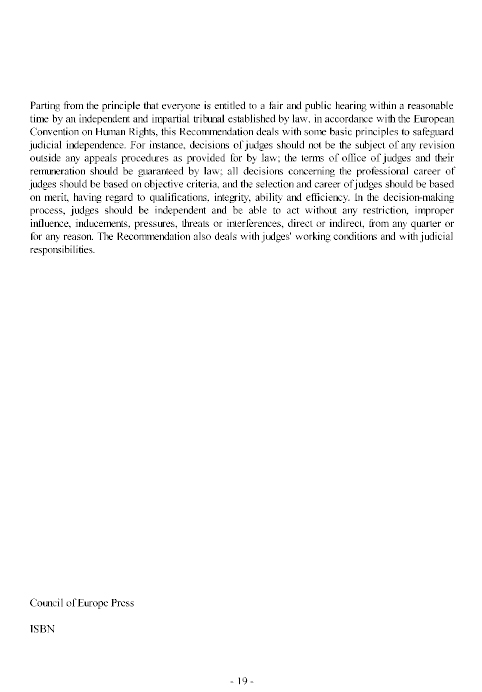

Basic Principles on the Idependence of the Judiciary
Adopted by the Seventh United Nations Congress on the Prevention of Crime and the Treatment of Offenders held at Milan from 26 August to 6 September 1985 and endorsed by General Assembly resolutions 40/32 of 29 November 1985 and 40/146 of 13 December 1985
Whereas in the Charter of the United Nations the peoples of the world affirm, inter alia, their determination to establish conditions under which justice can be maintained to achieve international co-operation in promoting and encouraging respect for human rights and fundamental freedoms without any discrimination,
Whereas the Universal Declaration of Human Rights enshrines in particular the principles of equality before the law, of the presumption of innocence and of the right to a fair and public hearing by a competent, independent and impartial tribunal established by law,
Whereas the International Covenants on Economic, Social and Cultural Rights and on Civil and Political Rights both guarantee the exercise of those rights, and in addition, the Covenant on Civil and Political Rights further guarantees the right to be tried without undue delay,
Whereas frequently there still exists a gap between the vision underlying those principles and the actual situation,
Whereas the organization and administration of justice in every country should be inspired by those principles, and efforts should be undertaken to translate them fully into reality,
Whereas rules concerning the exercise of judicial office should aim at enabling judges to act in accordance with those principles,
Whereas judges are charged with the ultimate decision over life, freedoms, rights, duties and property of citizens,
Whereas the Sixth United Nations Congress on the Prevention of Crime and the Treatment of Offenders, by its resolution 16, called upon the Committee on Crime Prevention and Control to include among its priorities the elaboration of guidelines relating to the independence of judges and the selection, professional training and status of judges and prosecutors,
Whereas it is, therefore, appropriate that consideration be first given to the role of judges in relation to the system of justice and to the importance of their selection, training and conduct,
The following basic principles, formulated to assist Member States in their task of securing and promoting the independence of the judiciary should be taken into account and respected by Governments within the framework of their national legislation and practice and be brought to the attention of judges, lawyers, members of the executive and the legislature and the public in general. The principles have been formulated principally with professional judges in mind, but they apply equally, as appropriate, to lay judges, where they exist.
Independence of the judiciary
1. The independence of the judiciary shall be guaranteed by the State and enshrined in the Constitution or the law of the country. It is the duty of all governmental and other institutions to respect and observe the independence of the judiciary.
2. The judiciary shall decide matters before them impartially, on the basis of facts and in accordance with the law, without any restrictions, improper influences, inducements, pressures, threats or interferences, direct or indirect, from any quarter or for any reason.
3. The judiciary shall have jurisdiction over all issues of a judicial nature and shall have exclusive authority to decide whether an issue submitted for its decision is within its competence as defined by law.
4. There shall not be any inappropriate or unwarranted interference with the judicial process, nor shall judicial decisions by the courts be subject to revision. This principle is without prejudice to judicial review or to mitigation or commutation by competent authorities of sentences imposed by the judiciary, in accordance with the law.
5. Everyone shall have the right to be tried by ordinary courts or tribunals using established legal procedures. Tribunals that do not use the duly established procedures of the legal process shall not be created to displace the jurisdiction belonging to the ordinary courts or judicial tribunals.
6. The principle of the independence of the judiciary entitles and requires the judiciary to ensure that judicial proceedings are conducted fairly and that the rights of the parties are respected.
7. It is the duty of each Member State to provide adequate resources to enable the judiciary to properly perform its functions.
Freedom of expression and association
8. In accordance with the Universal Declaration of Human Rights, members of the judiciary are like other citizens entitled to freedom of expression, belief, association and assembly; provided, however, that in exercising such rights, judges shall always conduct themselves in such a manner as to preserve the dignity of their office and the impartiality and independence of the judiciary.
9. Judges shall be free to form and join associations of judges or other organizations to represent their interests, to promote their professional training and to protect their judicial independence.
Qualifications, selection and training
10. Persons selected for judicial office shall be individuals of integrity and ability with appropriate training or qualifications in law. Any method of judicial selection shall safeguard against judicial appointments for improper motives. In the selection of judges, there shall be no discrimination against a person on the grounds of race, colour, sex, religion, political or other opinion, national or social origin, property, birth or status, except that a requirement, that a candidate for judicial office must be a national of the country concerned, shall not be considered discriminatory.
Conditions of service and tenure
11. The term of office of judges, their independence, security, adequate remuneration, conditions of service, pensions and the age of retirement shall be adequately secured by law.
12. Judges, whether appointed or elected, shall have guaranteed tenure until a mandatory retirement age or the expiry of their term of office, where such exists.
13. Promotion of judges, wherever such a system exists, should be based on objective factors, in particular ability, integrity and experience.
14. The assignment of cases to judges within the court to which they belong is an internal matter of judicial administration. Professional secrecy and immunity
15. The judiciary shall be bound by professional secrecy with regard to their deliberations and to confidential information acquired in the course of their duties other than in public proceedings, and shall not be compelled to testify on such matters.
16. Without prejudice to any disciplinary procedure or to any right of appeal or to compensation from the State, in accordance with national law, judges should enjoy personal immunity from civil suits for monetary damages for improper acts or omissions in the exercise of their judicial functions.
Discipline, suspension and removal
17. A charge or complaint made against a judge in his/her judicial and professional capacity shall be processed expeditiously and fairly under an appropriate procedure. The judge shall have the right to a fair hearing. The examination of the matter at its initial stage shall be kept confidential, unless otherwise requested by the judge.
18. Judges shall be subject to suspension or removal only for reasons of incapacity or behaviour that renders them unfit to discharge their duties.
19. All disciplinary, suspension or removal proceedings shall be determined in accordance with established standards of judicial conduct.
20. Decisions in disciplinary, suspension or removal proceedings should be subject to an independent review. This principle may not apply to the decisions of the highest court and those of the legislature in impeachment or similar proceedings.
© Copyright 1997 - 2002
Office of the United Nations High Commissioner for Human Rights
Geneva, Switzerland
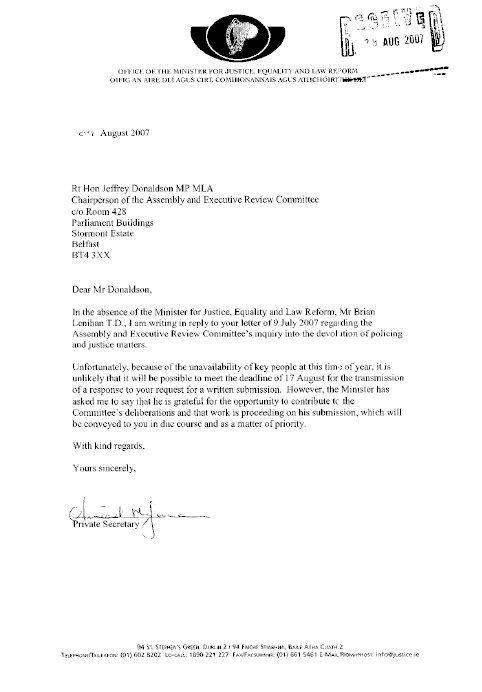
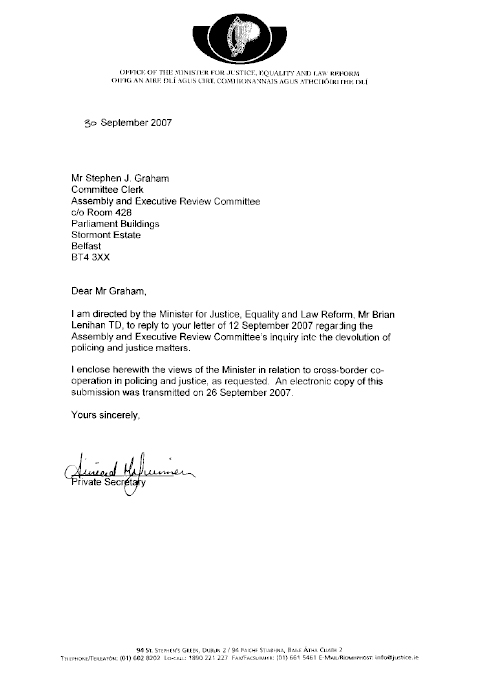
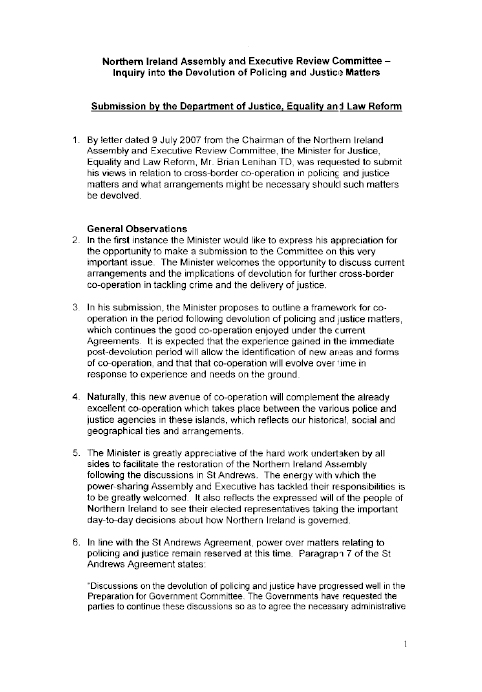
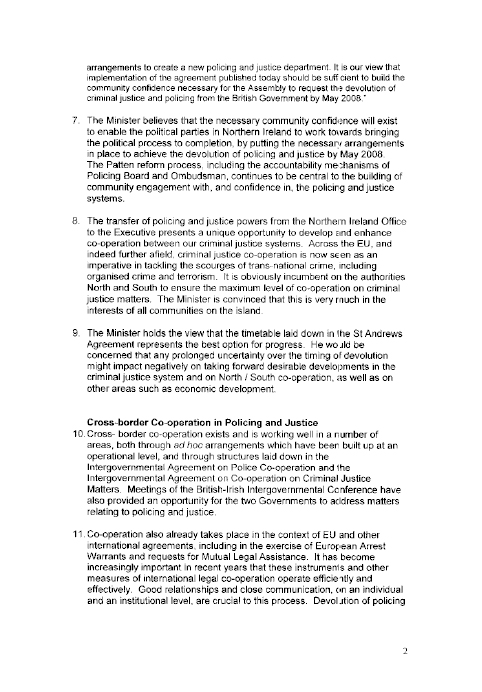
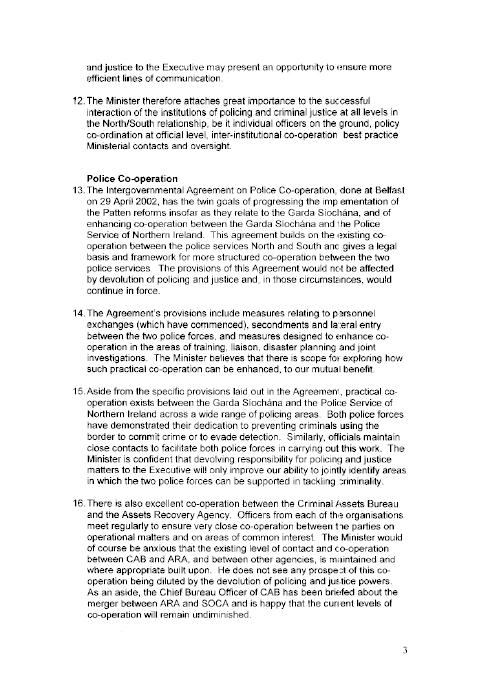
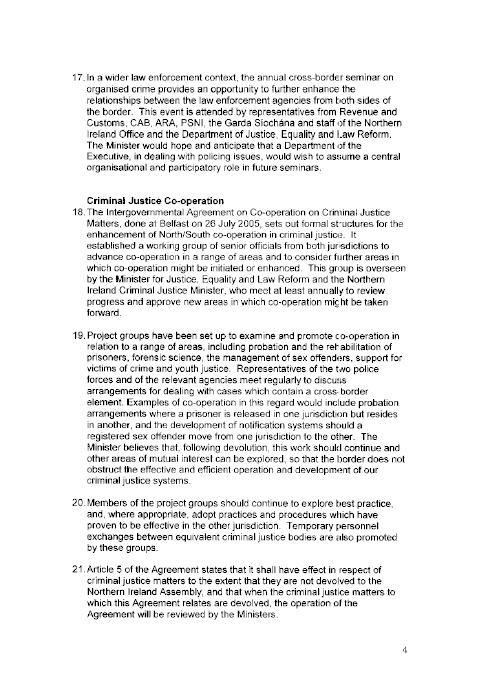
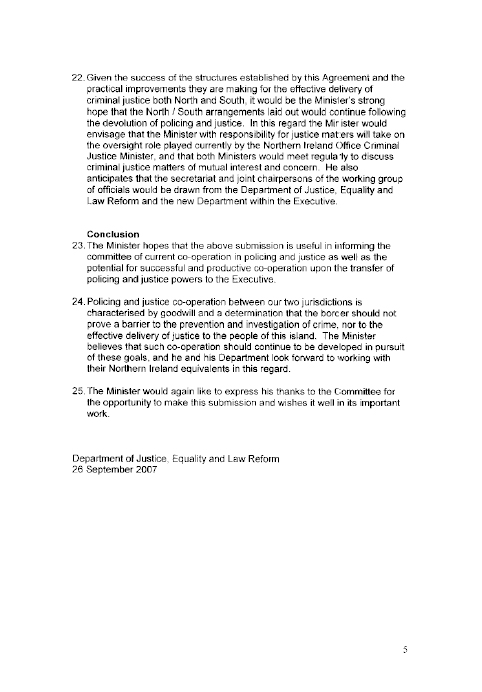
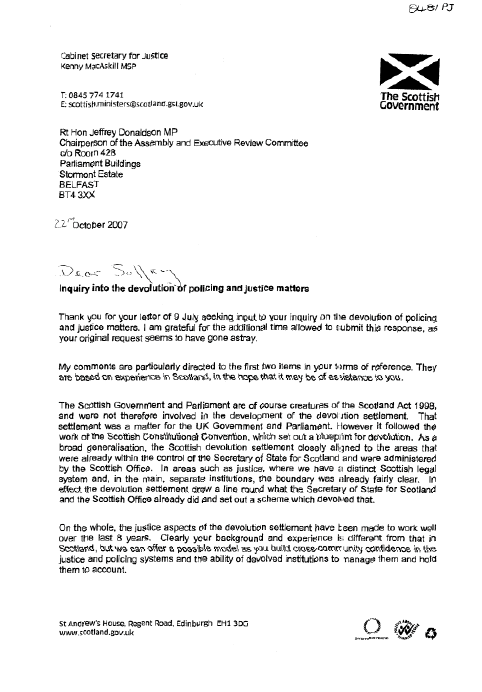
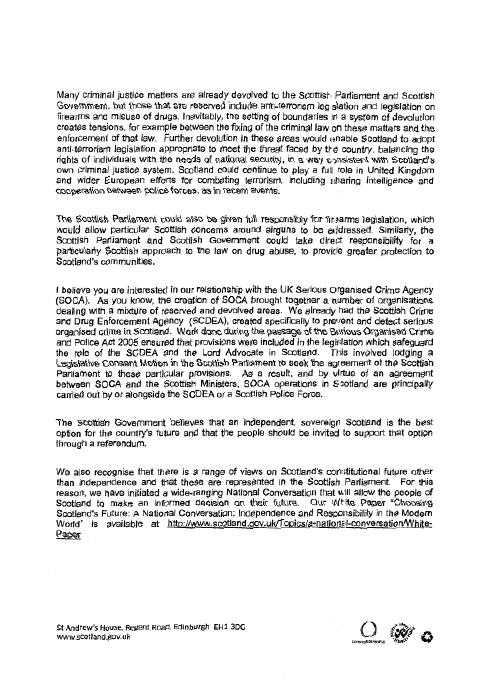
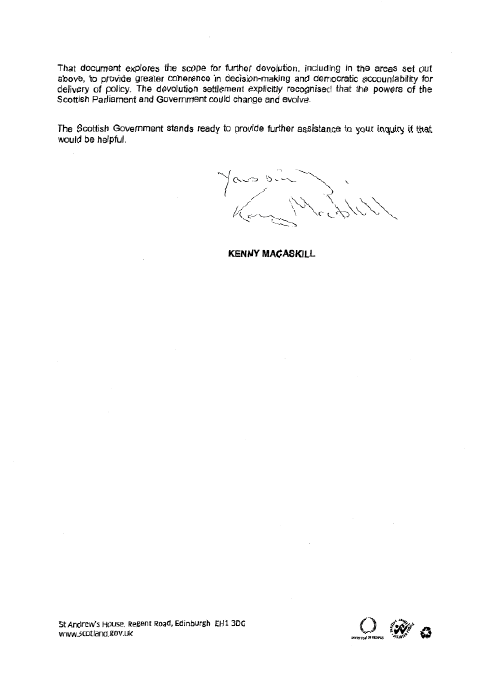
Party Position Papers
Alliance Party of Northern Ireland
Assembly and Executive Review Committee Response to
Inquiry on Devolution of Policing and Justice
August 2007
Introduction
Alliance believes that the recommendations of the Patten Commission represented a set of fair and realistic proposals for the creation of a single, professional police service for all of the people of Northern Ireland. These proposals have largely been implemented.
Furthermore, the Policing Board for Northern Ireland has been one of the institutional success stories for the Agreement. In fact, it is a good illustration of how bodies that are established on integrative principles can make a successful contribution to positive change within a deeply divided society.
Alliance takes the firm view that the Patten Commission report should be the conclusion of major reform of policing. Accordingly, there are not grounds for re-opening the wider debate on policing. However, Alliance does recognise that while the Patten Report was written in 1999, significant changes in the best practice of policing have occurred since then, and it is appropriate for these to be taken on board for Northern Ireland.
Devolution of Policing and Criminal Justice Powers
The devolution of policing and criminal justice powers to the Northern Ireland Assembly needs to be handled with great sensitivity. The nature of policing goes straight to the heart of people’s sense of security. More than any other aspect of current or potential devolved responsibilities, the conduct and control of policing has been at the heart of the political disputes and conflicts that have afflicted Northern Ireland.
Notwithstanding such problems, Alliance sees great potential in giving a sense of cross-community ownership of policing and criminal justice, through the devolution of such powers to the Assembly. Alliance has been a consistent advocate for devolution in this area.
Timing
The timing of the devolution of policing and criminal justice powers should be primarily determined by the correct conditions existing within society, not by an arbitrary timetable.
Alliance has been encouraged by signs that all parties in government are showing respect for the rule of law and exclusively peaceful and democratic means for achieving political objectives.
From the perspective of the Alliance Party, the necessary conditions will largely be determined by the ability of the Executive to operate in a cohesive, coherent and collective manner on all issues.
However, there is not yet sufficient evidence that ministers individually and the executive as a whole is operating in such a manner.
To date, there has been an absence of delivery on the critical issues facing Northern Ireland, including areas such as building a shared future, dealing with the past, victims, equality, education reform and decisions on public expenditure. The Executive has yet to formulate a Programme for Government and its own Budget. Furthermore, there is not yet any evidence of how effectively the Executive can respond to a major crisis that goes to the heart of the political differences of the parties in government.
Nevertheless, Alliance is prepared to consider a target of May 2008 for the devolution of these powers, provided that the appropriate conditions can be established.
Ideally, we would prefer a longer timeframe of two years, which was presumed in the 2004 ‘Comprehensive Agreement’.
However, in practice, before powers are devolved, a quadruple lock has to be addressed:
- a proposal to the Assembly by the First Minister and Deputy First Minister
- a cross-community vote in the Assembly;
- a certification by Secretary of State that the conditions are appropriate; and
- an affirmative vote in Parliament.
Alliance was active in the formulation of these steps and we support them.
Powers
Alliance is generally receptive to the proposed transfer of policing and criminal justice powers to a Northern Ireland Administration, as set out in the NIO’s Discussion Paper, “Devolving Policing and Justice in Northern Ireland”.
However, Alliance believes that there is a need for additional checks and balances to prevent a Minister trying, through either direct or indirect pressure, to influence the operational decisions taken by either the police or the prosecution service. This could be addressed through the Ministerial Code of Conduct and/or Pledge of Office.
Alliance recognises the need for some powers to be retained and exercised at a national level, and regards the list of those to be transferred as fairly expansive. While the UK is not a formal federal state, it is useful to note that in other federal or quasi-federal states, it is normal to see a split in powers between the national and regional level.
There is some concern at the lack of accountability of the UK-wide structures with respect to how they relate to Northern Ireland. Part of the solution rests with a more general reform of the UK structures for tackling terrorism, defending national security, dealing with organized crime and addressing other general policing issues.
Another related problem is the perception of different approaches and responsibility for continued Republican and Loyalist terrorism, with the former being addressed at the UK level and the latter at the NI level, based on the rationale that only the former is a threat to national security. Alliance would have major concerns at such a difference in approach. Part of the problem lies with a traditional view of terrorism. In practice the organizations involved have diversified into a wider range of paramilitary and organised criminal activity. The definition and parameters of the concept of terrorism need to be restored. In addition, there needs to be a greater understanding of the wider threat that paramilitary and organised crime poses to democracy and the rule of law.
Structures
The devolution of these powers to a Department that is part of a power-sharing Executive must be accompanied by significant changes in the mechanisms for accountability and collective responsibility within that Executive.
Alliance believes that there is great potential in giving a sense of cross-community ownership of policing and criminal justice, through the devolution of such powers to the Assembly.
In recent years, there have been many cases where certain parties, both unionist and nationalist, have failed to demonstrate an unambiguous commitment to the rule of law.
There is considerable sensitivity over power being placed in the perceived ‘wrong hands’. This perception for different people relates to some or all political parties across the spectrum.
In the worst-case scenario, a politicised Minister of Justice/Policing could seek to influence the operational decisions of the police with respect to parades or other contentious public order situations.
These fears can only be ameliorated within the appropriate institutional structures.
At present, the Executive structures are inadequate. There are few incentives for moderation and accommodation. Instead, once posts are allocated, Ministers have considerable discretion to take decisions within their own area of responsibility with little or no reference to Ministerial colleagues or the Assembly overall. While this situation is problematic with most policy portfolios, it would be disastrous with respect to policing and criminal justice.
This approach amounts to power division, not power-sharing. Ministerial posts are distributed according to the lottery of the d’Hondt procedure leading to ministers from certain parties having a large degree of say over particular departments. However, with respect to each portfolio, people right across the spectrum have a deep interest in the decisions taken. Unionists do not lose all interest in, for example, education issues if that department happens to be headed by a nationalist. Similarly, nationalists do not lose all interest in, for example, economic development issues if that department happens to be headed by a unionist.
Structures must be put in place that both recognise and facilitate the genuine interest and concern that exist right across the community.
It is likely that the eventual structures for handling policing and criminal justice will come under serious strain in the event of major civil strife or public disorder, possibly linked to the matter of contentious parades. For this reason, the structures need to be sufficiently robust. Furthermore, there is a strong case for the Executive demonstrating its ability to govern successfully, and also react to politically sensitive issues on the ground, before such powers are formally transferred.
Alliance does not believe that any of the structures offered in the Joint Declaration, the subsequent NIO Consultation Paper, or the ‘St. Andrews Agreement’ legislation provides an ideal way forward.
We welcome the Preparation for Government Committee’s support for a single Department of Justice, but the problems of a lack of accountability and collective decision-making remain to be addressed.
These dangers would be substantially mitigated if that Department was part of an Executive working on the basis of collective responsibility. The Minister in question would be allocated his or her portfolio as part of inter-party negotiations, serve with the confidence of the Assembly, operate to collective responsibility, and could be removed from office (either with or without the collapse of the entire Executive) in the event of a major breach of faith.
Even if there is not full collective responsibility in the Executive, there has to be collective decision making on Justice issues, if there is to be community confidence.
Alliance would also express its alarm that the British Government have legislated to ensure that only an MLA coming from either of the two largest designations in the Assembly, in effect only a unionist or a nationalist can take the policing and justice portfolio. While there are only parties from two designations who are eligible for ministerial appointment at this stage based on the current workings of the d’Hondt formula, it is conceivable that a party from a different designation could qualify for a place in government. If so, they would be eligible to be nominated to any portfolio except for policing and justice. This is a form of institutionalised discrimination and represents a breach of human rights.
Finance
To date, there has been little or no discussion of the financial implications of the devolution of policing and justice to the Assembly.
The cost of funding the PSNI each year is over £800m, and the cost of prisons is at least another £100m. These costs are considerable, and would mark a significant addition to the resource responsibility passed to the Assembly. It must be borne in mind that policing and security costs in Northern Ireland are running well ahead of the UK average. Undoubtedly, there is a clear need and political desire to maintain much of the current level of service given the particular circumstances of Northern Ireland. However, this may prove increasingly difficult to do so in the context of rising costs, financial pressure from the Treasury, and the competing demands within Northern Ireland. Therefore, Alliance believes that financial arrangements need to become one of the key issues for discussions between the Executive and the British Government, as a matter of urgency.
Democratic Unionist Party
%20DUP-1_fmt.jpeg)
%20DUP-2_fmt.jpeg)
Progressive Unionist Party
%20026.PJ%20PUP_fmt.jpeg)
17th August 2007
Dear Mr Donaldson
Further to your letters of 9th and 31st of July 2007 regarding your committee’s enquiry into the devolution of policing and justice matters, it is the belief of the Progressive Unionist Party that all policing and justice matters except those linked to or concerning matters of national security should be devolved fully to the Northern Ireland Assembly.
Although we would like devolution to occur as quickly and as smoothly as possible we believe that sufficient confidence needs to be built within the community and therefore the conditions for devolution are more important than the date.
A single department headed by two ministers (one Unionist and one Nationalist) with decisions requiring the agreement of both would help build public confidence in the cross community accountability of the department.
The new Department for Policing and Justice should be allocated under the D’Hondt system with the ministerial position being deemed filled once it has been selected by one Unionist and one Nationalist.
I hope this clarifies my party’s position on the matter.
Yours sincerely
Dawn Purvis MLA
DEDICATED TO AN ANTI-SECTARIAN, PLURALIST AND EQUITABLE SOCIETY
Sinn Féin
%20SF-1_fmt.jpeg)
%20SF-2_fmt.jpeg)
%20SF-3_fmt.jpeg)
SDLP
31 August 2007
Mr. Jeffrey Donaldson, MP, MLA.,
Chair,
Institutional Review Committee,
Room 428,
Parliament Buildings,
Stormont,
Dundonald,
Belfast.
Dear Chair,
Re: Inquiry into Devolution of Justice and Policing.
I enclose SDLP Preliminary Submission to the above Inquiry.
Yours faithfully,
Alex Attwood,
SDLP Assembly Member,
WEST BELFAST.
The Devolution of Justice
SDLP Paper
1) Devolution – As Quickly as Possible
- The SDLP believes the devolution of justice should occur as quickly as possible. It means the Assembly being able to pass its own laws on justice matters and the justice minister(s) taking control of the justice budget to ensure that it is well spent.
- The SDLP recommends all parties recognise that very substantive powers once in the hands of the NIO have now in reality been devolved – to the Policing Board and new policing arrangements. Also, parties should be clear that a Minister(s) for Justice should not be able to direct the police – there is a potential for certain parties to seek such powers. This would be a deeply serious development and run grave risks.
- The SDLP believes that there is a residual risk that some in the republican community may hold back on policing and not establish proper and reasonable relationships with the police pending the devolution of justice, both to have political leverage and for tactical reasons. This should not be tolerated.
- Equally, the DUP should be honest about the devolution of justice, not use it as a bargaining chip and create false timeframes. As Peter Robinson wrote in the Irish Times in 2004, the devolution of justice is “no big move for unionists.” There is therefore no justification for delaying its implementation.
2) A Better Approach
- The SDLP argued that a devolved minister(s) for justice should have been appointed upon restoration. He or she would immediately have had the following devolved functions:
- Office of Law Reform.
- Office of the Legislative Counsel.
- Legal services, pending creation of Attorney General for Northern Ireland.
- Appointments to tribunals.
- Freedom of Information.
- Assembly Ombudsman/Commissioner for Complaints.
- Negotiation of protocols for devolution, including with MI5.
- Nolan standards.
In addition, he or she would have been charged with making preparations for the devolution of justice, bringing forward proposals to the Executive and also working with a Justice Committee of the Assembly. He or she would also, of course, receive currently reserved justice powers when devolved. This option, which would have given more rigour to the devolved institutions, was not agreed.
3) Selection of Ministers
- The SDLP is open to discussing all the models for the selection of ministers. Given the need for economy and the fact that the majority of the functions of the justice minister will be uncontroversial, on balance, our preference is for the ministerial office to be allocated out under d’Hondt.
- There is also a need for clarification on the ‘Hain devolution proposal’ including the following:
- What the British Government intends to do in the event that devolution is not agreed in or around May ’07. (In any case, there is the likelihood that Sinn Fein and DUP will have a sweetheart moment and divide justice and policing between themselves in the Office of FM/DFM or some shared ministry model).
- The status of the Hain ‘nomination proposal’
- The danger of new devolution legislation being piggy backed by others for narrow reasons
- Issues around the running of d’Hondt, what qualifies as a d’Hondt pick etc.
4) Dup Veto
- The SDLP is concerned at the veto acquired by the DUP over the devolution of justice as a result of the failed SF/DUP Comprehensive Agreement and as provided for in section 4(2A) of the Northern Ireland Act 1998, inserted by the Northern Ireland (Miscellaneous Provisions) Act 2006.
The SDLP believes that this veto should be removed so that all that is required to devolve justice powers is cross-community support – as was originally the case under the Northern Ireland Act, 1998.
5) Number of Departments
- As before, the SDLP believes that there should be one Department of Justice and Law Reform only – as opposed to separate departments of justice/law reform and policing.
6) Timing of Devolution
- With the appointment of a minister(s) for justice in advance of devolution, the SDLP believed that it would have been possible to achieve the devolution of justice earlier than would otherwise be the case. In the circumstances that now prevail the SDLP submits that a date for the next May is essential. The SDLP believes the political and community confidence exists for this to happen and delay would put both in some degree of jeopardy.
7) Cross-Community Protections
- Cross-community protections must be agreed for a limited number of statutory functions. These include the power to override the Parades Commission, the power to veto Policing Board reports and inquiries and the power to veto 50/50 recruitment. The SDLP believes that it is desirable that these sensitive matters should be devolved and look forward to probing how this can be best achieved.
8) Equality
We do not believe that equality should be included among the functions of the Department of Justice and Law Reform. Equality should be mainstreamed by keeping it in the same Department as the Executive Secretariat. That ensures more leverage over all departments to ensure that they follow the equality agenda.
9) North South Justice and Policing
- Transfer of justice must have a strong North/South dimension agreed upfront. The fact that the current British/Irish Intergovernmental Agreement on Justice co-operation “falls” with the devolution of justice is of concern. The SDLP submits that in the period up to next May, agreement must be sought on the following matters:
(i) the current elements of the Inter-Governmental Agreement retained;
(ii) the further areas of development and co-operation that may be emerging under the Inter-Governmental Agreement incorporated into the Agreement; and
(iii) the other areas of justice co-operation outlined below should be worked up and incorporated into a new Justice Co-operation Agreement between the Northern Ireland Assembly and the Dail going “live” on the day of devolution.
- We also call for the creation of a new Justice sector of the NSMC, including co-operation and implementation issues and regular intersectoral meetings involving policing issues on matters such as child protection and drugs.
- In particular, there should be further initiatives on current North/South cooperation on criminal justice and policing through, for example:
- An All-Ireland Criminal Assets Bureau, modelled on the Criminal Assets Bureau in the South, to deprive criminals of their wrongful gains across the island. This issue has become more acute with the end of the ARA as an independent agency and the primacy of SOCA
- An all-Ireland Law Commission to research and promote harmonisation of laws.
- All-Ireland police training at the new police training college.
- North/South police personnel exchanges in the agreed areas.
- An all-Ireland Sex Offenders register or appropriate variation of this model.
- Building on current arrangements for criminal justice and policing cooperation.
- An all-Ireland Intelligence Agency serviced by a joint PSNI and Garda unit to combat crime and terrorism North/South. This could be a very important development in terms of all-Ireland policing.
10) Protection for Patten Institutions
- The SDLP strongly believes that following devolution, there should be no reduction in the role and authority of Policing Board, Police Ombudsman and DPPs respectively. The policing institutions have been the best achievement of the Good Friday Agreement. They have been the cornerstone of stability and progress in the uncertain times of recent years. That is why the agreement of the parties at the Justice sub-group of the Preparation for Government Committee last year that there should not be encroachment on the authority of the policing institutions was welcome and important.
However, the SDLP has concerns that there is or shall be a tendency for certain parties to centralise power in the Executive in OFM/DFM or Justice Ministry. The SDLP warns against any such outcome which is prejudicial to good policing and proper government.
11) Continued Implementation of Patten and Cjr Changes
- Patten and Criminal Justice Review to continue to be implemented pending and post transfer.
The Inquiry may also wish to consider if there are criminal justice matters which need consideration such as:
- Giving of reasons for failure to prosecute or dropping of charges
- The leadership of the PPS office
- Delays in the prosecution service
- Relationships between the PPS and PSNI
12) Co-Operation by British Government
- British Government needs to facilitate work by parties in preparation for devolution by sharing all relevant information – including on proposals for MI5’s expansion. For this reason, the recent attendance at the sub- committee of NIO officials was welcome.
This issue is further addressed in paragraph 15.
13) Transfer of National Security to Mi5
It is anticipated that the transfer of national security to MI5 shall occur in the Autumn of 2007. The SDLP opposed this development for a range of reasons including:
- The absence of proper oversight, accountability and complaints mechanisms
- The likelihood of “mission creep” by MI5
- The deepening of MI5 power
- The risk to the authority of the devolved institutions
Some claim that a Tony Blair commitment that there shall be “separation” of MI5 from civic policing addresses their concerns. This was a political fix and a grave folly for a number of reasons including:
- Issues of oversight, accountability and complaint remain unresolved
- It ignored the issue that some ex RUC Special Branch around whom there are concerns may be recruited full time or as consultants into MI5
- It created the political space for the British Government to do what it wants without being checked
- The commitment is all about words without real substance and is contradictory on a range of grounds, including the fact that PSNI officers will work out of the new MI5 headquarters at Holywood, sharing space and offices with MI5
The Inquiry of the sub-committee might address the issue of transfer of primacy for national security in the following way:
- Seek political agreement about new and demanding accountability, complaints and oversight mechanisms in respect of MI5
- Ensure that the Assembly structures have a real and meaningful role and standing in relation to MI5 activity in the North
- Work up in detail the communication relationship between the British Government and MI5 with the Assembly, a Policing and Justice Committee, Justice Minister(s) and Executive
- Guarantee that the Police Ombudsman has full access, without conditions, to all information held by the security services and full access to all MI5 staff in order to fulfil her statutory functions
- Work with the Policing Board to create mechanisms of “real-time” monitoring and oversight of the interface and working relationship between MI5 and PSNI, with guarantee of full access to intelligence
- Ensure that any protocols, memorandum or other material has been independently reviewed and verified against human rights requirements
This issue has the potential to de-stabilise the political institutions and diminish political and policing confidence.
14) Serious Organised Crime Agency (Soca)
To a significant degree, the issues around the Security Service extend to the future role of SOCA generally and the merger of the ARA with SOCA in particular.
There is a strategic risk that in future the security service will deal with international/domestic terror threat, SOCA will deal with organised crime and the serious end of the criminal spectrum generally and the PSNI deal with other serious crime and volume crime only. This is an unbalanced relationship, disregards the fact that the PSNI are best placed to deal with all aspects of crime and can have political and community fallout.
The Inquiry may therefore consider:
(i) Ensuring the Police Ombudsman has full powers in relation to SOCA complaints
(ii) As SOCA accounts through the Home Secretary, there is an imperative for the Assembly structures enjoy a proper and robust accountability role
(iii) Determine if the end of the ARA means that lower and mid level criminals and gangs are less vulnerable to detection and prosecution.
15) Ni (St. Andrews Agreement) Act 2006
Clearly, immediate work is required to fulfil the requirements of the 2006 Act. The SDLP refers to the paper on ‘Devolution of Justice and Policing for Assembly and Executive Review Committees’ which outlines NIO consideration on this issue. There are a number of particular matters, logistical, political and policy in nature that should be highlighted including:
- does the Committee require additional staff capacity to fulfil the requirement of the 2006 Act
- how does the Committee plan to work through relevant matters with NIO officials and British Government Ministers, in what format and to what detail
- shall the Committee have sight of all protocols, memorandum and relevant correspondence to reassure itself that the Assembly interest is properly protected
- the ongoing issues of timing of devolution, structure, number of overall ministerial offices etc.
- the crucial issue of funding and budget guarantees, including any proposals to cut police numbers/budget, mindful, for example, of the emerging concerns about resources and priority around addressing organised crime further to the end of the ARA
- sight of draft legislation required for devolution to occur
- how the devolved and non devolved interface shall work generally and crucially around national security
- transfer of staff and other corporate issues
- determination of what shall actually occur at the time of devolution and if there are plans to defer, delay, slow down or otherwise create doubt about the range and nature of what is devolved.
Ulster Unionist Party
%20UUP-1_fmt.jpeg)
%20UUP-2_fmt.jpeg)
DUP
-1_fmt.jpeg)
-2_fmt.jpeg)
-3_fmt.jpeg)
Sinn Féin
%20SF-1_fmt.jpeg)
%20SF-2_fmt.jpeg)
SDLP
The Devolution of Justice/SSLP Paper to the Assembly and Executive Review Committee
1) Introduction
The SDLP believes the devolution of justice should occur as quickly as possible. This would mean the Assembly being able to pass its own laws on justice matters and the Justice Minister(s) and Assembly taking control of the justice budget to ensure that it is well administered. This is graphically highlighted by the fact that the Assembly has forwarded a response to a wide ranging Justice Bill to the NIO, when the NIO can potentially disregard the views of the Assembly on critical issues.
The SDLP recommends that all parties recognise that very substantive powers, once in the hands of the NIO, have already been devolved – to the Policing Board and new policing arrangements. In this regard, parties should be clear that a Minister(s) for Justice should not be able to direct the police – there is a potential for certain parties to seek such powers. This would be a deeply serious development and run grave risks.
The SDLP believes that there is a residual risk that some in the “republican community” may hold back on policing and not establish proper and reasonable relationships with the police pending the devolution of justice, both to have political leverage and to maintain their influence. This should not be tolerated.
Equally, the DUP should be forthcoming about the devolution of justice, not use it as a bargaining chip and create false timeframes. As Peter Robinson wrote in the Irish Times in 2004, the devolution of justice is “no big move for unionists.” There should, therefore, be no undue impediment to the devolution of justice powers.
2) A Better Way
For the record, the SDLP argued that a devolved Minister(s) for Justice should have been appointed upon restoration in May 2007. He or she (they) would have had the following devolved functions at that time.
- Office of Law Reform.
- Office of the Legislative Counsel.
- Legal services, pending creation of Attorney General for Northern Ireland.
- Appointments to tribunals.
- Freedom of Information.
- Assembly Ombudsman/Commissioner for Complaints.
- Negotiation of protocols for devolution, including with MI5.
- Nolan standards.
In addition, he or she (they) would have been charged with assisting preparations for the devolution of justice, bringing forward relevant proposals to the Executive and also working with a Justice Committee of the Assembly. He or she (they) would also, of course, receive currently reserved justice powers when devolved. This option, which would have given more rigour to the devolved institutions, was not agreed.
3) DUP Veto
The SDLP is concerned at the veto acquired by the DUP over the devolution of justice as a result of the failed SF/DUP Comprehensive Agreement and as provided for in section 4(2A) of the Northern Ireland Act 1998, inserted by the Northern Ireland (Miscellaneous Provisions) Act 2006.
The SDLP believes that this veto should be removed so that what is required to devolve justice powers is cross-community support – as was originally the case under the Northern Ireland Act, 1998.
4) Selection of Ministers
The SDLP remains open to discussing all the models for the selection of ministers. Given the need for economy, the fact that substantial policing functions already fall to the policing arrangements etc., on balance, the SDLP preference has been for the ministerial office to be allocated out under d’Hondt. However, the SDLP notes the arguments for a shared Ministry, in order to establish confidence etc. and remains prepared to consider further this option.
There is also a need for clarification on the ‘Hain devolution proposal’ including the following:
- What the British Government intends to do in the event that devolution is not agreed in or around May ’07.
- The status of the Hain ‘nomination proposal’.
- Issues around the running of d’Hondt under the Hain model, what qualifies as a d’Hondt pick etc.
The SDLP hope that whatever model emerges, the model is agreed between the parties given that the model will impact on the shape of and participation in the Executive and on Executive parties in particular.
5) Number of Departments
The SDLP believes that there should be one Department of Justice and Law Reform only – as opposed to separate departments of justice/law reform and policing respectively.
In particular, the SDLP notes the evidence of a number of organisations to the Assembly & Executive Review Committee that it would be unwieldly and burdensome for justice and policing functions to be undertaken by OFM/DFM, rather than co-located in a single, freestanding ministry.
6) Timing of Devolution
With the appointment of a minister(s) for justice in advance of devolution of justice powers, the SDLP believed that it would have been possible to achieve the devolution of justice earlier than would otherwise be the case.
In the circumstances that now prevail the SDLP submits that a date of May 2008 is essential. The SDLP considers that the sharing of responsibility at the Executive table, in the Assembly, at the Policing Board and on DPP’s etc. means that a threshold of confidence has been attained and devolution should follow. On this basis, a May 2008 date is appropriate.
However, one enduring issue is the nature and quality of justice that should be anticipated and required, be it pre or post-devolution. Against this measure, given the Robert McCartney and Paul Quinn murder investigations and other matters, the standard of justice that should be in place on all cases and for all citizens is not. This needs to be addressed fully and without doubt.
7) Cross-Community Protections
Cross-community protections must be agreed for a limited number of statutory functions that are currently ‘reserved’ but which may be transferred. These include the power to override decisions of the Parades Commission, the power to veto Policing Board requests for reports and inquiries and the power to veto 50/50 recruitment. The SDLP believes that it is desirable that these matters should be devolved and will continue to work to achieve the devolution of these matters with community safeguards.
A particular issue arose in respect of an “advisory” role for OFM/DFM/Minister(s) in relation to public appointment such as a future Police Ombudsman. The SDLP believes that in relation to defined, profile public appointments where they may be heightened public interest, the Executive may be involved to advise or approve the public appointments.
8) North South Justice
Transfer of justice should have a strong North/South dimension and this should be agreed upfront. The fact, therefore, that the current British/Irish Intergovernmental Agreement on Justice Co-operation “falls” with the devolution of justice is of concern. The SDLP submits that in the period up to May 2008, the following matters should be considered:
(i) the retention of the current elements of the Inter-Governmental Agreement and having some in place immediately following devolution;
(ii) any further areas of development and co-operation that are emerging under the working of the Inter-Governmental Agreement should be incorporated in a new Agreement, in place immediately following devolution;
(iii) In particular, the areas of justice co-operation outlined below should be worked up and incorporated into a new Justice Co-operation Agreement between the Northern Ireland Assembly and the Dail going “live” immediately following devolution.
We also call for the creation of a new Justice sector of the NSMC, including co-operation and implementation issues and regular intersectoral meetings involving policing issues on matters such as child protection and drugs.
In particular, there should be further initiatives on North/South cooperation on criminal justice and policing through, for example:
- An All-Ireland Criminal Assets Bureau, modelled on the Criminal Assets Bureau in the South, to deprive criminals of their wrongful gains across the island. This issue has become more acute with the end of the ARA as an independent agency and the primacy of SOCA (see paragraph 13 below)
- An all-Ireland Law Commission to research and promote harmonisation of laws and, in the interim, a joint programme of work between the two Law Reform Commissions, North and South.
- An all-Ireland Sex Offenders register or appropriate variation of this model.
- Building on current arrangements for criminal justice co-operation.
- An all-Ireland Intelligence Agency serviced by a joint PSNI and Garda unit to combat crime and terrorism North/South.
9) North-South Policing
The SDLP anticipates that the current arrangements governing policing co-operation between the PSNI and the Garda should continue without interruption following devolution of policing powers.
The SDLP submits that this work requires “a gear shift” as, on certain matters, little progress has been forthcoming following the Patten recommendations. In particular, the continued failure to finalise lateral entry provisions between the two police services is a matter of frustration. In addition to the matters identified in the Patten Report, the SDLP would emphasise:
- Garda training at the proposed new Police College near Cookstown
- Joint training at the Police College for emergency situations etc.
- An all Ireland Intelligence Agency, serviced by a joint PSNI/Garda Unit to combat crime and terror in North and South
- Measures to address organised crime (see section 13)
10) Protection for Patten Institutions
The SDLP strongly believes that, following devolution, there should be no reduction in the role and authority of the Policing Board, Police Ombudsman and District Policing Partnerships respectively. The policing institutions have, arguably, been the most significant achievement of the Good Friday Agreement. They have been the cornerstone of stability and progress in the uncertain times of recent years. That is why the agreement of the parties at the Justice sub-group of the Preparation for Government Committee last year that there should not be encroachment on the authority of the policing institutions was welcome and important.
However, the SDLP has concerns that there is or shall be a tendency for certain parties to gather and centralise power in a future Justice Ministry. The SDLP warns against any such outcome which is prejudicial to good policing and proper government. That is why the protocols that are in development around the relationships between the devolved arrangements and the policing structures should be made available as soon as possible for consideration by the Committee and parties.
The SDLP believes that MLA’s should continue to be appointed to the Policing Board, as recommended by Patten. Patten correctly identified that sharing political responsibility for the conduct and oversight of policing was important in creating community confidence. This argument endures, particularly as this is still on early phase in the operation of the policing arrangements. Moreover, sharing responsibility at a local Council level (DPP’s) and at a Board level (MLA’s) have proven the legitimacy of the Patten argument.
In order to avoid a conflict of interest between the Policing Board and the Assembly, MLA’s should not sit on an Assembly Policing Scrutiny Committee. In addition, MLA’s who are District Councillors should not sit on DPP’s, or if they do, should not sit on an Assembly Scrutiny Committee.
11) Continued Implementation of Patten and Cjr Changes
It is necessary to confirm that, pre and post devolution: The conclusion of the Patten Review and Criminal Justice Review need ongoing implementation.
The Inquiry in its final report may also wish to consider or, at a minimum, “flag up” if there are criminal justice matters which need further consideration such as giving of reasons for failure to prosecute or where charges are dropped, mindful of the agreement between the parties at the Preparation for Government Committee in 2006 in relation to the matter.
12) Transfer of National Security to Mi5
Transfer of responsibility for national security in Northern Ireland was transferred to MI5 from the PSNI in the Autumn of 2007. The SDLP opposed this development for a range of reasons including:
- The absence of proper oversight, accountability and complaints mechanisms
- The likelihood of “mission creep” by MI5
- The deepening of MI5 power generally
- The risk to the authority of the devolved institutions, including the policing arrangements.
It is claimed that a Tony Blair commitment that there shall be “separation” of MI5 from civic policing addresses their concerns. This was a political fix and a grave folly for a number of reasons including:
- Issues of oversight, accountability and complaint remain unresolved
- It ignored the issue that some ex-RUC Special Branch around whom there may be concerns could be recruited full time or as consultants into MI5
- It created the political space for a British Government Agency to do what it wishes without being subject to proper check, balance and accountability
- The commitment by the then Prime Minister is all about words without real substance and is contradictory on a range of grounds, including the fact that PSNI officers will work out of the new MI5 headquarters at Holywood, sharing space and offices with MI5
The Inquiry of the Committee should attempt to address the issue of transfer of primacy for national security in the following way:
- Seek political agreement about new and demanding accountability, complaints and oversight mechanisms in respect of MI5
- Ensure that the Assembly structures have a real and meaningful role and standing in relation to MI5 activity in the North. That is why the documents that have and are being prepared in relation to what type of information shall be shared on issues with a national security dimension in the policing and justice field need to be shared with the Committee and parties as quickly as possible
- Work up in detail the communication relationship between the British Government and MI5 with the Assembly, a Policing and Justice Committee, Justice Minister(s) and Executive
- Guarantee that the Police Ombudsman has full access, without conditions, to all information held by the security services and full access to all MI5 staff in order to fulfil his statutory functions
- Ensure that any protocols, memorandum or other material has been independently reviewed and verified against human rights requirements
- The content of any protocols, memorandum or other material is available for consideration by the Committee and the parties, including how the process will work about what the Chief Constable will or will not be able to share with the Minister(s) where issues arise which are of interest to the devolved institutions
This issue has the potential to de-stabilise the political institutions and diminish political and policing confidence. The Committee should actively address the matter.
13) Serious Organised Crime Agency (“Soca”)
In April 2008, the Assets Recovery Agency (“the ARA”) in the North will merge with the Serious & Organised Crime Agency (“SOCA”). The ARA in Northern Ireland is generally regarded as the most successful sector of the ARA organization. Whatever about the record of SOCA in Britain, the “end” of the ARA in the North has raised concerns, which endure. In essence, the concern is that the levels of organized crime in Northern Ireland, while big in regional terms, may not register high in the hierarchy of organized crime and which may attract the interest of SOCA.
More specifically, the concerns are four-fold:
A) While the statutory mandate of SOCA post -April 2008 requires the organization to address organized crime generally, there is a view that it will, for self-evident reasons, address terror financing and higher level domestic and international organized crime.
B) The consequence of (A) above will see energy and money “drift” or be directed towards the higher range of the organized crime threat
C) The background of the senior management of SOCA – believed to come from security service retirees – compounds the risk outlined in (A), whereby senior management may concentrate on higher level of organized crime, particularly international terror links and money.
D) The PSNI have developed their economic crime capacity. However, with demands at a community level, the potential for downsizing post 2010-11, questions around the capacity of the PSNI Crime Unit etc., it may be a hard ask for the PSNI to fill the gap left by the end of a dedicated ARA organization.
The SDLP submits that the Review should acknowledge the concerns and the threefold risks:
i) There have been reassurances at the time of the announcement of an enlarged SOCA and since that the regime change would not witness any decline in efforts against organized crime in Northern Ireland. However, with the process of time and the future sources of terror/international threat, there may be a decline in resources and strategy to address regional organized crime
ii) The ARA in Northern Ireland and Criminal Assets Bureau (“the CAB”) in the Republic of Ireland have a significant and successful relationship. As organized crime does not respect borders, any decline in resources and strategy in the North is likely to impact on the continued requirement to address organized crime on an all island basis
iii) In particular, any reduced effort to recover the criminal assets of the paramilitary organizations, will be hostile to dealing with our past in the most positive way possible, could see the assets of organized crime be deployed in a way that compromises national democracy, and, in any case, it is an intolerable outcome that assets gained by criminal enterprise should be retained.
The SDLP therefore recommends the Committee to:
A) Acknowledge the concerns outlined and the present and future risks that arise;
B) Recommend that the government of the Republic of Ireland and the Executive in the North seek guarantees that resources, staffing, strategy and priority will not be diminished in the arrangements that emerges post 1 April 2008;
C) Recommend that the Northern Ireland Assembly and Executive consider at an early date to creation of a dedicated, new model Assets Agency in the North or, as the SDLP would particularly urge, the creation of an all island Assets Agency;
D) Recommend to the Republic of Ireland Government the Northern Ireland Government, the PSNI, Gardai Siochona and the CAB further identifies any strategic gaps that may arise post 1 April 2008 with the primacy of SOCA;
E) Ensure the Police Ombudsman for Northern Ireland has full powers in relation to SOCA complaints;
F) Determine what information will be shared by SOCA with the Assembly, Minister(s), Scrutiny Committee and work to ensure the full exchange of appropriate information.
14) The Court Service
The future arrangements for the Northern Ireland Court Service is a matter that has invited very different view points. The SDLP has an appreciation for the argument that an “arms length model” is appropriate, inter alia, to guard against the risk of encroachment on the independence of justice and policing structures, including the independence of the Judiciary.
Conversely, there is substance in the argument that the Agency model outlined by the NIO would, inter alia, assist a culture change to enable heightened communication and cohesion between those responsible for the administration of justice. In addition, a third option – a hybrid approach – was outlined by the Chief Executive of the Northern Ireland Civil Service.
The SDLP continues to consider which model is most appropriate but would submit at this stage:
- Policy and legislative support functions should transfer to the Department
- Whatever model is eventually adopted, a management Board would be required to include representatives of the judiciary, legal profession, trade unions, victims and business representatives
15) Ni (St. Andrews Agreement) Act 2006
The SDLP refers to the paper on ‘Devolution of Justice and Policing for Assembly and Executive Review Committee’ which outlines the NIO consideration on this issue. There are a number of particular matters, logistical, political and policy in nature that should be highlighted (confirmed by the evidence of the Head of the Northern Ireland Civil Service to the Committee) including:
- shall the Committee have sight of all protocols, memorandum and relevant correspondence referred to in the NIO Paper to reassure itself that the Assembly interest is properly protected
- Is the Committee able to say in its report that the managerial and administrative matters necessary for, say, a May devolution date are in place
- the crucial issue of funding and budget guarantees, including any proposals to cut police numbers/budget, mindful, for example, of the emerging concerns about resources and priority around addressing organised crime further to the end of the ARA. The NIO should be asked to provide details of future baselines by business area further to the 2008-2011 CSR.
- sight of draft legislation required for devolution to occur, which the NIO has stated it is prepared to share.
- how the devolved and non devolved interface shall work generally and crucially around national security.
- transfer of staff and other corporate issues
- determination of what shall actually occur at the time of devolution and if there are plans to defer, delay, slow down or otherwise create doubt about the range and nature of what is devolved.
16) The Role of the Advocate General
In the event of devolution of justice, it will fall to the Advocate General to offer advice to the Director of the Public Prosecution Service in relation to “excepted matters”. This will include national security and other serious issues.
It is important that the Minister(s) for Justice is sighted, as appropriate, on relevant matters, particularly those of public interest and concern where the Attorney General gives advice. For example, in the summer of 2006, the parties at the Programme for Government Committee unanimously agreed that there was a requirement for the Public Prosecution Service to give reasons. This was an indication of the need for more public transparency in the conduct of the Public Prosecution Service. However, as the Advocate General will advise on excepted matters, the Justice Minister(s), Assembly etc. has no authority or standing, even on profile cases, in the excepted field.
Accordingly, protocols will be required to enable relevant information to be shared with the devolved side where the Advocate General gives advice to the Public Prosecution Services on an excepted matter, particularly on profile matters. It is acknowledged that there are issues where the Attorney General and Advocate General are required to consult by statute. Moreover, the NIO have added that “there are sure to be issues which arise in the course of normal business. However, the Committee and parties need to be sighted on how the future arrangements will work and how information to the necessary standard will be shared.
17) Public Prosecution Service
Issues of confidence in the Public Prosecution Service have historically been acute and can best be addressed in a major reshaping of the structures in and around the office.
The SDLP considers that a discussion is required around the future shape of the Public Prosecution Service, including the creation either of Policing Board models of accountability and oversight or an enhanced role for the Assembly Scrutiny Committee, for example, in areas of policy and practice. This would be a more meaningful oversight than being answerable to a Committee in relation to financial and administration matters only.
The SDLP looks forward to devolution of justice to enable this discussion to arise. In the interim, the SDLP considers that, consistent with the current legal framework, there should be a maximalist approach to “oversight” of the Public Prosecution Service. Under the current law, the Public Prosecution Service answers to the Assembly in relation to finance and administration. As outlined above, the SDLP considers this is insufficient. Models f higher oversight – be it through an Assembly Committee or Policing Board models – shall be necessary. Clearly, this would not compromise the operational responsibility of the Public Prosecution Service, but would create deeper oversight of policy and practice in the Public Prosecution Service.
In particular, the SDLP believes that funding for the Public Prosecution Service shall be from within the budget of the Justice Ministry rather than OFM/DFM is preferable. This option was favoured by the Criminal Justice Inspectorate. A dedicated Justice Ministry is more likely to enjoy understanding and insight into the Public Prosecution Service and ensure that issues of efficiency, effectiveness and value for money are addressed.
18) Attorney General
The SDLP believes that the position of Attorney General is both important and uncertain. The role needs careful assessment.
The SDLP believes the post should be full time, in order to reflect the level of responsibility, the seniority and the authority of the position holder. However, a number of other critical issues need to be address and, if possible, resolved by the Committee.
Given that the Attorney General (NI) will not enjoy the power of superintendence and direction over the Public prosecution Service, currently enjoyed by the Attorney General, the requirements of oversight outlined above in section 17 are more pertinent.
In addition, there is a potential for conflict between “excepted” and “transferred” matters and the authority of the Attorney General and the Advocate General. This is why the issuesidentified in Section 16 are so important.
Ulster Unionist Party
-1_fmt.jpeg)
-2_fmt.jpeg)
-3_fmt.jpeg)
-4_fmt.jpeg)
Other Correspondence
OFMdFM letter of 26 September 2007
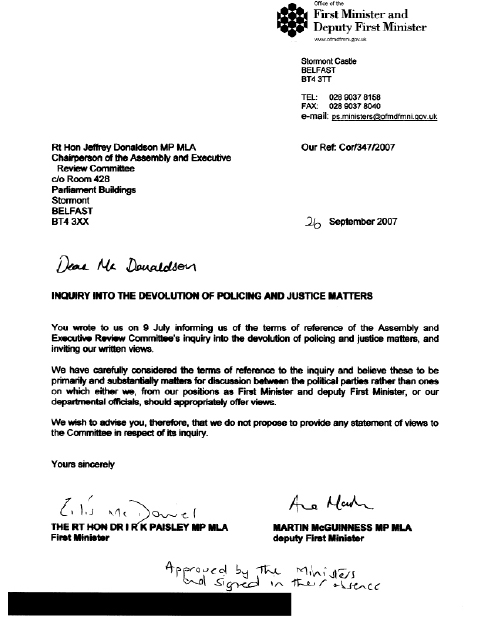
Correspondence of 26 September 2007 from Mr Stephen Graham
_fmt.jpeg)
Mr Stephen Graham
Clerk to Assembly and
Executive Review Committee
Room 428
Parliament Buildings
Stormont Estate
Belfast
BT4 3XX
Tel: (0)28 9052 1784
Fax: (0)28 9052 5917
Email: stephen.graham@niassembly.gov.uk
Gail McKibbin
DALO
OFMDFM
Room GD50
Stormont Castle
Stormont Estate
BELFAST
26 September 2007
Dear Gail
Assembly and Executive Review Committee
Further to our conversation earlier today, I am writing to confirm that I was asked to communicate with officials from OFMdFM to say that the Committee would find it helpful if any submission from the First Minister and deputy First Minister on the devolution of policing and justice matters, dealt, at least, with any discussions that OFMdFM has had with the NIO, or arrangements which that Department might be making regarding the following matters:
- Appointing the Attorney General
- Making Judicial and Tribunal appointments
- Sponsorship of the Judicial Appointments Commission and the Judicial Appointments Ombudsman
Obviously, I now have a letter from the First Minister and deputy First Minister which the Committee has not yet seen, but indicates that it was not their intention to make a submission. However, in light of the request in this letter, the First Minister and deputy First Minister may wish to re-consider the matter.
Yours sincerely
Stephen J Graham
Committee Clerk
Correspondence of 1 October 2007 from Gail McKibbin

Stephen J Graham
Committee Clerk
Assembly and Executive Review Committee
Room 428
Parliament Buildings
Stormont
Belfast
BT4 3XX
1 October 2007
Dear Stephen
Assembly and Executive Review Committee
I refer to your letter of 26 September in which you suggested that the decision conveyed in the First Minister’s and deputy First Minister’s letter, also of 26 September, might be reconsidered in the light of the Committee’s earlier request that certain specified matters might be addressed in any submission.
I wish to advise you that, following consultation, the decision conveyed in the First Minister’s and deputy First Minister’s letter remains unchanged.
Yours Sincerely
Gail McKibbin
Gail McKibbin
Departmental Assembly Liaison Officer
Chairperson’s letter of 23 October 2007
_fmt.jpeg)
Rt Hon Jeffrey Donaldson MP
Chairperson Assembly and
Executive Review Committee
Room 428
Parliament Buildings
Stormont
Belfast BT4 3XX
23 October 2007
Rt Hon Dr Paisley MP and Mr McGuinness MP
OFMdFM
Stormont Castle
Stormont Estate
Belfast
Dear First Minister and deputy First Minister
Inquiry into the devolution of policing and justice matters
As you know, section 18 of the Northern Ireland (St Andrews Agreement) Act 2006 requires the Assembly, inter alia,
“to report to the Secretary of State before 27 March 2008 …as to the preparations that the Assembly has made, and intends to make, having regard to paragraph 7 of the St Andrews Agreement, for or in connection with policing and justice matters ceasing to be reserved matters …”
This matter was referred to the Assembly and Executive Review Committee, by the Assembly, on 4 June 2007.
As you will know, the Assembly and Executive Review Committee determined to take the matter forward by way of an Inquiry. Indeed, at the launch of the Inquiry, I wrote to invite you to make a submission and thereafter to ask you to re-consider your decision not to do so. At its meeting today, the Committee asked that I write to you, again.
The Committee considers that your Department could usefully inform the Inquiry by addressing three particular issues which could be regarded as central to the preparations which the Assembly needs to make.
Attorney General
Firstly, in relation to the devolution of policing and criminal justice matters, the appointment of an Attorney General will fall to your office. The Assembly and Executive Review Committee is concerned to ensure that any arrangements for such an appointment would not hinder any request there might be from the Assembly for the transfer of a range of policing and justice matters. A response from you, explaining what arrangements you are making, would enable the Committee to outline, in its report, “the preparations that the Assembly has made, and intends to make ...” in relation to the appointment of an Attorney General.
Number of Ministers/Departments
Secondly, the Committee considers that the work which the proposed Efficiency Review Panel is expected to undertake in relation to the number of Departments impacts, directly, on any request there might be for the transfer of a range of policing and justice matters. You will of course recall that this is a matter which I and the Deputy Chairperson raised with you initially, when we met you both in May 2007. Since then, we have tried to impress on officials, and special advisers, in OFMdFM, the significance of this issue in the context of the potential devolution of policing and justice matters.
As you know, any new Ministerial office would have to be accommodated under existing arrangements, unless there was a request for an amendment to section 17 of the Northern Ireland Act 1998 to increase the number of Ministerial offices. Therefore it will be especially important for the Committee to have a sense of the timeframe for the work of the Efficiency Review Panel, given the Assembly’s deadline for reporting to the Secretary of State (before 27 March 2008) about the devolution of policing and justice matters. Thus, a response from you would enable the Committee to outline, in its report, “the preparations that the Assembly has made, and intends to make ...” in relation to how any new department would fit into the current departmental structure in the context of recommendations on the appointment of a Minister, or Ministers, who might assume responsibility for policing and justice matters.
Of course, you will also recall that the Assembly and Executive Review Committee has a wider interest in the proposed Efficiency Review Panel. We have already made representations to you about the need to consult the Committee about the terms of reference proposed for the Panel, its membership and remit. The Committee asked me to remind you of that interest and to request that you would agree to meet a delegation from the Committee, comprising representatives of the four main parties, so that you can update us on developments.
Public Prosecution Service
As you may know, the Committee heard oral evidence from the Secretary of State on 3 October. As a result of that oral evidence session, the Committee wrote to the NIO to seek clarification on a range of issues. In a subsequent response, the NIO states that, in circumstances where policing and justice matters might be transferred, it would be a matter for the Executive to consider which department would assume responsibility for the Public Prosecution Service – on the basis that it would not fall to any new Department of Policing and Justice. Again, the Committee would welcome a response from you which would describe the preparations the Executive has undertaken, or intends to make, in this regard.
Of course, it remains the case that the Committee would welcome any other views you might wish to express in relation to the devolution of policing and justice matters.
I look forward to hearing from you soon.
Rt Hon Jeffrey Donaldson MP
Chairperson
Assembly and Executive Review Committee
Chairperson’s letter of 20 November 2007
_fmt.jpeg)
Rt Hon Jeffrey Donaldson MP
Chairperson Assembly and
Executive Review Committee
Room 428
Parliament Buildings
Stormont
Belfast BT4 3XX
20 November 2007
Rt Hon Dr Paisley MP and Mr McGuinness MP
OFMdFM
Stormont Castle
Stormont Estate
Belfast
Dear First Minister and deputy First Minister
Inquiry into the devolution of policing and justice matters
At the last meeting of the Committee on 20 November, I was directed to write to you to express the Committee’s disappointment at the fact that there has not been a reply to the letter that it sent to you on 23 October. (I have attached a copy of that letter).
As stated previously, the Committee has identified three issues which it considers you could usefully provide information on as follows:
(1) The Attorney General
(2) The number of Ministers/Departments
(3) The Public Prosecution Service
The Committee agreed that for it to continue its discussions into the devolution of policing and justice matters, it needs a response from your Office on the above issues.
With this in mind, and the tight deadline for the Committee to report to the Assembly, the Committee would appreciate at least an initial response with information on where OFMdFM is on each of these issues, in time for consideration at its next meeting on 27 November.
Of course, it remains the case that the Committee would welcome any other views you might wish to express in relation to the devolution of policing and justice matters.
I look forward to hearing from you soon.
Rt Hon Jeffrey Donaldson MP
Chairperson, Assembly and Executive Review Committee
OFMdFM letter of 14 December 2007
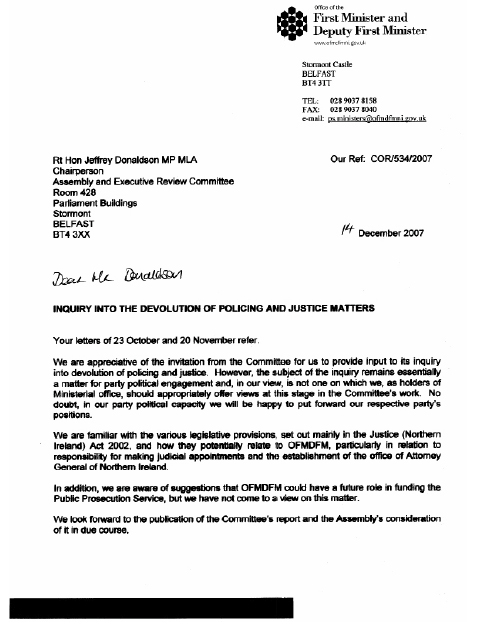
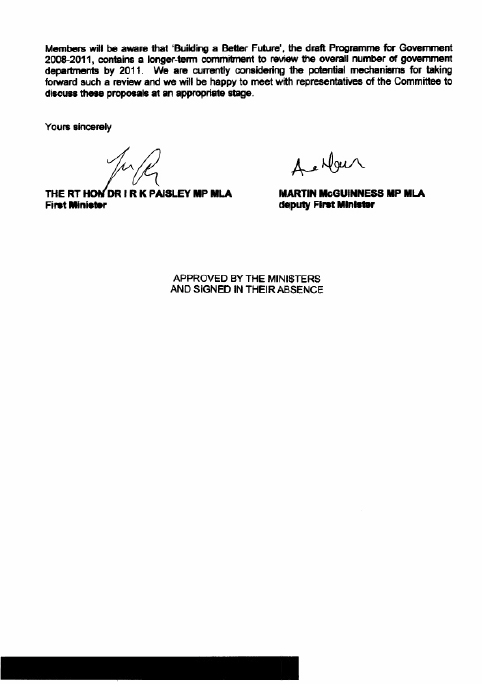
Correspondence of 19 December 2007 from Mr Stephen Graham
_fmt.jpeg)
Mr Stephen Graham
Clerk to Assembly and
Executive Review Committee
Room 428
Parliament Buildings
Stormont Estate
Belfast
BT4 3XX
Tel: (0)28 9052 1784
Fax: (0)28 9052 5917
Email: stephen.graham@niassembly.gov.uk
Gail McKibbin
OFMDFM
Stormont Castle
Stormont Estate
BELFAST
19 December 2007
Dear Gail
Inquiry into the devolution of policing and justice matters
As I explained to you in conversation yesterday, the Assembly and Executive Review Committee considered the letter of 14 December 2007 from the First Minister and the deputy First Minister. As a result of those deliberations, I was directed to invite OFMDFM officials to attend the Committee meeting scheduled for 8 January 2008 so that a number of issues might be discussed.
I should explain that the Chief Constable is due to appear before the Committee at 11.15 on 8 January, in the Senate Chamber, and it would be helpful if officials from OFMDFM were to make themselves available from 12 midday. Officials from the NIO are also scheduled to appear before the Committee immediately after the proposed session with OFMDFM officials. The proceedings will be conducted in public.
Please contact me if you have any queries.
Yours sincerely
Stephen J Graham
Committee Clerk
Correspondence of 7 January 2008 from Gail McKibbin

Stephen J Graham
Committee Clerk
Assembly and Executive Review Committee
Room 428
Parliament Buildings
Stormont
Belfast
BT4 3XX
7 January 2008
Dear Stephen
Inquiry into the Devolution of Policing and Justice Matters
Your letter of 19 December refers.
We have now had an opportunity to consider, in conjunction with our Ministers, the invitation to attend the Committee meeting scheduled for tomorrow to discuss issues in relation to the Committee’s inquiry into devolution of policing and justice.
The Ministers remain of the view that this is a matter for party political engagement and agreement, and, as you know, they consider it would be inappropriate for them, as holders of Ministerial office, to offer views to the inquiry at this stage. On this basis, the Ministers are agreed that it would also be inappropriate for officials to attend the Committee to discuss what are undetermined policy matters. Therefore, we must decline the Committee’s invitation to appear at this time.
We can advise that, at this stage, we see nothing in the legislative provisions relating to our Department which could hinder the implementation of an agreed outcome on the devolution of justice and policing responsibilities.
Further details on the possible implications for OFMDFM of devolution of justice and policing and the work currently under way to identify what preparations might appropriately be made to prepare for such devolution are set out in the attached submission. This work is being taken forward at official level.
We hope the Committee finds this submission helpful to its inquiry, and officials would be happy to respond in writing to any queries arising in relation to of it.
Yours Sincerely
Gail McKibbin
Gail McKibbin
Departmental Assembly Liaison Officer
The Devolution of Justice and Policing
Ministerial Position
1. The First Minister and deputy First Minister consider that the issues raised by the inquiry of Assembly and Executive Review Committee (AERC) into devolution of policing and justice powers are matters for political engagement within the AERC and subsequently the Assembly and not ones on which they, as holders of Ministerial Office, can or should appropriately offer views.
2. They recognise that any agreement on the devolution of justice and policing will have a number of significant implications for the role and responsibilities of the Office of the First Minister and deputy First Minister. Therefore, in the light of the timescale for the submission of the Assembly’s report to the Secretary of State, it is prudent that consideration should be given to the scope and nature of these implications.
3. This paper, which is presented by OFMDFM as evidence to the Assembly and Executive Review Committee, therefore describes the possible implications for the Office of the First Minister and Deputy First Minister of the devolution of justice and policing and the work currently under way to identify what preparations can appropriately be made in anticipation of such devolution. This work, is being taken forward at official level.
4. In its discussion paper on Devolving Policing and Justice in Northern Ireland of February 2006, the Northern Ireland Office sets out a number of proposals for additional changes in responsibilities and organisation consequent on devolution. These, as they may affect OFMDFM, are recorded in the following paragraphs. It is emphasised that while these proposals provide a useful basis for identifying planning issues and appropriate preparatory work, they have yet to be considered by Ministers and agreed by the Executive.
Implications for OFMDFM of Devolution of Policing and Justice
5. The devolution of justice and policing will place a number of new statutory responsibilities on OFMDFM in relation to appointments to certain legal and judicial offices. In most cases this will involve taking on roles currently filled by the Northern Ireland Court Service. OFMDFM will also have responsibility for bringing forward legislation for the creation of a Department with justice and policing responsibilities and for any other agreed machinery of government changes.
6. The main features of the potential range of post-devolution responsibilities, and how they affect OFMDFM, are set out below.
Attorney General (AGNI)
7. With the devolution of justice responsibilities, certain provisions of the Justice (Northern Ireland) Act 2002 would be activated, and these include sections 22-26 relating to the new post of Attorney General for Northern Ireland (AGNI). Section 22 of the Act states that the First Minister and Deputy First Minister must appoint a person to be AGNI and stipulates certain legal qualifications required for the post. It places funding and support responsibilities on OFMDFM and makes clear that the functions of the AGNI shall be exercised independently of any other person. Other sections of the Act prescribe terms of appointment, reporting arrangements and the procedures to be followed for removal from office. Section 25 allows for the AGNI to participate in proceedings of the NI Assembly to the extent permitted by its Standing Orders but does not provide for voting rights.
8. The Attorney General for England and Wales (AGEW) will retain her powers, including those in respect of the Public Prosecution Service, until such time as section 22.1 of the Act is activated. OFMDFM would assume responsibility for funding the office of AGNI as well as any staff he or she may appoint with the approval of the First Minister and deputy First Minister as to numbers, salaries and conditions of service.
Public Prosecution Service (PPS)
9. The Public Prosecution Service was created in 2005 and, while funded by NIO, is staffed by Northern Ireland Civil Servants on secondment. It is headed by:
- the Director of Public Prosecutions for Northern Ireland; and
- the Deputy Director of Public Prosecutions for Northern Ireland,
10. After devolution of justice responsibilities, it would be for AGNI to appoint a new Director or Deputy Director when a post falls vacant. The current relationship between the AGNI and the Director (superintendence and direction) would change significantly under devolution and the Director would exercise his functions largely independently of AGNI.
11. The relevant section of the Justice Act 2002 places responsibility on the Secretary of State for funding the Public Prosecution Service, approving salaries, terms and conditions and staffing etc. NIO has indicated its wish to agree a concordat with the NI Executive setting out the core principles of PPS independence and impartiality. NIO has also proposed that in the interests of securing that independence, its current responsibilities for PPS should transfer to OFMDFM by an Order under Section 86 of the Northern Ireland Act at the time of devolution.
Northern Ireland Judicial Appointments Commission
12. It was originally intended that the Northern Ireland Judicial Appointments Commission (NIJAC) would come into being on the devolution of justice and the relevant legislation (Justice (NI) Act 2002) was therefore drafted to place responsibilities on the First Minister and deputy First Minister in respect of the Commission. This was revised by the Justice (NI) Act 2004 which transferred these responsibilities to the Lord Chancellor on the actual establishment of the Commission. It is proposed in the NIO Discussion Paper of February 2006 that these would be transferred back to the First Minister and deputy First Minister on the devolution of justice.
13. These responsibilities are:
- appointment of members of NIJAC, other than the Lord Chief Justice (LCJ), who will be the Chair ex officio. Most of the members are to be nominated by the LCJ (judicial members) or the Bar Council or Law Society (legal profession members);
- approval of allowances and salaries for “non-judicial” members;
- approval of NIJAC staff complement, salaries and terms of employment; and,
- determining financial accountability arrangements for NIJAC.
Judicial Appointments Ombudsman
14. A Northern Ireland Judicial Appointments Ombudsman was appointed in 2006 by HM The Queen, on the recommendation of the Lord Chancellor, consequent on provisions in the Constitutional Reform Act 2005, amending the Justice(NI) Act 2002. The Lord Chancellor pays the Ombudsman’s remuneration, fees and expenses. The role of the Ombudsman is to investigate complaints of maladministration or unfairness during the judicial appointments process. The NIO discussion paper of 2006 proposes that on devolution of justice the Lord Chancellor’s functions in relation to the Ombudsman would devolve to the First Minister and deputy First Minister. However, it is now recognised that the independent position of the Ombudsman would be enhanced if appointment and sponsor responsibility of the office was separated from the OFMDFM’s potential responsibilities in relation to the Northern Ireland Judicial Appointments Commission. The current planning assumption, therefore, is that support responsibilities in relation to the Ombudsman should be discharged by the Department of Justice.
Appointment of the Lord Chief Justice and Lords Justices of Appeal
15. The First Minister and deputy First Minister would have a role in the process for appointing the Lord Chief Justice and Lords Justices of Appeal.
16. The First Minister and deputy First Minister would be consulted by the Prime Minister on appointments to these offices. The Prime Minister must consider their response before in turn making a recommendation to the HM The Queen. Advice on the procedure to be adopted in formulating a response will be provided to the First Minister and deputy First Minister by NIJAC.
Other Judicial Appointments
17. The First Minister and deputy First Minister and deputy First Minister, acting jointly, would also have a role in the process of appointment to a very wide range of other judicial offices. The most important of these will be judges of the High Court, where they will make a recommendation to HM The Queen to fill a vacancy. However, they can only recommend a person selected by NIJAC. For other listed judicial offices (including temporary High Court judges, County Court judges, Resident Magistrates, Coroners, Social Security Commissioners, Presidents of Tribunals and Lay Magistrates) the current responsibilities of the Lord Chancellor would transfer to the First Minister and deputy First Minister. Only persons selected by NIJAC may be appointed, but there is a limited power for the First Minister and deputy First Minister to delay or decline a selection or recommendation from the Commission.
Other Implications for OFMDFM
18. It is also likely that a Department of Justice would assume statutory responsibility for the various Tribunals which are currently sponsored individually by NI Departments. In the absence of devolution it had been envisaged that operational responsibility would transfer to the existing NI Courts Service. The implications for OFMDFM are that, subject to the agreement of the Executive:
- omnibus cross-departmental legislation will need to be prepared to transfer statutory responsibility for all tribunals to a Department with justice responsibilities;
- responsibility for the Planning and Water Appeals Commissions, currently held by OFMDFM, would therefore transfer to that Department;
- any other responsibilities in relation to the Parking Adjudication, Rates and Charities Tribunals conferred on OFMDFM by the Justice Acts 2002 and 2004 would also transfer; and
- responsibility for any judicial appointments related to tribunals would remain with FM/dFM.
Planning
19. As described above the implications for OFMDFM are significant: the burden of preparation within the devolved administration will, in practical terms, fall largely on OFMDFM and DFP, working in co-operation with NIO. There are two main areas in which OFMDFM will continue to be involved over the coming months in creating an administrative and legal basis for the potential devolution of justice and policing in May 2008 or thereafter. These are:-
- Co-operation with NIO, NI Court Service, DFP and others on Programme and Project Boards overseeing practical preparations for the devolution of justice and policing.
- Planning for the acquisition by OFMDFM of additional responsibilities for funding and appointments in the legal and judicial spheres.
20. A Devolved Administration Board for the Devolution of Policing and Justice has been established, under the Chairmanship of the Head of the Northern Ireland Civil Service, to bring together relevant NI Departmental interests to identify and take forward all matters necessary to ensure full administrative preparedness within the NICS for the devolution of policing and justice. Within OFMDFM, a Project Board has been established specifically to examine the implications of devolution for OFMDFM and to plan for the acquisition and exercise of the responsibilities described earlier in this paper.
21. NIO has established machinery, in the form of an overarching Sponsoring Group with a supporting Programme Board and Stakeholder Group, to take forward a wide variety of workstreams and projects, the overall aim of which is to ensure that a fully operational Department with justice and policing responsibilities can be brought into being to coincide with the devolution of those functions. OFMDFM is represented appropriately in this machinery.
OFMDFM
January 2008
Correspondence of 9 January 2008 from Mr Stephen Graham
_fmt.jpeg)
Mr Stephen Graham
Clerk to Assembly and
Executive Review Committee
Room 428
Parliament Buildings
Stormont Estate
Belfast
BT4 3XX
Tel: (0)28 9052 1784
Fax: (0)28 9052 5917
Email: stephen.graham@niassembly.gov.uk
Gail McKibbin
OFMDFM
Stormont Castle
Stormont Estate
BELFAST
9 January 2008
Dear Gail
Inquiry into the devolution of policing and justice matters
We spoke on the telephone yesterday and I am writing to confirm that, at its meeting on 8 January 2008, the Assembly and Executive Review Committee considered your letter of 7 January 2008 and decided that I should seek to arrange an urgent meeting between the Chairperson and Deputy Chairperson of the Committee, and the Special Advisers to the First Minister and the deputy First Minister.
It was suggested that a meeting on Monday, next, 14 January, in Parliament Buildings, would allow the Chairperson and Deputy Chairperson to report outcomes to the Committee at its meeting scheduled for Tuesday, 15 January. You have indicated that 11.30 on Monday might be possible (presuming the respective Assembly Group meetings have concluded by then). I can confirm that this would suit Jeffrey Donaldson and Raymond McCartney. I am content for you to identify a suitable venue but, if you need assistance on that front, please let me know.
As I explained, the purpose of the discussion is to obtain clarity on matters relating to the appointment of an Attorney General (and other related judicial appointments), the location of the Public Prosecution Service in any particular Northern Ireland Government Department and how a Minister, or Ministers, for Policing and Justice might be accommodated in the Northern Ireland Executive. In particular, the Committee has asked that the discussions explore the extent to which any, and all, of these matters are matters to be resolved, partly, or wholly, by the First Minister and deputy First Minister, and/or the Northern Ireland Executive, and/or, by political negotiation amongst the political parties and/or within the Assembly and Executive Review Committee. The Committee considers it is essential to secure this clarity as a matter of urgency in order to allow it to fulfil its obligation to report to the Assembly by 29 February 2008.
Please contact me if you have any queries.
Yours sincerely
Stephen J Graham
Committee Clerk
Correspondence of 15 January 2008 from Mr Stephen Graham
_fmt.jpeg)
Mr Stephen Graham
Clerk to Assembly and
Executive Review Committee
Room 428
Parliament Buildings
Stormont Estate
Belfast
BT4 3XX
Tel: (0)28 9052 1784
Fax: (0)28 9052 5917
Email: stephen.graham@niassembly.gov.uk
Gail McKibbin
OFMDFM
Stormont Castle
Stormont Estate
BELFAST
15 January 2008
Dear Gail
Inquiry into the devolution of policing and justice matters
Further to the recent exchange of letters which resulted in the meeting between the Chairperson and deputy Chairperson of the Committee and the Special Advisers to the First Minister and the deputy First Minister on Monday 14 January, and following on from the verbal progress report provided by NIO officials at the Committee’s evidence session on 8 January, I am writing to extend an invitation to the Chairperson of the Devolved Administration Board to appear before the Committee to report on the administrative progress that the NI Departments are making in anticipation of the devolution of policing and justice matters. The Committee is interested to hear from the Chairperson - as referred to at paragraph 20 of the paper attached to your letter of 7 January 2008 - about the degree to which the NICS is prepared for the devolution of policing and justice.
The Committee also wishes to explore with the Chairperson what consideration has been given to the post of Attorney General for Northern Ireland, including whether it would be a full, or part-time position, and what the duties and responsibilities of the post would be.
As you know, the Committee is coming towards the end of its Inquiry and is required to report to the Assembly by 29 February. Therefore, it would be extremely helpful if the Chairperson were able to appear before the Committee next Tuesday morning, 22 January. The Committee meeting is due to begin at 11.00 hrs in Room 144 and, so, if this does prove convenient, perhaps you would call me on 90521784 so that we can arrange a precise time and discuss any other related arrangements.
Yours sincerely
Stephen J Graham
Committee Clerk
Research Papers
Briefing Note:
The Role of the Serious Organised Crime Agency (SOCA) and its Relationship with
the Northern Ireland Office
Northern Ireland Assembly – Research and Library Services
Equality, Culture and Justice Team
20 September 2007
Introduction
This paper was prepared for the Assembly and Executive Review Committee with the aim of providing information on the role of the Serious Organised Crime Agency (SOCA). It includes information on the background to SOCA, the legislative basis and its functions, including how they pertain to Northern Ireland.
1.0 Background
SOCA was launched by the Prime Minister on Monday 3 April 2006. The Number 10 press release announced SOCA as[1]:
A new crime-fighting agency will target the biggest criminals using a “sophisticated 21st century approach”, Tony Blair said today.
Soca - the Serious Organised Crime Agency - will focus on the so-called “Mr Bigs” who make fortunes from drugs, human trafficking, major fraud and counterfeiting.
SOCA was formed by amalgamating a number of existing organisations. The organisations that became SOCA were; the National Crime Squad (NCS), the National Criminal Intelligence Service (NCIS), that part of Her Majesty’s Revenue and Customs (HMRC) dealing with drug trafficking and associated criminal finance, and a part of UK Immigration dealing with organised immigration crime (UKIS)[2].
SOCA is led by a Board, the chair of which is appointed by the Home Office. The chair manages SOCA’s relationship with Government and Ministers. SOCA was established with a budget of more than £400 million a year and with a complement of 4000[3].
In January 2007, it was announced by the Home Office that SOCA would subsume the Assets Recovery Agency (ARA) in Northern Ireland[4].
2.0 Legislative Basis
The original legislative basis for SOCA comes from the Proceeds of Crime Act 2002 (PoCA 2002). The Proceeds of Crime Act 2002 (PoCA 2002) created a specific offence of money laundering, set up an Assets Recovery Agency whose job is to confiscate the profits of crime, and made it unlawful for anyone working in banks, building societies and bureaux de change not to report suspicious transactions[5].
The Agency itself was set up under the Serious Organised Crime and Police Act 2005, and was given four additional powers regarding:
1. Queen’s Evidence,
2. Financial Reporting Orders,
3. Disclosure Notices and
4. the creation of officers with combined powers.
Details of these new powers are in Table 1 (Appended).
3.0 The role and functions of SOCA
SOCA is an Executive Non-Departmental Public Body sponsored by, but operationally independent from, the Home Office. It is intelligence-led and has law enforcement powers and harm reduction responsibilities. Harm in this context is the damage caused to people and communities by serious organised crime.
In its 2006/2007 Annual Report, SOCA revealed that during 2006/07 it had received £442m from the Home Office, HMRC, the Northern Ireland Office and the Scottish Executive and employed 4,400 full-time staff[6].
The functions of SOCA are detailed in full in the Serious Organised Crime and Police Act 2005. However they are paraphrased in the 2007/2008 SOCA Annual Plan[7].
They are to prevent and detect serious organised crime, to contribute to its reduction in other ways and the mitigation of its consequences, and to gather, store, analyse and disseminate information on crime. In summary, as explained in the 2004 White Paper “One Step Ahead”, SOCA has been tasked with making an impact on serious organized crime that affects the UK so that the harm that it causes is reduced.
Priorities for SOCA
In June 2005, the Home Secretary set out the Government’s priorities for SOCA’s first three years and explained how its performance would be judged. The main points are that[8]:
- SOCA should devote a higher proportion of its resources and activity to intelligence work than the agencies that it replaced;
- Class A drugs and organized immigration crime, in that order, should be its top priorities;
- effort should continue to be devoted also to the other organised crime
- threats identified, including fraud against individuals and the private
- sector, hi-tech crime, counterfeiting, the use of firearms and serious
- robbery; and
- emphasis should be placed on recovering the proceeds of crime.
The SOCA Board has subsequently created 5 strategic priorities each with a number of related actions, measures and milestones. The 5 priorities are[9]:
1. To build knowledge and understanding of serious organised crime, the harm it causes, and of the effectiveness of different responses.
2. To increase the amount of criminal assets recovered and increase the proportion of cases in which the proceeds of crime are pursued.
3. To increase the risk to serious organised criminals operating in the UK, through proven investigation capabilities and in new ways.
4. To collaborate with partners in the UK and internationally to maximise efforts to reduce harm.
5. To provide agreed levels of high quality support to SOCA’s operational partners and, as appropriate, seek their support in return.
SOCA has also determined that SOCA should aim to apportion its efforts to the main sectors of its operation. They are[10]:
- drugs trafficking, primarily Class A - 40%
- organised immigration crime - 25%
- individual & private sector fraud - 10%
- other organised crime - 15%
- supporting law enforcement partners – 10%
SOCA and the Assetts Recovery Agency (ARA)
On 16th January 2007, the UK Government introduced the Serious Crime Bill to Westminster, setting out Government proposals to merge the operational elements of the Assets Recovery Agency (ARA) with SOCA. Subject to the passing of the necessary legislation, the merger provisions are likely to come into force from April 2008[11]. Until then ARA will continue to operate as before and use its powers to the full in proceeding to complete existing cases and adopt new cases for future action.
SOCA’s 2007/2008 Annual Plan points to the absorbtion of the ARA[12]:
While the initiative for this came from Ministers, we understand the rationale and believe that in time there will be advantages to asset recovery and work against organised crime more generally from this change. We are determined to maintain and enhance the work that ARA has begun, including the important and distinct effort in Northern Ireland.
To provide an effective and coherent response to organised crime threats, SOCA has agreed to work in partnership with the agencies in Scotland and Northern Ireland[13].
In this context, SOCA:
- provides intelligence support to law enforcement agencies in Scotland and Northern Ireland;
- conducts a range of intervention activity, aimed at making life harder for organised criminals throughout the UK, in close co-operation with the relevant authorities where a geographical link outside England and Wales is identified;
- runs enforcement operations in Scotland or Northern Ireland working with the Scottish Crime and Drug Enforcement Agency (SCDEA), Police Service of Northern Ireland (PSNI) and other existing agencies there and in support of their efforts; and
- facilitates international law enforcement assistance to agencies in Scotland and Northern Ireland.
4.0 SOCA’s relationship with the Northern Ireland Office
Given that SOCA is an Executive Non-Departmental Public Body, operationally independent from the Home Office, it is also operationally independent from NIO. SOCA plans its own priorities, including how it exercises its functions. SOCA’s Annual Plan includes specific reference as to how it will exercise its functions in Northern Ireland.
In Northern Ireland SOCA and the other law enforcement agencies have come together to form the Organised Crime Taskforce (OCTF) to tackle organized crime. SOCA is not required by the Serious Organised Crime and Police Act 2005 to be a member of the OCTF, but it has agreed to work in partnership with law enforcement agencies in Northern Ireland. The OCTF concentrates its efforts on those criminal gangs in Northern Ireland that are causing the most harm[14].
The principal threats in Northern Ireland from organised crime during 2007/08 are likely to be armed robbery, drugs, excise and tax frauds (including oils), extortion, immigration, intellectual property crime and money laundering. The work of ARA in Northern Ireland has been particularly important this context. Accordingly SOCA has agreed to maintain the level and focus of asset recovery work in the Northern Ireland going forward, and to ensure that local circumstances are taken into account in its approach to former ARA work undertaken there.
The Role of SOCA if Policing and Justice matters are devolved
If, in the future, Policing and Justice matters are devolved to the Northern Ireland Assembly, the Northern Ireland Office (NIO)have indicated that SOCA “will consult with Northern Ireland Ministers, where appropriate, instead of the Secretary of State”[15].
The NIO have stated that the situation in Northern Ireland would be similar to the situation in Scotland, if justice matters are devolved. In Scotland the Home Secretary is[16]:
obliged to consult with the Scottish Ministers in a range of matters governing SOCA, including the setting of strategic priorities, codes of practice, action plans and specific activities in Scotland. Scottish Ministers also have direct functions in directed arrangements or designation of powers to SOCA staff.
The NIO point out that the Northern Ireland Policing Board will not have oversight of SOCA, but that the Northern Ireland Police Ombusman will have jurisdiction over SOCA officers[17].
SOCA Briefing - 20 Septepber 2007
Appendix A:
New powers given to SOCA under the Serious Organised Crime and
Police Act 2005[18]
1 Queen’s Evidence
Prosecutors will now be able to strike deals with suspects within a statutory footing, offering either immunity from prosecution or reduction in sentence in return for co-operation. This will provide a strong incentive for those further down the ‘food chain’ to give evidence against the most powerful heads of organised criminal networks.
It is hoped this will lead to the arrest and imprisonment of more senior figures which in turn will help to make the UK a more difficult place to do business. But it will also help to breed uncertainty inside criminal organisations, whilst maintaining the essential checks and balances to prevent potential miscarriages of justice
2 Financial reporting orders
Under the old rules, criminals could continue with their businesses either in prison or once they got out because their finances were not transparent.
On conviction, a court can now decide to place an order on a criminal. This means they are obliged to report on their financial affairs including specified documents with each report. This allows the authorities to check the criminal has no illicit sources of income. Including false or misleading information is an offence resulting in imprisonment of up to a year or a fine or both. These orders can last up to 20 years.
3 Disclosure notices
Before SOCA, those suspected of organised crime were entitled to remain silent, making it tricky to get sufficient evidence for cases, particularly in complex cases.
The Prosecutor will be able to authorise police or SOCA to serve a notice on a suspect that requires them to answer questions, provide information and produce documents. If they can’t produce the documents required, they may be obliged to say where they are. If a suspect fails to comply, they can be imprisoned for up to a year or fined or both. In effect this limits the right to silence - although information obtained in this way cannot be used in evidence in a criminal prosecution against the person who gives it.
4 Law enforcement officers with multiple powers
Operations used to complex and time-consuming because many different categories of officer were needed - for example, police officers could not deport people.
Once officers are trained, they will now have a full set of powers. This will allow SOCA to deploy teams that will be far more flexible, and speed up the time to deal with suspects.
[1] http://www.number10.gov.uk/output/page9274.asp
[2] http://www.soca.gov.uk/aboutUs/index.html
[3] http://www.number10.gov.uk/output/Page9273.asp
[4] Serious Organised Crime Agency Annual Plan 2007/2008, Serious Organised Crime Agency, The Stationary Office.
[5] http://news.bbc.co.uk/1/hi/uk/2150798.stm
[6] Serious Organised Crime Agency Annual Plan 2007/2008, Serious Organised Crime Agency, The Stationary Office
[7] Ibid. p.7
[8] http://www.soca.gov.uk/downloads/annualPlan.pdf
[9] Serious Organised Crime Agency Annual Plan 2007/2008, Serious Organised Crime Agency, The Stationary Office
[10] http://www.soca.gov.uk/assessPublications/downloads/SOCAAnnualPlan2007_8.pdf
[11] http://www.assetsrecovery.gov.uk/
[12] Serious Organised Crime Agency Annual Plan 2007/2008, Serious Organised Crime Agency, The Stationary Office
[13] Ibid.
[14] Serious Organised Crime Agency Annual Plan 2007/2008, Serious Organised Crime Agency, The Stationary Office
[15] Devolving Policing and Justice in Northern Ireland: A Discussion Paper, February 2006, Northern Ireland Office
[16] Letter by NIO to Assembly and Executive Review Committee, July 2007
[17] Ibid para 9
[18] http://www.number10.gov.uk/output/Page9273.asp
Briefing Paper:
The Northern Ireland Court Service
3 October 2007
Introduction
This briefing is prepared for Members of the Executive Review Committee to facilitate their understanding of the Northern Ireland (NI) Court Service, in view of the possible devolution of Policing and Justice to NI.
Section 1.0 of this briefing provides the background information on the NI Court Service outlining the basic information, for example, the court structure, organisational structure of the NI Court Service and recent developments.
For comparative purposes, sections 2.0 and 3.0, respectively concern the court services in Scotland and the Republic of Ireland. Each section sets out information relating to the court structure, organisations structure and a commentary on recent developments, where appropriate.
Section 4.0 identifies potential issues arising from the previous sections which the Committee may wish to consider.
Section 1.0 - The Northern Ireland (Ni) Court Service
This section outlines the following:
1.1 Legislative basis of NI Court Service;
1.2 Role of the NI Court Service;
1.3 Accountability of NI Court Service;
1.4 Interaction of NI Court Service with Public;
1.5 Court Structure within NI Court Service;
1.6 Organisational Structure of NI Court Service;
1.7 Recent Developments; and,
1.8 Comments
1.1 Legislative basis of the NI Court Service
The legislation underpinning the NI Court Service is the Judicature (Northern Ireland) Act 1978.[1] This legislation established the NI Court Service “to carry out the administration of court business.”[2] It is an independent body, separate from the NI Civil Service.[3]
1.2 Role of the NI Court Service
The NI Court Service in carrying out its administrative functions has a number of responsibilities, which are listed as follows:[4]
- To facilitate the work of the courts;
- To give effect to judgments;
- To advise the Lord Chancellor on policy matters and provide legislative support;
- To support the Lord Chancellor in carrying out his responsibilities.
The Court Service also has a number of strategic aims set out in their Corporate Plan 2005-2008,[5] which “include modernising the court service; improving access to justice and promoting confidence in the justice system”.[6]
1.3 Accountability of the NI Court Service
The NI Court Service is funded by the UK Parliament and is accountable to it through the Lord Chancellor.[7]
1.4 Interaction of the NI Court Service with the Public
The NI Court Service has a Court’s Charter which provides the public with information about what to expect when they come to court, phone a court office or write to the court.[8] The Court Service also has a complaints procedure, dealing with complaints about services or facilities. The complaints procedure does not deal with complaints about judicial decisions, solicitors or officials from other agencies.[9]
1.5 Court Structure within the NI Court Service
The court structure in NI is a hierarchical structure and consists of the House of Lords, the Court of Appeal, the High Court, County Courts, the Crown Court, Magistrates Courts, Coroners’ Court and the Enforcements of Judgements Office. For further detail on their responsibilities, see Annex 1.
1.6 Organisational Structure of the NI Court Service
The organisational structure of the NI Court Service consists of a Director, management board, finance directorate, policy and legislation, public funded legal services, courts operations and tribunal reform. The composition of the management board includes the head of operations, the head of policy and legislation, the finance director, the head of public funded services, the head of tribunal reform and a non-executive member.[10] For further detail on structure, see Annex 2.
1.7 Recent Developments
There has recently been debate on the suggested model for a Department of Ministry for Justice in devolved criminal justice arrangements.[11] However the scope of this paper is to consider possible arrangements regarding the NI Court Service after the devolution of Justice and Policing. The following paragraphs highlight developments to date in this area.
The UK Government supports the view that the future court service could become an executive agency of the Department of Justice, headed by a Chief Executive.[12] The proposed functions of this agency under devolution would include administrative support for NI Courts. However there is some ambiguity as to whether the agency would provide policy and legislative support or if these should transfer to the Department of Justice and the Government notes that this requires further consideration.[13]
The NI Court Service Director suggests in his oral evidence to the Assembly and Executive Review Committee on the 25th September 2005[14] that the Legal Aid system would be best placed in the new Justice Department.[15] He further states that responsibilities such as running of courts and tribunals should remain with the court service to become part of a new unified courts and tribunals’ service.[16] In his evidence he states that new courts and tribunals service would be linked to or funded by a new justice department.[17]
The NI Court Service director also highlights the relationship between the new court service and justice department could take on a number of forms, and a possible form is that the Court Service could become an agency of the new department of justice.[18]
The Lord Chief Justice of NI has taken somewhat a different view to the proposed agency model. In his written evidence which was submitted on 30 July 2007 to the Assembly and Executive Review Committee, he recommends that the Court Service should be a non-ministerial department model such as the model in place in ROI and the proposed Scottish Court Service model.[19]
In his oral evidence to the Assembly and Executive Review Committee[20], the Lord Chief Justice suggests that there should be an independent Board which would not deal with policy matters.[21] The Lord Chief Justice sets out that there should be accountability measures in place such as accountability to the Executive for funding, a strategic plan produced by the Board which would be submitted to the minister for approval, a requirement that the Board would report annually to the Minister, the Board would agree with the Minister the staff numbers, grades and budget.[22] Finally, the Ministry of Justice would be represented on the Board.[23]
1.8 Comments
Having outlined some of the suggested models, there are some key points that emerge. First, it could be argued that an agency model could provide for greater efficiency and accountability as it would be more clearly and directly responsible to a Minister in the Assembly. Conversely, the non-ministerial department model preferred by the Lord Chief Justice could ensure greater independence than an agency model. However, this model would require legislation to reposition the Court Service as a non-ministerial department, which may not be practical before devolution of justice matters in NI.[24]
Section 2.0 - The Scottish Court Service (Scs)
This section outlines the following:
2.1 Legislative basis of the SCS;
2.2 Role of the SCS;
2.3 Accountability of the SCS;
2.4 Interaction of the SCS with the Public;
2.5 Court Structure within the SCS;
2.6 Organisational Structure of the SCS
2.7 Recommendations from the Agency Review (2005) of the Scottish Court Service;
2.8 Recent Developments.
2.1 Legislative basis of the Scottish Court Service
Ministers are responsible for the justice system in Scotland under the provisions in the Scotland Act 1998. They are answerable to the Scottish Parliament for devolved functions, including the provision of an effective court structure.
2.2 Role of the Scottish Court Service
The SCS became an Executive Agency[25] in 1995. It has achieved recognition as the body which delivers services to Scotland’s courts. It is held accountable for its effectiveness and it is the responsibility of the Ministers.
Its aim as set out in the initial Agency Framework Document, is to:[26]
Help secure ready access to Justice for the people of Scotland.
The SCS provides services to users of the Supreme and Sheriff Courts by clerking courts; supporting the judiciary; creating, storing and processing case records; fielding from public and professional user; providing technical and procedural advice; accepting payments of fines and court fees; etc. The SCS also manages and develops the court estate and maintains the court buildings and, through contractual arrangements, provides security, cleaning and catering facilities. Headquarters in Edinburgh provides a number of corporate functions including the Chief Executive’s Office; IT; finance; purchasing; planning; human resources; estates; and operational policy. The Office of the Public Guardian and Accountant of Court are included within the SCS.[27]
As was mentioned, the aim of the SCS is to help secure ready access to Justice for the people of Scotland. To achieve this aim, the SCS has the following objectives:[28]
- To provide the staff and services required to meet the needs of the Judiciary and court users.
- To provide courthouses of appropriate size and quality.
- To implement and develop the Justice Charter for Scotland and the Scottish Court Service Statement of Charter Standards.
- To secure value for money and to manage the Agency’s resources efficiently, effectively and with due regard to value for money.
2.3 Accountability of SCS
The Chief Executive is the administrative head of the SCS and is accountable to the Minister for Justice. The Agency is part of the Scottish Executive Justice Department, the government department responsible for reporting to the First Minister on the performance of the SCS.
2.4 Interaction of SCS with Public
The SCS has published a leaflet entitled Court Users Charter which is intended for all members of the public using the court service. Amongst other information, this Charter provides guidance on what user’s can expect when they come to court, when phoning a court or when writing to a court.[29] The SCS also has a complaints procedure dealing with complaints regarding a member of the SCS staff.[30]
2.5 Court Structure within the Scottish Court Service
The SCS consists of the, Supreme Courts which are the Court of Session, the High Court of Justiciary, the Accountant of Court’s Office and the Office of the Public Guardian. There are also Sheriff Courts which are divided into 6 regional Sheriffdoms.[31]
District Courts also make up another tier of the courts within the SCS. The administration of the District Courts is currently a local authority responsibility, however the Criminal Proceedings etc (Reform) (Scotland) Act 2007 provides for the establishment of justice of the peace courts in place of the current district courts. The SCS as an Agency is currently preparing to become responsible for the District Courts.[32]
2.6 Organisational Structure of Scottish Court Service.
The SCS’s Headquarters consists of the Chief Executive and its secretariat plus 4 discrete Units that provide support to the Supreme and Sheriff Courts and the Accountant of Court and Public Guardian. The 4 Units are outlined below.
- Operations and Policy Unit
This Unit drives the business planning processes of the Agency. It also promotes service quality throughout the court system and liaises with the Justice Department on the operational implications of developments in criminal and civil justice policy.
- Finance and Information Technology Unit
This Unit provides advice to the courts on budget management and is responsible for financial reporting and audit issues. It is also responsible for developing and supporting new information technology initiatives in the courts and offices. FITU incorporates the Electronic Service Delivery Unit which tasked with looking at how the Agency can improve its services to customers through e-enabled processes.
- Personnel and Development Unit
This Unit provides a comprehensive personnel and development service to SCS staff including personnel management, developing training strategies and payroll processing. It develops employment policy and procedure and supports operational managers in the areas training delivery.
- Property and Services Unit
This Unit manages the estate and is engaged in a programme of rebuilding or refurbishing those courthouses in Scotland under direct SCS control. In addition, the Unit is responsible for developing Health and Safety and security.
The Management Board of the SCS currently comprises the 4 Directors of Units based in HQ and 4 operational Directors, chaired by the Chief Executive. It is responsible both for setting the strategic direction of the Agency and for managing performance towards those aims.[33] (Refer to Annex 3 for a diagram of the structure of the SCS).
2.7 Recommendations from the Agency Review (2005) of the Scottish Court Service
A review of the structure and governance of the SCS was established with Ministerial approval in June 2005. An important part of the Review’s work was to consider whether the SCS should retain its status as an Executive Agency.[34]
The Review considered a spectrum of possible roles for the SCS namely: abolition; privatisation; contracting out; status as a Non-Departmental Public Body; merger with another public service and reversion to a Government Department. The arguments against these options are detailed in the Review document published by the Scottish Government. (These have not been included in this paper as they are beyond its scope).
With regard to the consideration of whether the SCS should retain its status as an Executive Agency, the Review recommended that the SCS remain an Executive Agency.[35] However, it is worthy to note the Review does state:
This does not mean that there is no scope for change.[36]
The Review makes several recommendations for change regarding for example, the SCS and the Scottish Executive Justice Department, the governance arrangements for the SCS and the relationship between the SCS and the Judiciary. With regard to the relationship between the Judiciary and the SCS, the Scottish Executive published in February 2007, proposals for a Judiciary (Scotland) Bill.[37] This was in response to a consultation paper published in February 2006, inviting views on proposals to improve the justice system by modernising arrangements made for the Judiciary.[38]
2.8 Recent Developments
As was previously mentioned, the Scottish Executive has published proposals for a Judiciary Bill, which marks an important development in the Executive’s ongoing programme to reform and improve Scotland’s justice system.
In February 2006 the Executive published a consultation paper inviting views on the proposals to improve Scotland’s justice system by modernising the arrangements made for the judiciary, and strengthening their role in the system.[39] It is worthy of note that the governance of the Court Service was not discussed in the consultation paper.[40]
In the proposals for a Judiciary Bill published in 2007, the Scottish Executive acknowledges there were some strong views in the consultation on the link between the unification of the Judiciary and the governance of the Court Service. The Scottish Executive states in the 2007 document:[41]
The view was that the Lord President should not take an overall responsibility for the efficient disposal of business in all courts without having authority over the administrative support for those courts.
In response to these views the Executive has stated they have entered into more detailed discussion about how more judicial authority over the Court Service would work in practice. It is further stated that the Executive is aware proposals to change the way the Court Service is governed were not specifically consulted on and therefore would not wish to make changes without consulting on this issue properly.[42]
When the proposals for a Judiciary Bill were published in February 2007, discussions on the details on the governance of the Court Service were continuing. However the Scottish Executive stated that a number of features have emerged as likely to have a place in a revised governance model. They go further by welcoming thoughts on these features.[43] (For a more detailed outline of the possible features of a revised governance model see Appendix 4).
2.9 Comments
Having outlined the current roles and responsibilities of the SCS, some key points emerge. First, the SCS as an Executive Agency of the Justice Department has arguably allowed for greater accountability in that it is a separate entity from the Ministerial Department. The senior management can focus exclusively on setting targets for service delivery, with the flexibility which Agency status brings. For example, the Chief Executive may have greater freedom in determining the means by which those targets are achieved.
Lessons also could be learnt from the way the Scottish Executive prepared for SCS becoming an Executive Agency. Before the decision was made to make the SCS an Executive Agency, a feasibility study reviewed other possibilities. Many lessons may be learnt, for example what methodology did the Executive employ to undertake this study; and who were the consultees.
Section 3.0 - The Court Service in the Republic of Ireland (ROI)
This section outlines the following:
3.1 Legislative basis of the Court Service in ROI;
3.2 Role of the Court Service in ROI;
3.3 Accountability of the Court Service in ROI;
3.4 Interaction of ROI Court Service with the Public;
3.5 Court Structure within Court Service in ROI;
3.6 Organisational Structure of the Court Service;
3.7 Comments
3.1 Legislative basis of the Court Service in ROI
The legislation underpinning the Court Service in ROI is the Courts Service Act 1998.[44] This legislation established the Court Service in 1999, as a result of a recommendation made in reports by the Working Group on Courts Commission that “there should be established by statute as a matter of urgency an independent and permanent body to manage a unified court system”.[45]
3.2 Role of the Court service in ROI
The role of the Court Service in ROI includes the following:[46]
- Management of courts;
- Provision of support services to judiciary;
- Provision of information to public;
- Provision and maintenance of court buildings;
- Provision of facilities for court users; and
- Making proposals to Minister for Justice, Equality and Law Reform on matters of jurisdiction, business of courts and procedural matters.
3.3 Accountability of the Court Service in ROI
The Court Service in ROI is funded by the State and is accountable to the Oireachtas through the Minister for Justice, Equality and Law Reform.[47] It is also accountable to the Dáil Public Accounts Committee for its financial spending.[48] The Minister is responsible for legislation relating to the courts and is accountable to the Oireachtas for the performance of the Court Service.[49] The Court Service reports to the Minister on an annual basis.[50]
3.4 Interaction of the Court Service with the Public in ROI
The Court Service in ROI has a Customer Services Charter.[51] The Charter is a statement relating to how the Court Services will provide their services. The Charter is underpinned by principles such as ethics, professionalism, courtesy and equality and diversity. The Charter includes information on correspondence with Court Service by telephone or writing, physical access to the courts and a complaints procedure. The Charter outlines that they will make provisions for people who wish to conduct their business in Irish.[52]
3.5 Court Structure within the Court Service in ROI
The court structure within the Court Service in ROI is a hierarchical structure and includes the Supreme Court, High Court, Central Criminal Court, Court of Criminal Appeal, Circuit Court, Special Criminal Court and District Court. See Annex 6 for further details.
3.6 Organisational Structure of the Court Service in ROI
- The organisational structure of the Court Service in ROI includes;
- The Board (See Annex 7 for Board Composition);[53]
- Committees of the Board;
- Audit Committee;
- Head of Internal Audit;
- Chief Executive Office;
- Director of Operations, Supreme and High Courts;
- Director of Human Resources;
- Director of Finance;
- Director of Reform and Development;
- Director of Information Technology;
- Director of Corporate Services;
- Director of Operations; Circuit and District Court.
For further details on organisational structure of the Court Service in ROI, see Annex 6.
3.7 Comments
The ROI Court Service model is an independent body, with accountability mechanisms as outlined in section 2.3. As an independent body, it secures greater judicial independence which can be reflected in its Board composition, See Annex 6.
However, an observation on this Board model is that it is ‘lawyer heavy’ and it can be questioned as to how it can ensure greater lay and ministerial involvement.
Section 4.0 - Potential Issues for Consideration
1. How could the composition of a Management Board for a future NI Court Service allow for lay involvement, ministerial involvement and judicial involvement?
2. What functions would this Management Board have?
3. How would accountability be ensured in a future NI Court Service model?
4. How would judicial independence be secured in a future NI Court Service?
5. What would be the division of responsibilities between the future NI Court Service agency/ independent body and a new Ministry of Justice for NI?
6. What can be learnt from Scotland and ROI in this area and can be reflected in any future consultation on a future NI Court Service, for example economic implications?
Annex 1 - Outline of Current Court Structure within NI Court Service[54]
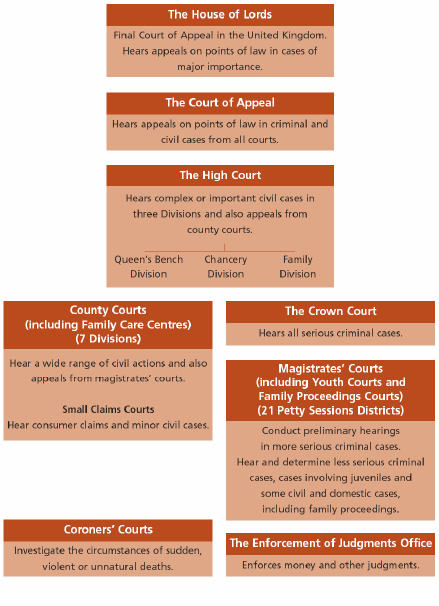
Annex 2 - Current Organisational Structure of NI Court Service[55]
Director |
MB |
|||||||||||
Finance Directorate |
Policy & Legislation |
Public |
Court |
Tribunal |
||||||||
Finance |
Criminal |
Legal |
Business |
Business Operations |
Business Development |
Tribubal Operations |
||||||
Court Funds |
Civil |
LSC |
HRU |
BCC |
Operational Policy |
Tribunal |
||||||
Audit |
Information Service |
RCJ |
Service Improvement |
|||||||||
Procurement |
Judicial |
Enforcement Business |
Business Modernisation |
|||||||||
Regional |
||||||||||||
LCJ’s |
JAC |
LSC |
Annex 3 - Outline of current SCS structure[56]
Annex 4 - Revised Governance Model
- The Scottish Court Service should be overseen by a non-executive board, chaired by the Lord President.
- Other directors on the board should have a range of different backgrounds and interests, including representatives of the different levels of the Judiciary and a nominee from the Scottish Executive Justice Department.
- The Chief Executive would report to the Court Service Board, which would set overall policy for, and monitor the performance of, the Court Service, taking account of strategic priorities agreed between the board and Ministers. Within the framework set by the board, the Chief Executive would have delegated authority to take operational decisions.
- Resources would be allocated to the Court Service by Ministers in line with agreed strategic priorities, and subject to approval by Parliament.
- The Chief Executive would be the accountability officer, in line with sections 14 and 15 of the Public Finance and Accountability (Scotland) Act 2000, and would be required to report as appropriate to the Parliament and to Ministers on the performance of the Court Service and it’s used of public funds.
- From time to time, the Lord President, as Chair of the Court Service Board, might also provide an account of policy set by the Board to Parliament.[57]
Annex 5 - Outline of Court Structure in ROI[58]
Annex 7 - Organisational Structure of Court Service in ROI[59]
Annex 8 - The Court Service Board Composition in ROI[60]
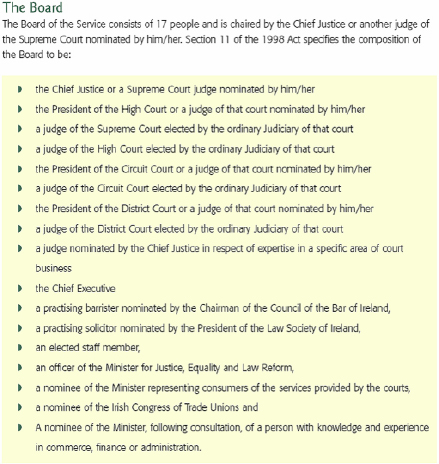
[1] http://www.courtsni.gov.uk/en-GB/AboutUs/
[2] http://www.courtsni.gov.uk/en-GB/AboutUs/25th+Anniversary+Year/p_ay_Judicature_Act.htm
[3] Written Submission from Northern Ireland Court Service for Assembly and Executive Review Committee, Pg 1, para 1.
[4] See Northern Ireland Court Service (2007) “A Guide for users of the Northern Ireland Court Service: About the Court Service”, Pg 2.
[5] http://www.courtsni.gov.uk/NR/rdonlyres/66AB4F4E-24D2-4512-884A-B8C5F7BDDD06/0/t_tp_corporateplan20052008.pdf
[6] Ibid, Pg 14.
[8] Ibid, Pg 8.
[9] Ibid, Pg 11.
[10] http://www.courtsni.gov.uk/NR/rdonlyres/6B3484D3-CDA2-41E9-B03F-14C6B0760340/0/p_tp_Business_Plan20072008.pdf , Pg 10
[11] See NIO (2006) Devolving Policing and Justice in Northern Ireland: A Discussion Paper” and “Committee on Administration of Justice (2006) “Change and Devolution of Criminal Justice and Policing in Northern Ireland: International Lessons”.
[12] See NIO (2006) Devolving Policing and Justice in Northern Ireland: A Discussion Paper” Pg 34
[13] Id
[14]Hansard Official Report, Assembly Executive Review Committee: Inquiry into the Devolution of Policing and Justice Matters, 25 September 2007,
[15] Ibid, Pg 4.
[16] Ibid, Pg 4.
[17] Id
[18] Id
[19] Written submission to Assembly and Executive Review Committee on behalf of Lord Chief Justice Kerr, 30 July 2007, Pg 6.
[20] Opening Statement to the Assembly and Executive Review Committee: Inquiry into Devolution of Policing and Justice Matters, 2 October 2007
[21] Ibid , Pg 4
[22] Id
[23] Id
[24] Id.
[25] Executive Agencies are established by Ministers as part of Scottish Government departments (now called directorates), or as departments in their own right, to carry out a discrete area of work. Agencies are staffed by civil servants.
[26] http://www.scotcourts.gov.uk/
[27] Agency Review of the Scottish Court Service, Scottish Executive Justice Department (January 2006) Pg, 5. http://www.scotcourts.gov.uk/library/Agency_Review.pdf
[28] http://www.scotcourts.gov.uk/courtsadmin/scs.asp
[29] The Scottish Court Service “User’s Charter”, http://www.scotcourts.gov.uk/courtusers/charter/charter.pdf
[30] http://www.scotcourts.gov.uk/you_and_us/feedback.asp
[31] Scottish Court Service Corporate Plan 2005-2008, Pg 5 http://www.scotcourts.gov.uk/library/corporate/corporateplan2005_2008.pdf
[32] Agency Review of the Scottish Court Service, Scottish Executive Justice Department (January 2006) Pg, 51. http://www.scotcourts.gov.uk/library/Agency_Review.pdf
[33] Ibid, Pg 52
[34] Ibid, Pg, 1.
[35] Ibid, Pg 25
[36] Ibid, Pg 25
[37] Proposals for a Judiciary (Scotland) Bill http://www.scotland.gov.uk/Resource/Doc/165568/0045075.pdf
[38] Ibid, Pg 3
[39] Ibid, Pg 2
[40] Some commentators did however mention it in their responses.
[41] Proposals for a Judiciary (Scotland) Bill, Pg 23 http://www.scotland.gov.uk/Resource/Doc/165568/0045075.pdf
[42] Ibid, Pg 23
[43] Id.
[44] Courts Service (2006) “Sustaining the Momentum: Strategic Plan 2005-2008” , Pg 10 http://www.courts.ie/Courts.ie/library3.nsf/
[45] http://www.courts.ie/courts.ie/library3.nsf/WebPageCurrentWeb/38EBFD1D6667200980256D9F0048E59E?OpenDocument&l=en
[46] Courts Service (2006) “Sustaining the Momentum: Strategic Plan 2005-2008” Ibid, Pg 10. http://www.courts.ie/Courts.ie/library3.nsf/
[47] Ibid, Pg 1.
[48] http://www.courts.ie/Courts.ie/library3.nsf/pagecurrent/39EE41AE3259894B80256DA90036F8BD?opendocument&l=en
[49] Id.
[50] Id.
[51] Court Service (2004) “The Customer Charter”.
[52] Ibid, Pg 4.
[53] The Functions of the Board are to determine policy relating to service and oversee implementation of policy by Chief Executive, see Courts Service (2006) “Sustaining the Momentum: Strategic Plan 2005-2008” Pg 31.
[54] Diagram taken from Northern Ireland Court Service (2003), “A Guide for Users of the Northern Ireland Court Service: About the Court Service”, p15
[55]Diagram taken from http://www.courtsni.gov.uk/NR/rdonlyres/8E2F9559-D96D-4D2F-B64E-7AE639EE4550/0/organisational_chart.pdf
[56] Please note this is a diagram of current arrangements and not the proposed arrangements. Diagram Taken from Scottish Court Service: Annual Report and Accounts 2004-2005.
[57] Proposals for a Judiciary (Scotland) Bill http://www.scotland.gov.uk/Resource/Doc/165568/0045075.pdf
[58] Diagram taken from “Sustaining the Momentum: Strategic Plan 2005-2008” ,Pg 30.
[59]Ibid, p32
[60] Ibid, Pg 31.
Supplemental Briefing Paper:
Policy Responsibilities of the Court
Services in Northern Ireland, Scotland
and the Republic of Ireland.
30 October 2007
Introduction
This supplemental briefing is prepared for Members of the Assembly and Executive Review Committee to facilitate their consideration of court service policy making responsibilities, in their inquiry into the devolution of policing and justice matters in Northern Ireland (NI). Section 1.0 of this supplemental briefing provides some information on current policy making responsibilities of the NI Court Service and furthermore provides some views on policy making responsibilities in future Court Service arrangements in NI, after the devolution of policing and justice. Section 2.0 provides information on policy making responsibilities in the current Scottish Court Service (SCS) model and in future governance arrangements of the SCS. Furthermore, section 2.0 also considers policy making responsibilities in the existing Court Service model in the Republic of Ireland (ROI). Section 3.0 outlines concluding comments and identifies potential key issues arising from the previous sections.
1.0 Policy making responsibilities in NI
1.1 Existing Court Service responsibilities relating to policy in Northern Ireland
The Court Service advises the Lord Chancellor on policy and legislation relating to his ministerial responsibilties in NI such as:[1]
- Responsibility for Legal Aid;
- Judicial and Quasi Judicial Appointments;
- Matters affecting the provision of legal service to the public;
- Deciding the statutory framework for the structure; and
- Jurisdiction and operation of the courts in NI.
1.1.2 A Discussion on responsibilities relating to policy in future Court Service arrangements.
In its discussion paper on the devolution of policing and justice matters in NI,[2] the NIO supported the view that the Court Service would become an executive agency of a future Department of Justice, headed by a Chief Executive.[3] The NIO indicated in its discussion paper that consideration would need to be given as to whether the Agency would continue to provide policy and legislative support, or whether these functions would be transferred to the core Department of Justice.[4]
The NIO has also indicated in their discussion paper, that responsibilities for legal aid policy and funding and the Northern Ireland Legal Services Commission, (which are currently the responsibility of the Lord Chancellor through the Northern Ireland Court Service), will transfer to the Northern Ireland Minister for Justice.[5]
The Lord Chief Justice, in his oral evidence to the Assembly and Executive Review Committee suggested that the Court Service should be a body at arms length from the government under a Board chaired by the Lord Chief Justice.[6] The Lord Chief Justice indicated that the Board in his proposed model would not deal with policy, which would be a government responsibility. However the Lord Chief Justice states that the Board would produce a strategic plan with key objectives, outputs and strategies including on the use of resources.[7]
2.0 Policy making responsibilities of the SCS and Court Service in ROI
2.1 Policy making responsibilities of SCS
The Scottish Justice Department is the parent Department of the SCS and has responsibility for policy matters affecting the justice system in Scotland. A number of divisions within the Justice Department have responsibilities which bring them into contact with the SCS on a regular basis. Due to this close working relationship, one of the responsibilities of the SCS is to maintain good working relationships with the Justice Department.[8]
More specifically, the Director of Operational Policy and Planning who is a member of the SCS Management Board, is responsible for liaising with the Justice Department on the operational implications of legislative change.[9] Douglas Osler, formerly HM Senior Chief inspector of Education in Scotland, stated in the external review on the structure and effectiveness of the SCS:[10]
The Department’s responsibility for policy which affects the capacity of the SCS to deliver its services means that policy decisions must be informed by the technical expertise of the SCS. It is therefore important that the SCS is involved at what policy staff call the ‘design and build’ stage and that they can also raise at a senior level matters which come to their notice through operational experience which could be useful to policy makers.
There are no definite and detailed proposals on a revised court service model. However, one of the features of the revised governance model of the SCS in the proposals for the Judiciary (Scotland) Bill is:
The Chief Executive would report to the Court Service Board, which would set overall policy for, and monitor the performance of, the Court Service, taking account of strategic priorities agreed between the board and Ministers. Within the framework set by the board, the Chief Executive would have delegated authority to take operational decisions.[11]
The preliminary comments in the Draft Judiciary Scotland Bill paper therefore indicate that the Scottish Court Service Board would determine policy for the Court Service, taking account of any priorities agreed between the Board and Ministers. The Scottish Executive plans to flesh out these details once consultations are complete.[12]
2.2 Policy making responsibilities of Court Service in ROI
In ROI, the Courts Service has the following functions under the Courts Service Act 1998:[13]
- To manage the courts;
- To Provide support Services for the judges;
- To provide information on the courts system to the public;
- To Provide, manage and maintain court buildings;
- To provide facilities for the users of the courts.
The Courts Service Act 1998 establishes a Board to oversee the Courts Service. The functions of the Board are to consider and determine policy in relation to the service and to oversee the implementation of that policy by the Chief Executive.[14]
In carrying out its functions the Board “shall have regard to the resources of the service for the purposes of such performance and the need to secure the most beneficial, effective and efficient use of resources”[15]. The Board also has to have regard to government or ministerial policy or objectives relating to functions of the court service.[16]
2.0 Concluding Comments and Potential Issues for Consideration
The existing Court Service in NI does not have a policy making role, however it provides the Lord Chancellor with policy and legislative advice in discharging his ministerial responsibilities.
The proposed SCS and existing ROI models suggest that a Court Service Board makes policy in relation to the functions of the Court Service. However, under both models, the Board in making policy must consider any Government or Ministerial policy or objective (ROI), or any priorities agreed with the Minister (Scotland).
Some potential key issues arising from the previous sections are:
1. In relation to policy areas such as Legal Aid, Northern Ireland Legal Services, Judicial Appointments or Court Operations, who will have responsibilities for making policy in these areas? Policy making responsibility might lie with a Minister, or, for example, a Court Service Board (in respect of court operations).
2. What arrangements should be put into place to ensure that the policymaker is accountable to the Assembly?
3. Who will have responsibilities for offering policy advice in these areas?
4. Are there lessons to be learnt from the proposed SCS model or the ROI model that can be reflected in consultations on policy making responsibilities in future Court Service arrangements?
[1] See written response on behalf of the Court Service to the Assembly and Executive Review Committee’s Inquiry into Policing and Justice Matters, Para 2 and Guide for Users of the NI Court Service, Pg 2,http://www.courtsni.gov.uk/NR/rdonlyres/C93FEE18-4396-4410-BC5D-479DBC8789DA/0/p_ucs_aboutthecourtservice.pdf
[2] NIO (2006) Devolving Police and Justice in Northern Ireland: A Discussion Paper.
[3] Ibid, Pg 34.
[4] Id
[5] Id.
[6] See Introductory Remarks made by the Lord Chief Justice to the Assembly and Executive Review Committee’s Inquiry into the Devolution of Policing and Justice Matters, Tuesday 2 October 2007.
[7] Ibid, Pg 4.
[8] Annual Report and Accounts of the Scottish Court Service 2005/06, Pg 3. http://www.scotcourts.gov.uk/library/annual_reports/docs/annualreport0506.pdf
[9] Ibid, Pg 22.
[10] Agency Review of the Scottish Court Service, January 2006 Pg 31. http://www.scotcourts.gov.uk/library/Agency_Review.pdf
[11] Proposals for a Judiciary (Scotland) Bill 2007, Pg 23
[12] Ibid, Pg 25
[13] The Courts Service Act 1998, S.5
[14] The Courts Service Act 1998, S 13 ,see the following link http://www.courts.ie/Courts.ie/library3.nsf/(WebFiles)/53B3A30B19BC8AA580256DA60054A032/$FILE/Courts%20Service%20Act%2C%201998.pdf
[15] Id.
[16] Id.
Briefing Paper:
Court Service and Public Prosecution Models in England and Wales and Northern Ireland
1 November 2007
Introduction
This briefing is prepared for Members of the Assembly and Executive Review Committee, to facilitate their understanding of both the Court Service and Crown Prosecution Service (CPS) in England and Wales and to compare these with proposals for change to the Northern Ireland (NI) Court Service and the Public Prosecution Service in NI (PPSNI), in view of possible devolution of Policing and Justice to NI.
Section 1.0 of this briefing provides information on the Court Service in England and Wales, outlining the basic information, for example, the role and organisational structure of the Court Service.
Section 2.0 outlines background information on the CPS in England and Wales, and as in the previous section, outlines basic information such as the role and organisational structure of the service.
Section 3.0 concerns the NI Court Service and the PPSNI. This section sets out background information such as the role and organisational structure of both services and sets out some of the proposals for future governance arrangements in relation to both.
Section 4.0 identifies potential issues arising from the previous sections which the Committee may wish to consider.
Section 1.0 -The Court Service in England and Wales
This section outlines the following:
1.1 Legislative basis of the Court Service in England and Wales;
1.2 Role of the Court Service;
1.3 Accountability of the Court Service;
1.4 Organisational Structure and governance arrangements of the Court Service.
1.1 Legislative Basis of the Court Service in England and Wales
The Legislative basis of the Court Service in England and Wales can be found in the Courts Act 2003. This legislation states that:
The Lord Chancellor may appoint such officers and other staff as appear to him appropriate for the purpose of discharging his general duty in relation to the courts.[1]
The Court Service became an executive agency of the Department of Constitutional Affairs in 2005, which became the Ministry of Justice in May 2007.[2]
1.2 Role of the Court Service of England and Wales
The Court Service is responsible for managing Magistrates’ Courts, the Crown Court and County Courts in England and Wales. The Court Service is also responsible for managing the Royal Courts of Justice, in which the majority of High Court and Court of Appeal cases are heard.[3]
1.3 Accountability
The Lord Chancellor (who is also the Minister for Justice) is accountable to Parliament for the Court Service.[4] The Lord Chancellor is under a duty to ensure that there is an efficient and effective system to support the carrying on of the business of the Supreme Courts, the County Courts and Magistrates’ Courts and provision of appropriate services.[5] The Lord Chancellor must prepare and lay before both Houses of Parliament an annual report as to the way in which he has discharged his general duty in relation to the courts.[6] There are formal meetings on an annual basis between Ministers and the Court Service to discuss the agency’s performance and plans.[7]
The Chief Executive of the Court Service is responsible to the Lord Chancellor through the Permanent Secretary for the “effective, efficient and economic day to day management of the agency”.[8] The Chief Executive may be summoned to appear before the Committee for Public Accounts concerning their accounting officer responsibilities.[9] The Chief Executive’s other responsibilities include:[10]
- Advise on the implications of strategic performance information;
- Advise on the funding and resources required by HMCS, to meet their agreed outcomes;
- Support HMCS to ensure the agency effectively supports the delivery of Ministry of Justice’s (formerly DCA) objectives and PSAs;
- Ensure that HMCS has the delegations and authorities necessary for effective delivery and continuous improvement;
- Establish the agency’s national policies and business strategy;
- Set and monitor a challenging performance framework;
- Be a member of the Corporate Board;
- Establish the framework for allocation of resources to local areas and then allocate resources within the agency’s overall spending framework;
- Ensure that strong partnerships are established with the judiciary and magistracy at all levels and that their judicial independence is respected by the agency;
- Ensure that appropriate relationships are established with the Courts Boards to take account of their views;
- Ensure regularity and propriety in the handling of public funds by the agency;
- Establish sound risk management and corporate governance practices;
- Ensure that audited accounts are prepared and then sign them;
- Ensure the quality of services provided and operate an effective complaints procedure; and,
- Ensure that the recommendations of the Constitutional Affairs Select Committee, the Committee for Public Accounts and other parliamentary committees accepted by Government and notified to the Chief Executive are put into effect and provide regular reports to the Permanent Secretary on progress on compliance.
1.4 Organisational Structure and governance arrangements of the Court Service
The Court Service is structured around 25 areas, operating within seven regions.[11] Each area has a director who reports to one of the seven regional directors and a courts board.[12] This courts board is designed to be a regional forum, in which local people can be consulted on local courts operational matters.[13]
The Court Service consists of directors who have responsibility for policy and service delivery.[14] These directors form a Management Board, which also includes the Chief Executive, regional directors and non executive members.[15] For further details on the management structure and Board composition of the Court Service, see Annexes A and B. Other governance structures of the Court Service, alongside the Board include the Corporate Governance Branch, an Internal Audit Branch and an Audit Committee.[16]
Section 2.0 - The Crown Prosecution Service (CPS) in England and Wales
This section outlines the following:
2.1 Legislative basis of the CPS;
2.2 Role of the CPS;
2.3 Accountability of CPS;
2.4 Organisational Structure and governance arrangements of the CPS.
2.1 Legislative Basis
The CPS is the principal prosecuting authority for England and Wales.[17] The legislative basis of the CPS is the Prosecution of Offences Act 1985.[18] The legislation sets out the constitution and functions of the CPS.
2.2 Role
The CPS is an independent prosecuting authority and its role includes:[19]
- Advising the police during the early stages of investigations;
- Determining the appropriate charges in all but minor cases;
- Keeping all cases under continuous review and decides which cases should be prosecuted;
- Preparing cases for prosecution in court and prosecutes the cases with in-house advocates or instructs agents and counsel to present cases; and
- Providing information and assistance to victims and prosecution witnesses.
2.3 Accountability
The Attorney-General is accountable to the UK Parliament for the CPS.[20] The Attorney General has a statutory duty to superintend the discharge of the duties of the Director of Public Prosecutions (DPP, head of the CPS), the Director of the Serious Fraud Office and the Director of the Revenue Customs Prosecutions Office. The Attorney General also oversees the functions of the Director Public Prosecutions (DPP) for Northern Ireland.[21]
The idea of superintendence by the Attorney General of the Director of Public Prosecutions is explained as:
“setting the strategy of the organisation; responsibility for the overall policies of the prosecuting authorities, including prosecuting policy in general; responsibility for the overall effective administration of those authorities; the right for the Attorney General to be consulted and informed about difficult, sensitive and high profile cases; but not, in practice, responsibility for every individual prosecution decision, or for the day to day running of the organisation.”[22]
The Director of the CPS is accountable to the Attorney-General and is under a statutory duty to make an annual report to the Attorney General on the discharge of his functions.[23]
2.4 Organisational Structure and governance arrangements
The CPS is headed by the Director of Public Prosecutions (DPP) whose responsibilities include prosecution, legal issues and criminal justice policy.[24] The organisations structure also includes a Chief Executive who is responsible for running the CPS on a day to day basis, human resources, finance, business information systems and business development. The CPS consists of 42 areas, each of which is headed by a Chief Crown Prosecutor. For further details on organisational structure and governance arrangements, see Annex C.
3.0- The Court Service and Public Prosecution Service in NI
This section outlines the following:
3.1 Existing structure in NI Court Service;
3.2 Proposed Changes to the NI Court Service;
3.3 Existing Structure in PPSNI;
3.4 Proposed Changes to the PPSNI.
3.1 Existing organisational and governance structure in NI Court Service
As highlighted in a previous briefing paper on the NI Court Service, the organisational structure consists of a Director, management board, finance directorate, policy and legislation, public funded legal services, courts operations and tribunal reform. The composition of the management board includes the head of operations, the head of policy and legislation, the finance director, the head of public funded services, the head of tribunal reform and a non-executive member.[25] For further detail on organisational structure, see Annex D. Also as highlighted in the previous paper, the NI Court Service is an independent body, separate from the NI Civil Service, and is accountable to the UK Parliament through the Lord Chancellor.
3.2 Proposed Changes to the NI Court Service
As discussed in a previous briefing paper on the NI Court Service, the UK Government states that it supports the view of the Review of The Criminal Justice Review that the NI Court Service should become an executive agency of a Department of Justice, headed by a Chief Executive.[26] The UK Government have proposed that the agency will provide administrative support for the Courts in NI, but further consideration needs to be given as to whether it should continue to deliver policy and legislative support, or whether these functions would transfer to the core Department of Justice.[27]
3.3 Existing structure of the PPSNI
3.3.1 Legislative basis of PPSNI
The PPSNI was established on 13 June 2005 and its legislative basis is the Justice (Northern Ireland) Act 2002.[28] The legislation defines the PPSNI and sets out its statutory duties and commitments.[29]
3.3.2 Role of the PPSNI
The PPSNI is the principal prosecuting authority in Northern Ireland, taking decisions as to prosecution in cases investigated by the police. It also considers cases initiated and investigated by statutory authorities such as HM Revenue and Customs.[30]
3.3.3 Accountability of PPSNI
The Director of the PPSNI discharges his functions under the superintendence and directions of the Attorney-General.[31] The current position is that the Attorney- General holds two posts, the Attorney General for England and Wales and the Attorney General for NI.[32]
3.3.4 Current Organisational and Governance Structure of PPSNI
The PPSNI is headed by the Director of Public Prosecutions for NI and there is a Deputy Director who has the same functions but exercises them under the direction of the Director. Both posts are statutory appointments and are appointed by the Attorney General of NI.[33] The staff of the PPSNI is composed of civil servants who are recruited by the Department of Finance and Personnel.[34] They are also attached to the Northern Ireland Office (NIO).[35] Funding for the service is provided by the Secretary of State for NI.[36] The organisational structure includes the PPS Management Board, chaired by the Director and consists of the deputy director, two senior assistant directors and two non–executive members. The Management Board supports the Director in the leadership of PPSNI and in reaching decisions regarding the development and implementation of strategy and governance of the service.[37] For further details on organisational structure of the PPSNI, see Annex E.
3.4 Proposed Changes to the PPSNI
The UK Government has proposed that, after the devolution of justice matters, a new Attorney General for NI will be created. The new Attorney General of NI will be appointed by the First and Deputy First Minister, subsequent to consultations with the Advocate General.[38]
Other proposed changes by the UK Government in relation to the PPSNI after devolution includes:[39]
- The Director’s relationship with the Attorney-General for NI will be one of consultation;
- The Attorney General for NI will have no power of direction or superintendence over PPSNI, whether in individual cases or matters of policy;
- The Attorney General for NI will appoint the Director and Deputy Director of Public Prosecutions;
- The Director will be required by the Attorney General for NI to prepare an annual report on the exercise of his functions, which will be published and laid before the Assembly;
- The Director will be required to answer to the Assembly only in relation to finance and administration matters;
- The UK Government will put forward a concordat on the core principles of the independence and impartiality of the PPSNI, which would be agreed with the Northern Ireland Executive before devolution.
The UK Government has also proposed to create a post of Advocate General for NI, to take on some the Attorney-General’s or Director of Public Prosecutions’ responsibilities which are excepted and will not be devolved.[40] These are matters relating to national security such as certification of scheduled offences.[41] It is proposed that the same person who serves as the Attorney General for England Wales will fulfil this role.[42]
The Director of the PPSNI, Sir Alistair Frazer, suggested in his evidence to the Assembly and Executive Review Committee that the legal status of the PPSNI might best be served as a non ministerial department, which would protect the independence and accountability of the service.[43] However in relation to the funding of PPSNI, the Director of the Service suggests that the PPSNI should be placed with the Office of the First and Deputy First Minister (OFMDFM), as OFMDFM will appoint the Attorney General for NI, publish his report, and provide his funding, office and staff.[44]
4.0 Potential Issues for Consideration
Arising from these sections, the Assembly and Executive Review Committee may want to consider the following:
1 How to secure a Court Service and a Public Prosecution Service for NI that best serve the values of independence, accountability and efficiency?
2 What should be the relationship of the Court Service to any devolved Minister for Justice? Should the Court Service be accountable to the Minister or to an independent Board?
3 If there is to be an independent Board for the Court Service, how is the accountability of the Court Service to the Assembly to be provided for?
4 What should be the relationship of Public Prosecution Service to the Attorney General for NI? The UK Government proposes that the relationship be one of consultation only, and not include superintendence by the Attorney General for NI.
5 If the PPSNI is not accountable to the Attorney General for NI, what shall be its relationship to the Assembly? The UK Government proposes that an annual report would be laid before the Assembly, and the Director of the PPSNI would answer questions in the Assembly but only on finance and administration matters.
6 What will be the relationship of the PPSNI to the proposed Advocate General for NI?
7 Which Department should have responsibility for providing funding to the Court Service and the PPSNI?
8 Are there lessons that can be reflected in future consultations on the NI Court Service and PPSNI from England and Wales, Scotland and the Republic of Ireland (ROI)? (See previous briefing paper on court service models in Scotland and ROI.)
Annex A - Organisational Management Structure of the Court Service In England and Wales[45]
Annex B- Court Service Board Composition in England and Wales[46]
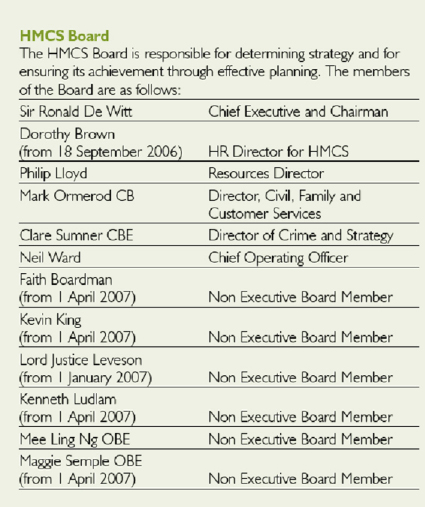
Annex C- Organisational Structure of CPS in England and Wales[47]
Annex D-Current Organisational Structure of NI Court Service[48]
Director |
MB |
|||||||||||
Finance Directorate |
Policy & Legislation |
Public |
Court |
Tribunal |
||||||||
Finance |
Criminal |
Legal |
Business |
Business Operations |
Business Development |
Tribubal Operations |
||||||
Court Funds |
Civil |
LSC |
HRU |
BCC |
Operational Policy |
Tribunal |
||||||
Audit |
Information Service |
RCJ |
Service Improvement |
|||||||||
Procurement |
Judicial |
Enforcement Business |
Business Modernisation |
|||||||||
Regional |
||||||||||||
LCJ’s |
JAC |
LSC |
Annex E- Current Organisational Structure of PPSNI[49]
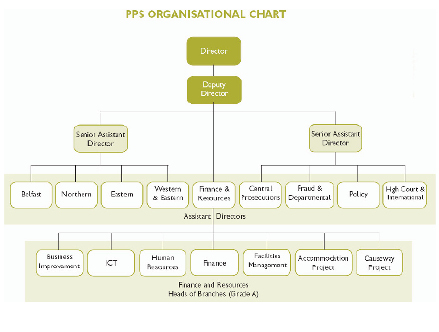
[1] The Courts Act 2003, S.2 (1), http://www.opsi.gov.uk/acts/acts2003/ukpga_20030039_en_3
[2] HMCS, “Working together; Annual Report and Accounts, 2006-2007”, Pg 1 http://www.hmcourts-service.gov.uk/cms/files/HMCSAnnualReportAndAccounts-2006-07.pdf
[3] Ibid, Pg 25.
[4] HMCS, “Her Majesty’s Court Service Framework Document”, Pg 13. http://www.hmcourts-service.gov.uk/cms/files/framework_document_final.pdf
[5] Courts Act 2003, S.1(1).
[6] Ibid , S. 1(4)
[7] HMCS, “Her Majesty’s Court Service Framework Document, Pg 13.
[8] Ibid, Pg 14.
[9] Ibid, Pg 15.
[10] The following information on the Chief Executives responsibilities is taken from “Her Majesty’s Court Service Framework Document”, Pg 14. http://www.hmcourts-service.gov.uk/cms/files/framework_document_final.pdf
[11] Her Majesty’s Court Service “Working Together: Annual Report and Accounts 2006-2007”, pg 25
[12] http://www.hmcourts-service.gov.uk/cms/files/HMCSAnnualReportSection2.pdf
[13] Id.
[14] Id.
[15] Id.
[16] HMCS, “Working together; Annual Report and Accounts, 2006-2007”, Pg 26.
[17] Crown Prosecution Service: Annual Report and Resource Accounts 2006-2007, Pg 90
[18] Prosecution of Offences Act 1985, S.1(1).
[19] Crown Prosecution Service: Annual Report and Resource Accounts 2006-2007, Pg 3
[20] Id.
[21] http://www.attorneygeneral.gov.uk/sub_our_role_work.htmhttp://www.attorneygeneral.gov.uk/sub_our_role_work.htm
[22] Memorandum from the Attorney General to the Constitutional Affairs Committee on its Inquiry into the Constitutional Role of the Attorney General, 6th February 2007, Pg 2. http://www.attorneygeneral.gov.uk/attachments/Constitutional%20Affairs%20Committee%20-%20Inquiry%20into%20the%20Role%20of%20the%20Attorney%20General%20-%20Memorandum.pdf
[23] Prosecution of Offences Act 1985, S. 9.
[24] Crown Prosecution Service: Annual Report and Resource Accounts 2006-2007, Pg 3
[25] http://www.courtsni.gov.uk/NR/rdonlyres/6B3484D3-CDA2-41E9-B03F-14C6B0760340/0/p_tp_Business_Plan20072008.pdf , Pg 10
[26] See NIO (2006) Devolving Policing and Justice in Northern Ireland: A Discussion Paper” Pg 34
[27] Id.
[28] Public Prosecution Service Annual Report, 2006-2007 http://www.ppsni.gov.uk/site/default.asp
[29] Justice (NI) Act 2002 http://www.legislation.gov.uk/acts/acts2002/ukpga_20020026_en_4#pt2-pb3-l1g29 and http://www.ppsni.gov.uk/site/default.asp
[30] Public Prosecution Service Annual Report, 2006-2007.
[31] Id.
[32] See NIO (2006) Devolving Policing and Justice in Northern Ireland: A Discussion Paper” Pg 12.
[33] Id.
[34] CJNI “An Inspection of the Public Prosecution Service for Northern Ireland”, July 2007, Pg 4.
[35] Id.
[36] Public Prosecution Service Annual Report, 2006-2007 http://www.ppsni.gov.uk/site/default.asp
[37] Id.
[38] Id
[39] The following information is taken from NIO (2006) Devolving Policing and Justice in Northern Ireland: A Discussion Paper” Pgs 12-13
[40] Id
[41] Id
[42] Id
[43] Official Report of the Assembly and Executive Review Committee on Devolution of Policing and Justice, 16th October 2007
[44] Id.
[45] HMCS “Working Together: Annual Report and Accounts 2006/2007”. Pg 29
[46] Ibid at Pg 30
[48] Diagram taken from http://www.courtsni.gov.uk/NR/rdonlyres/8E2F9559-D96D-4D2F-B64E-7AE639EE4550/0/organisational_chart.pdfww
[49] Criminal Justice Inspection Northern Ireland, “An Inspection of the Public Prosecution Service in Northern Ireland”, July 2007. Pg122. http://www.cjini.org/Publications/documents/PPSReportWeb.pdf
Other Papers
The Accountability of the Judiciary
Introduction
Individual judges and the position of the judiciary as a branch of the state
The respective responsibilities of the Lord Chancellor and the Lord Chief Justice
Issues and principles
What is meant by “accountability”?
For what should individual judges and the judiciary as an institution be accountable?
To whom are individual judges and the judiciary accountable?
The accountability of individual judges
Accountability to the executive of the state
Accountability to the legislative branch of the state
Internal accountability to “the judiciary”
Accountability to the public
The limits of these forms of accountability and practices
The institutional accountability of the judiciary
Introduction
Accountability to the executive branch of the state
Accountability to the legislative branch of the state
Accountability to the public and amenity to scrutiny by civil society
Summary
Introduction
The constitutional changes reflected in the Constitutional Reform Act 2005 (“CRA”), in particular the displacement of the Lord Chancellor as the Head of the Judiciary and the creation of a Supreme Court, led to new interest in the judiciary as an institution and in the issue of the accountability of judges and the judiciary.
Both individual judges and the judiciary as a branch of the state are subject to a number of forms of accountability which are not incompatible with their individual and institutional independence. These are, however, not always understood: nor are the necessary limits to judicial accountability required to protect that individual and institutional independence.
So in what sense, if any, are they “accountable”, and to whom?
The forms of accountability and their limits are discussed below. The limits result from the acknowledged need in a democracy for an independent and impartial judiciary which is free from improper influence.
Individual judges and the position of the judiciary as a branch of the state:
In the past, attention has primarily been focussed on the position of individual judges. There was almost no consideration of the position of the judiciary as an institution. The reason for this was that the Lord Chancellor, as the Head of the Judiciary, was responsible through Parliament to the public for the overall efficiency of the justice system. Accountability was thus achieved through the ordinary channel of ministerial responsibility.[1] There was little need for the consideration of the position of the judiciary as an institution separately from the position of the Department and Minister responsible for the justice system. This has now changed.
The respective responsibilities of the Lord Chancellor and the Lord Chief Justice:
The present position, as now more clearly demarcated by the CRA and the Concordat, is:-
- The Lord Chancellor remains responsible through Parliament to the public for the funding of and the provision of the administrative system for the courts pursuant to Part 1 of the Courts Act 2003. In particular, pursuant to section 1 the Lord Chancellor is responsible for ensuring “that there is an efficient and effective system to support the carrying on of the business of” the courts, that is the provision and allocation of resources for the court service and the judiciary, and for the education and training of the judiciary. The Lord Chancellor is also responsible for setting the framework for the organisation of the court system, including functional and geographical jurisdictional boundaries.
- The Lord Chief Justice is responsible for deployment of individual members of the judiciary, the judicial business of the courts (including the allocation of work within the courts), and the well-being, training and provision of guidance for the judiciary.
- There is concurrent responsibility for some matters, for example appointment of Presiding Judges and discipline. Responsibility for other matters is allocated to either the Lord Chancellor or the Lord Chief Justice, but subject to a duty to consult the other.
This requires there to be a working relationship between the Lord Chancellor and the Lord Chief Justice.
The accountability of individual judges and of the judiciary as an institution, a branch of the state is considered below. Under current legislation the position of tribunal judges differs from that of the judiciary and their position is not considered.
Issues and principles
There are three issues: what is meant by “accountability”, and for what and to whom should individual judges and the judiciary as an institution be accountable.
What is meant by “accountability”?
Accountability was once seen as part of a command and control relationship. Today, however, the concept is more fluid including a number of practices which explain, justify and open the area in question to public dialogue and scrutiny. The difference is captured by Professor Vernon Bogdanor’s distinction between “sacrificial” and “explanatory” accountability.[2] The former involves taking the blame for what goes wrong, and forfeiting one’s job if something goes seriously wrong. The latter involves giving an account of stewardship, for instance, in the case of ministers to Parliament and to the electorate.
It is generally accepted that, save in accordance with the Act of Settlement 1701, judges cannot be held accountable either to Parliament or to the executive in the sacrificial sense and that they cannot be externally accountable for their decisions. Such accountability would be incompatible with the principle of the independence of the judiciary. But, save for the House of Lords, they are held to account by higher courts hearing appeals, and (save where the issue is one of EU law) it is open to Parliament to legislate in order to reverse the effect of a decision or body of doctrine. Moreover, the duty to give reasons for decisions is a clear example of “explanatory” accountability which assists transparency and scrutiny by the other branches of the state and the public (as well as facilitating appeals).
Some consider that a judge cannot be both independent and externally accountable, and that even “explanatory” accountability is incompatible with or a danger to judicial independence. The late Lord Cooke of Thorndon argued that “… [j]udicial accountability has to be mainly a matter of self-policing; otherwise, the very purpose of entrusting some decisions to judges is jeopardised”.[3]
In relation to the judiciary of England and Wales, it is suggested that the position now is that there are a number of practices which can be understood as forms of accountability in one or other of the senses of that term. They and their limits are discussed in the paragraphs below. It is suggested that their limits stem from the requirements of the principle of judicial independence.
For what should individual judges and the judiciary as an institution be accountable?
Once there is recognition that some practices which fall within the broad and amorphous meaning now given to the term “accountability” are not incompatible with the independence of individual judges and the judiciary, the question arises as to what these are and for what the judiciary should be accountable.
In answering this question the following five principles are of central importance:
a. The nature and form of accountability depends on the responsibilities and conduct of the individual or the group.
b. The vital importance of the independence of individual judges and the judiciary as a body, now recognised by section 3 of the CRA, follows from the judiciary’s core responsibility as the branch of the state responsible for providing the fair and impartial resolution of disputes between citizens and between citizens and the state in accordance with the prevailing rules of statutory and common law.
c. Neither individual judges nor the judiciary as a body should be subject to forms of accountability prejudicing that core responsibility.
d. Within the resources provided, and subject to the areas for which there is shared responsibility with the Lord Chancellor, the responsibility of the Lord Chief Justice for deployment of individual judges, the allocation of work within the courts, and the well-being, training and guidance of serving (full and part-time) judges, mean that the judiciary is responsible for:-
i. An effective judicial system, including the correction of errors;
ii. Training judges in the light of changes in law and practice; and
iii. Identifying and dealing with pastoral, equality, and health and safety issues concerning serving judges.
The Lord Chancellor and the Lord Chief Justice share responsibility for the provision of a complaints and disciplinary system to identify and deal with issues of competence, misconduct, and personal integrity.
e. Within a common law system the judiciary is responsible for the interpretation of statutes and the development of the non-statutory principles embodied in case-law. This is done by the system of precedent and incremental development of the principles of law, in particular by appellate courts.
Comments on these principles:
“a”: This follows from the proposition that one cannot properly be made accountable for that for which one is not responsible. Accordingly, for example, notwithstanding the extent of judicial representation on the Judicial Appointments Commission, it is the Commission and not the judiciary which is responsible for and therefore accountable for appointments and it is the Lord Chancellor who is responsible for and therefore accountable for providing resources for the courts and the judiciary. For this reason, issues of accountability concerning the appointment process and the resourcing of the courts are not discussed.
“b”: Judicial independence is not an absolute concept and there are many formulations of it.[4] There is, however, general agreement that the minimum requirements are that the judiciary is impartial, that its decisions are accepted, that it is free from improper influence, and that it has jurisdiction, directly or by way of review, over all issues of a justiciable nature so that it is capable of rendering justice on all issues of substantial legal and constitutional importance.[5]
“c”: The executive, legislative and judicial branches of the state should show appropriate respect for the different positions occupied by the other branches (see e.g. the Commonwealth’s Latimer House Principles). The need for appropriate respect for the different positions occupied by others also applies to respect for and by the media. The branches of the state should respect the importance in a democratic society of vigorous scrutiny by the media, and the media should recognise the positions of and restrictions on the branches of the state, including the judiciary. The limits of what it is proper for judges to say to Parliamentary Committees, Ministers, the media, or in lectures, follow from the need to safeguard the core constitutional responsibility of the judiciary. The corollary should be that government ministers, Members of Parliament, and the media should also respect the need to safeguard and to avoid prejudicing or corroding this core responsibility. That should limit what it is appropriate to say to or about judges and individual decisions.
“d”: The structure of the system including the appellate process and the process for making complaints about the conduct of judges is determined by statute and regulation and, in the case of complaints and discipline, by the Concordat.[6] The appropriate forms of accountability are thus in part identified by those instruments. To furnish information about court process, delays, workloads, training, appeals, complaints, lack of integrity and misconduct and equality issues to Parliament and the public is an appropriate way of explaining, justifying and opening these areas to public examination and scrutiny. It can also identify the boundary between the respective responsibilities of the judiciary (for the business of the courts) and of the Lord Chancellor (for resourcing the courts) and HMCS (for providing court buildings and court staff). To voluntarily offer what is a form of “explanatory” accountability for the matters which are the responsibility of the judiciary set out in “d” is not inconsistent with the requirements of judicial independence.
“e”: One of the justifications for two levels of appeal (to the Court of Appeal and then to the House of Lords) is the particular responsibility of the judiciary in a common law system for developing the law.
To whom are individual judges and the judiciary accountable?
Four forms of accountability are considered:-
- Internal accountability to more senior judges or courts by way of (a) the system of appeals against judicial decisions, and (b) procedures for dealing with complaints about the conduct of judges,
- External accountability to the public by way of amenability to scrutiny in particular by the media, but more widely by civil society,
- Accountability to the executive branch of the state (the government), and
- Accountability to the legislative branch of the state (Parliament).
These forms of accountability overlap. For instance, the appeal and complaints processes provide both internal accountability and accountability to the public, and the giving of evidence to legislative committees provides direct accountability to Parliament and indirect accountability to the public.
The accountability of individual judges
Accountability to the executive of the state:
Under the Act of Settlement 1701 and subsequent legislation (currently the Supreme Court Act 1981, section 11(3) as amended by the CRA) judges of the High Court and the Court of Appeal hold office during “good behaviour”. This protection was given to protect judges against the power of the executive. These judges are not individually accountable to the executive in their capacity as such in either the “sacrificial” or the “explanatory” senses. It is axiomatic that safeguards on their tenure are a vital part of the independence of the judiciary.
That is not to say that the executive in the form of the Lord Chancellor has no role to play in the consideration of complaints and disciplinary proceedings made against judges. Such accountability, however, is subject to the limits set out in the CRA and the Concordat. The fundamentally important requirement is that the Lord Chancellor and the Lord Chief Justice have to agree before a judge is removed or disciplined in some other way. The fact that both have a role ensures that the independence of an individual judge is not improperly infringed, either by the executive, or internally by another member of the judiciary.
Accountability to the legislative branch of the state:
As has been stated, both Houses of Parliament have the power, originating in the Act of Settlement, to petition the Queen for the removal of a judge of the High Court and the Court of Appeal, i.e. the ultimate form of accountability. It has not been exercised in modern history.
Turning to other forms of accountability, subject to a rule (“the sub judice rule”) preventing the discussion of ongoing cases, the decisions and conduct of individual judges may be mentioned in debates in either House. This, however, does not mean that judges are accountable to Parliament for their decisions in particular cases, save insofar as Parliament may legislate to reverse the effect of a decision (on which see below). Accountability for their decisions is incompatible with judges’ necessary independence.
Individual judges may also be invited to give evidence to Parliamentary Committees. Under Standing Orders, Select Committees and their sub-Committees have power to “send for persons, papers and records” relevant to their terms of reference. In modern times judges who have been asked to attend have done so voluntarily, subject to the well-established and long-standing rules and conventions that prevent judges from commenting on certain matters.[7] Parliamentary Committees respect these rules and conventions. The prohibited matters include; the merits of government policy, the merits of individual cases whether involving that judge or other judges, or of particular serving judicial officers, politicians and other public figures, and the merits, meaning or likely effect of provisions in prospective legislation.
Internal accountability to “the judiciary”:
In the sense that their decisions are subject to appeal and other judges are responsible for the allocation of cases to them, individual judges are accountable to senior judges or judges holding positions of responsibility. As for the conduct of judges, a working group established by the Judges’ Council published a Guide to Judicial Conduct in October 2004.[8] This seeks to provide guidance on matters such as; impartiality, integrity, competence and diligence, personal relationships and perceived bias and activities outside the court.
The responsibilities of the Heads of Division, Presiding, Resident and Family Liaison and Chancery Supervision Judges, and judges in charge of a particular jurisdiction, are designed to assist in the effective management of judicial work.[9] They must be exercised with due regard to the importance of the need to respect the independence of individual judges in relation to the decisions before them. This means, for example, that they cannot tell another judge how to decide a case. Decisions as to listing and allocation are designed to ensure that cases are heard by an appropriate judge and that the available judiciary is fully and effectively deployed within the resources provided by the executive branch of the state. It is to be observed, however, that one of the guarantees of independence under Article 6 of the European Convention of Human Rights, reflecting underlying common law principle, is that judges must be free from outside instructions or pressure from other members of the court or the judiciary. This limits the extent and form of discipline to which a judge may be subjected.
Accountability to the public:
The formal processes of court proceedings provide a form of accountability to the public enabling scrutiny of the work of individual judges. As a general rule court proceedings and the decisions of judges are made in public. Decisions must be reasoned, and are subject to comment, often robust comment, by the media and other commentators. The quality of individual decisions is also subject to control in the form of appeal to higher courts against alleged errors. This identification and correction of error by appellate courts is also public and reasoned.
Complaints against the personal conduct of the judiciary (other than against decisions in proceedings) are handled by the Office for Judicial Complaints. Ultimately a report is made to the Lord Chief Justice and Lord Chancellor. Complaints about the handling of such complaints can be made to the Judicial Appointments and Conduct Ombudsman.
The limits of these forms of accountability and practices:
Reference has been made to the limits on what a judge may properly deal with in giving evidence to a Parliamentary Committee and the fact that High Court Judges and above can only be removed by the Queen on an address from both Houses of Parliament. Other judges can be removed for incapacity or misconduct pursuant to statutory powers.
When the Lord Chancellor was Head of the Judiciary he exercised the power to remove members of the circuit and district benches alone. The changes in the nature of the office of Lord Chancellor in 2003 mean this is no longer appropriate and the CRA and the Concordat provide he may only do so if the Lord Chief Justice agrees.[10] The Lord Chief Justice may only suspend a person from a judicial office if the requirements of section 108(4)-(7) are satisfied.
Judges of the High Court and the Court of Appeal court are also absolutely immune from personal civil liability in respect of any judicial act done in the bona fide exercise of their office as a judge of that court.
The position of circuit and district judges who sit in courts of limited jurisdiction is different. They may be in certain circumstances liable in tort for acts beyond their jurisdiction and to judicial review proceedings. The immunity extends to judicial acts undertaken by officers of the courts but not to administrative acts by HMCS.
The reason for a judge’s immunity from civil suit is “so that he should be able to do his duty with complete independence and free from fear”. It is not because the judge has any privilege to make mistakes or to do wrong. The appeal system deals with such matters, and the criminal courts deal with criminal wrongdoing.[11]
The institutional accountability of the judiciary
Introduction:
There are clear links between the features of individual accountability and the question of institutional accountability.
It is important to distinguish the accountability of the judiciary as an institution from that of the courts as an institution and that of HMCS. This is because of the responsibility of the Lord Chancellor for the resourcing of the courts. For example, if a lack of resources means there are insufficient courts, court staff or judges and the result of this is delay, it is the Lord Chancellor and not the judiciary who is responsible and accountable.
The responsibility of the judiciary for the deployment of judges, training, pastoral issues, part of the complaints and disciplinary system, and the provision of an effective judicial system within the resources provided mean that it is legitimate for there to be some form of accountability in respect of these matters. In respect of those matters on which the judiciary share responsibility with the Lord Chancellor, it is legitimate for there to be a measure of “explanatory” accountability by the judiciary. The remainder of this section considers existing forms of such accountability.
Accountability to the executive branch of the state:
The reasons precluding the accountability of individual judges to the executive apply equally to institutional accountability. In the light of the dangers to judicial independence of direct accountability to the executive, it would appear that the primary forms of accountability must either be to the legislature or to the public in the sense that the system is made amenable to and subjected to scrutiny by civil society.[12]
Accountability to the legislative branch of the state:
This takes a number of forms. The first is strictly a matter of control rather than accountability. Save where the issue is one of EU law, Parliament may change the law by legislation reversing a decision or decisions concerning the interpretation of a statute or a body of common law doctrine.
Judges also give evidence to legislative committees in a representative capacity. The basis for such invitations and the matters on which judges should not give evidence are set out above, and more fully, in July 2006 Guidance produced by the Judicial Executive Board (JEB).[13] The Guidance recognises that an individual judge might appear as a representative. It states that judges should carefully consider whether they can answer questions about matters concerning the administration of justice which fall outside their area of judicial responsibility or previous responsibility.
The boundaries of legitimate questioning reflect the need to protect the independence and impartiality of the judiciary. Increasingly, committees are interested in hearing from a judicial witness who can give evidence in a representative capacity, although there are also invitations to judges because of their experience. Senior judges including the Lord Chief Justice, the Master of the Rolls, President of the Queen’s Bench Division, President of the Family Division, the lead judge in the Administrative Court, the Judge Advocate General, and the Senior District Judge responsible for extradition have responded to invitations by Parliamentary Committees and have given evidence in a representative capacity.
The giving of evidence pursuant to such invitations by representatives of the judiciary, including those responsible for a particular jurisdiction, is a form of institutional “explanatory” accountability. The accountability is primarily to Parliament, but indirectly it is also to the public. Select Committees can also be an appropriate forum for the Lord Chief Justice or other senior judges to explain or state their views on aspects of the administration of justice that are of general interest or concern and upon which it is appropriate for them to comment. The appearance of judges before Select Committees should, however, be a relatively rare, and thus a significant event less the proper boundary between the judiciary and Parliament is crossed. Appearances by judges before Parliamentary Committees should be a relatively rare and significant event. Such appearances must be truly necessary and appropriate.
Accountability to the public and amenity to scrutiny by civil society:
Some of the forms of accountability discussed above can be seen as an indirect form of accountability to the public. This is so in the case of the formal processes of court proceedings and the appellate process. These enable scrutiny of the outcomes of cases and comment by the press, interested parties and commentators. In addition, there is also the giving of evidence to Parliamentary Committees by representatives of the judiciary on occasions where this is truly necessary and appropriate.
Interviews and media briefings: The giving of interviews and subjecting oneself to questions by representatives of the press and other media is certainly a form of accountability. From time to time, at any rate since Lord Taylor became LCJ in 1993, the holder of that office has given occasional interviews and media briefings, as have other senior members of the judiciary.
The judiciary’s website: Much information about the judiciary is now available to the public on the judiciary’s website. It has assisted in explaining and opening up the work of judges to public scrutiny. There are sections on ‘About the Judiciary’, containing sections inter alia on ‘roles and types of jurisdiction’, ‘Judges and the Constitution’, ‘Conduct, complaints and appeals’, ‘Terms of service’, and ‘Court dress’. The focus of the site is on accessibility and on matters which are considered to be of interest to the public.
Annual Reports: The annual reports on the operation of particular jurisdictions and the report that the Lord Chief Justice makes to the Queen and Parliament are another and more direct form of accountability to the public.
Annual reports are made by the Civil and Criminal Divisions of the Court of Appeal, the Commercial and Admiralty Courts, and the Technology and Construction Court, the regional reports by the Crown, County, Family and Magistrates Courts, and “overview” reports by the Senior Presiding Judge on the Crown and County Courts, and by the President of the Family Division on the Family Courts. There are also reports by the Judges’ Council by the Ethnic Minority Liaison Judges on the judiciary’s website, and the JSB publishes an annual report which can be seen on its website. HMCS also publishes the annual Judicial Statistics.
Formal complaints about personal conduct and other complaints against judges will be considered by the Office for Judicial Complaints (OJC) and the Judicial Appointments and Conduct Ombudsman (JACO). Both publish annual reports.
The court reports and Judicial Statistics provide a statistical analysis of the work and waiting times based on the figures provided by HMCS. Many of them discuss significant developments and assessments of the implication of trends. The other reports referred to, such as the Judicial Studies Board (JSB) annual report, also contain much valuable information. The reports are valuable tools for external scrutiny of the system and are thus potentially another and more direct form of accountability to the public for the administration of justice.
The court reports do not always clearly identify and separate the respective responsibilities of the department, HMCS, and the judiciary and thus the respective areas for which each should be accountable. While this means that they are not purely tools for the accountability of the judiciary, they do in part provide such accountability. They are important sources of information for the public, for Parliamentarians, and for the government. They are also an important resource for the judiciary in that it is the detailed information in reports which enable the judiciary to comment, for example in the Lord Chief Justice’s annual report, on matters such as the condition of the court estate, staffing levels, and the provision and allocation of resources.
Summary
Individual judges are subject to a strong system of internal accountability in respect of legal errors and personal conduct, but outside the judiciary these are often not understood in terms of accountability.
Individual judges are accountable to the public in the sense that in general their decisions are in public and are discussed, often critically, in the media and by interest groups and sections of the public affected by them. The judiciary is similarly institutionally accountable in respect of first instance and appellate decisions.
Neither individual judges nor the judiciary are, nor should they be, accountable to the executive branch of the state because that is inimical to the judicial independence which is a necessary requirement for the discharge by judges of their core responsibility to resolve disputes fairly and impartially. The Lord Chancellor’s role in the consideration of complaints and disciplinary proceedings against judges is not inconsistent with this. The requirement that the Lord Chancellor and the Lord Chief Justice have to agree before a judge is removed or disciplined in some other way ensures that the independence of an individual judge is not improperly infringed, either by the executive, or internally by another member of the judiciary.
Individual judges should not be accountable to Parliament for their decisions or for matters which fall outside their area of judicial responsibility or previous responsibility, but may be invited to give evidence to Select Committees on the operation of the jurisdictions for which they are responsible and in which they operate. The matters on which they should not answer questions are set out in the Judicial Executive Board’s Guidance. Senior judges are accountable to Parliament through the procedure for removal set out in the Act of Settlement, but there are no examples of dismissal being considered let alone exercised in modern times. There are, however, a small number of examples of senior judges resigning following public discussion about their conduct, including delay in delivering judgment.
When representatives of the senior judiciary and those responsible for particular jurisdictions give evidence to Select Committees on aspects of the administration of justice that are of general interest or concern and upon which it is appropriate for them to comment this can be seen as a form of institutional accountability to Parliament and through Parliament to the public. The boundaries of legitimate questioning are indicated in the Guidance.
The annual reports on the operation of particular jurisdictions and that by the Lord Chief Justice to The Queen in Parliament are valuable tools for external scrutiny of the system and are thus another form of accountability for the administration of justice.
[1] See e.g. Irvine Human Rights, Constitutional Law and the Development of the English Legal System (2003) 205; Shetreet, Judges on Trial: A Study of the App 1. See e.g. Irvine Human Rights, Constitutional Law and the Development of the English Legal System (2003) 205; Shetreet, Judges on Trial: A Study of the Appointment and Accountability of the English Judiciary (1976), 39-41.
[2] Bogdanor, Parliament and the Judiciary: The Problem of Accountability, (Third Sunningdale Accountability Lecture 2006); Le Sueur in Independence, Accountability and the Judiciary (BIICL 2006), eds Andeanas and Fairgrieve, 49-50.
[3] Robin Cooke, ‘Empowerment and Accountability: the Quest for Administrative Justice’ (1992) 18 Commonwealth Law Bulletin 1326.
[4] See the United Nations Basic Principles on the Independence of the Judiciary (1985), the European Charter on the Statute for Judges, adopted by the Council of Europe in 1998, the Bangalore Principles of Judicial Conduct, 2002, the Commonwealth (Latimer House), Principles on the Accountability of and the relationship between the Three Branches of Government, agreed by Commonwealth Law Ministers and Heads of Government in 2003, and the Beijing Statement of Principles of the Independence of the Judiciary.
[5] See for example, page 10 of the Latimer House Principles.
[6] There are currently discussions between the Lord Chancellor and the Lord Chief Justice about their respective responsibilities in relation to HMCS.
[7] Guidance to judges agreed by the Judicial Executive Board in July 2006 is available on this website: www.judiciary.gov.uk.
[8] Available on the judiciary’s website: www.judiciary.gov.uk.
[9] See The Responsibilities of Resident Judges and Designated Civil and Family Judges (July 2004), esp. paragraphs 9, 10(a) and 11(a).
[10] Section 17(4) of the Courts Act 1971 and section 11(5) of the County Courts Act 1984, both as amended by paragraphs 68 and 164 of Schedule 4 to the CRA.
[11] Sirros v Moore [1975] 1 QB 118, 133, 148. See also Re McC [1985] AC 528.
[12] No public funds are entrusted directly to the judiciary as opposed to the Directorate for Judicial Offices for England and Wales.
[13] Available on the judiciary’s website: www.judiciary.gov.uk. ointment and Accountability of the English Judiciary (1976), 39-41.
Management of the Courts:
the Irish Experience
1. Background
Until the coming into operation of the Courts Service Act 1998, the arrangements for the management and administration of the courts in Ireland had remained essentially unchanged since the Courts of Justice Act 1924, which provided the courts system of the new State shortly after independence.[1] It could be said that the 1924 regime left a vacuum, in that no provision was made for an independence administrative structure for the Courts (i.e. no Department such as the Lord Chancellor’s Department). The scheme implemented was that the Department of Justice managed the Courts and their funding apart from judicial salaries. Those arrangements followed what is often loosely referred to as the “Ministry of Justice” model. Responsibility for the provision of budgetary, staffing and other resources, and the management of those resources, rested with the Department of Justice, Equality and Law Reform, as it is now known, through its Courts Division. As distinct from the allocation of business before the courts, the Judiciary – although they might be consulted and make representations – had little input into the allocation of such resources or the way in which they were deployed.
The extent of the Minister for Justice’s remit - and limits of the Judiciary’s – in this regard is best summed up by the provisions which governed the management of the various offices of the High Court and staffing arrangements for the Superior Courts generally. Senior management in the courts were “subject to the general direction of the Minister in regard to all matters of general administration” and answered to the senior Judiciary (the Chief Justice in the case of the Supreme Courts and the President of the High Court in the case of that court) on matters relating to the conduct of the business of the court required by law to be transacted before a judge.[2] The Minister for Justice, with the sanction of the Minister for Finance and after consultation with the Chief Justice and the President of the High Court in relation to the offices of the Supreme Court and High Court respectively, determined how many and what categories of court officers and ancillary staff would be deployed in the offices concerned and, after similar consultation, how they were deployed.[3]
Concern about the deficiencies in the system was such that, by the mid-1990s, proposals for new machinery to administer the courts had entered the agendas of successive governments.[4] The Working Group on a Courts Commission, chaired by The Hon. Mrs Justice Denham, Judge of the Supreme Court, was established by the Minister for Justice in October 1995 to: -
1. “review:
(a) the operation of the Courts System, having regard to the level and quality of service provided to the public, staffing, information technology, etc;
(b) the financing of the Courts system, including the current relationship between the Courts, the Department of Justice and the Oireachtas in this regard; and
(c) any such aspect of the operation of the Courts system which the Group considers appropriate; and
2. in the light of the foregoing review, to consider the matter of the establishment of a Commission on the Management of the Courts as an independent and permanent body which financial and management autonomy...”
and to report its recommendations to the Minister.
In the first report, published in 1996[5], the Working Group recommended the establishment as a matter of urgency under statute of an independent and permanent body to manage a unified court system, supervised by a Board chaired by the Chief Justice or the Chief Justice’s nominee, and composed, “in light of the constitutional parameters involved”[6], of a majority of judges of the various jurisdictions, as well as representatives of the Department of Justice, each branch of the legal profession, court staff, court users, business and the trade unions. Day to day operational responsibility would lie with a Chief Executive who would, in respect only of the financial and administrative management of the Courts Service, be accountable to the Oireachtas (Legislature). These recommendations led to the enactment of the Courts Service Act, 1998 in April of that year and the establishment of the Courts Service, initially under transitional arrangements, and in November 1999 as a permanent agency. The courts administration model in Ireland was thus recaste as an “independent agency” model, to which more detailed reference is made later.
2. The Judiciary and Judicial Independence
Management of the Judiciary has always been a matter for the Chief Justice, as leader of the Judiciary, and the Presidents of the other court jurisdictions. In formal terms, however, the powers of management given by statute to the Chief Justice and the Presidents are quite limited, being confined essentially to allocation of business to and among judges. Quite apart from the provisions of the Constitution guaranteeing the independence of the exercise of the judicial function,[7] the Courts Acts contain express safeguards to ensure that the conduct of the business of their court is controlled by judges, and that officers of the court observe the directions of the Judiciary while engaged on duties relating to the business of the court.[8]
Judges were understandably concerned about the separation of powers and the independence of the judiciary. After lengthy and careful consideration the Working Group recommended that it would be appropriate for Judges to work alongside others on matters relating to the administration and management of the Courts.
3. The Courts Service
3.1 Functions
The statutory mandate given to the Courts Service on its establishment emphasises the roles of that organisation as court manager and service provider. Under section 5 of the Courts Service Act, 1998, the functions of the Service are to:
(a) manage the courts,
(b) provide support services for the judges,
(c) provide information on the courts system to the public,
(d) provide, manage and maintain court buildings, and
(e) provide facilities for users of the courts.
Powers ancillary to Courts Service’s functions include: -
½ Acquire, hold and dispose of land
½ Enter into contracts
½ Make proposals to the minister in relation to – reform and development, the distribution of jurisdiction and business among the courts and matters of procedure
½ Designate court venues
The Service is a body corporate with perpetual succession and power to sue or be sued. The Service is subject to the legislation, independent in the performance of its functions. The Board may establish such committees as it considers fit to advise it and must notify the Minister of the establishment of committees, their functions and membership.[9]
A leading commentary on the administration of justice in Ireland has described this development as:
“a fundamental shift in the “philosophy” of the courts system, requiring it to take account of the concepts of quality, service and competitiveness more associated heretofore with the private sector…there can be no doubt of move from “court system” to “court service”.[10]
The functions previously exercised by the Minister under the Courts Acts in respect of court management and administrations were transferred from the Minister to the new agency[11]. The Department of Justice, Equality and Law Reform retained responsibility for securing the annual vote of funds from the Oireachtas. Some staff from the Department’s Courts Division were transferred to the Service. The Department now oversees the vote and manages its relationship with the Judiciary and the Courts Service through a slimmed down Courts Policy Division.
4. Functions of the Board
The Board considers and determines policy (operational policy for the Service) in relation to the Service, and oversees its implementation by the Chief Executive Officer.[12]
4.2 Membership of the Board
Reflecting the Working Group’s recommendations, the Board consists of
- the Chief Justice for the time being or a judge of the Supreme Court nominated by the Chief Justice, as Chairperson
- the Presidents of the High, Circuit and District Courts
- a judge nominated by the Chief Justice in “respect of his or her experience or expertise in a specific area of court business”
- a judge from each of the courts aforementioned other than the court president, elected by the ordinary judges of the courts concerned
- the Chief Executive
- a practising barrister nominated by the Bar Council
- a practising solicitor nominated Law Society
- a member of the staff of the Courts Service
- an officer of the Minister for Justice, Equality and Law Reform nominated by the Minister
- a person nominated by the Minister to represent “consumers of the services provided by the courts”
- a person nominated by the Irish Congress of Trade Unions, and
- a person who, in the Minister’s opinion, “has relevant knowledge and experience in commerce, finance or administration and who is nominated by the Minister after consultation with such bodies as the Minister considers are representative of such interests in the State”
Members of the Judiciary, therefore, have 9 of the 17 places on the Board. It should be emphasised, however, that the Judiciary has never found it necessary to rely on its majority, matters of policy being determined by the Board largely by consensus and in a spirit of collaboration.
4.3 Term of Office of Members
The term of office for Board Members generally is 3 years. The Chief Justice, the President of each Court and the Chief Executive Officer are ex-offico members of the Board.
4.4 Meetings of the Board
The Board meets as often as it considers necessary but must not meet less than once in every period of 3 months.[13]
5. Functions of the Chief Executive Officer
The Chief Executive manages and controls generally the staff, administration and business of the Service and such other functions as may be conferred on him or her by or under the Act or by the Board. The Chief Executive is responsible to the Board for the performance of his or her functions and the implementation of the Board’s policies. The Chief Executive provides to the Board such information (including financial information) in relation to the performance of his or her functions as the Board may from time to time require.[14]
The Chief Executive is the accounting officer for the appropriation accounts of the Service, and attends before Oireachtas Committees including the Public Accounts Committee.[15]
6. Accountability
The Board must prepare and submit to the Minister an Annual Report each year. The Report must include information on the performance of its functions. The Board must also supply to the Minister any information the Minister requests relating to its functions. The Board is accountable to the public through the publication of its annual report.[16]
In overseeing expenditure of resources allocated, the Courts Service Board is required to have regard to
- the resources available and the need to secure “the most beneficial, effective and efficient use of such resources”, and
- any policy or objective of the Government or a Minister of the Government insofar as it may affect or relate to the functions of the Courts Service.[17]
Every 3 years the Board must prepare and submit to the Minister for approval a 3 year strategic plan. When approved, with or without amendments, the Minister must lay a copy of the plan before both houses of the Oireachtas. Strategic plans shall —
(a) comprise the key objectives, outputs and related strategies (including use of resources) of the Service,
(b) be prepared in a form and manner in accordance with any directions issued from time to time by the Minister,
(c) have regard to the need to ensure the most beneficial, effective and efficient use of the resources of the Service, and
(d) have regard to the Government policy on bilingualism and, in particular, to the need to ensure that an adequate number of staff are competent in the Irish language so as to be able to provide service through Irish as well as English.[18]
7. Role of the Minister for Justice, Equality & Law Reform
The Minister for Justice, Equality and Law Reform is politically accountable for the Service. Funding is negotiated through the Department of Justice, Equality and Law Reform. The Service has its budget voted directly by Dáil Éireann.
8. The Courts Service and the Judiciary
The 1998 Act contains provisions designed to ensure that the new arrangements did not permit either the Executive or the Legislature to encroach on matters that are appropriately the preserve of the judicial function. Section 9 provides:
“No function conferred on or power vested in the Service, the Board or the Chief Executive, under this Act shall be exercised so as to interfere with the conduct of that part of the business of the courts required by law to be transacted by or before one or more judges or to impugn the independence of—
(a) a judge in the performance of his or her judicial functions,
or
(b) person other than a judge in the performance of limited functions of a judicial nature conferred on that person by law.”
While the Chief Executive Officer may be called upon by a committee of the Oireachtas (Legislature) to “give account for the general administration” of the Courts Service, that obligation is qualified in that the CEO cannot be requested to give account for any matter relating to—
(a) the exercise by a judge of his or her judicial functions
or
(b) the exercise by a person other than a judge of limited jurisdiction of a judicial nature
including a matter which is, has been or may at a future time be the subject of proceedings before a court in the State. Where the CEO is of the opinion that a matter falls within these categories, he or she must inform the committee giving reasons and, should the committee not withdraw the request, the CEO or the committee chairperson may apply to the High Court for a ruling on whether the matter is excluded from inquiry. If the High Court does so determine, the Committee must withdraw the request. If the High Court determines that it is not a matter falling within the area of judicial functions, the CEO must attend before the committee to give account for it.[19]
9. Funding and Staffing
The Bulk of funding for the Service is provided by the State. The Budget for 2007 is €131m. The Service employs 1100 staff. The Service may only employ such number of staff as are approved by the Minister with the consent of the Minister of Finance.[20] The Service manages funds in a trustee capacity totalling €1.062bn. Fees collected annually amount to €32m.
A Judicial Support Unit within the Courts Service provides a “one stop shop” in delivering on the agency’s mandate to provide support services for judges, and the Courts Service also provides staffing and support to bodies such as the Judicial Appointments Advisory Board, the Judicial Studies Institute and the three Courts Rules Committees, all of which are independent of the Courts Service.
10. Obtaining and allocating resources
In common with other jurisdictions, the courts are largely dependent for funding and other resourcing on the other branches of Government. While judicial salaries are met from the Central Fund, the bulk of the Courts Service’s funding is secured by means of the annual vote of funds by the Oireachtas referred to earlier.
By contrast with the position in England and Wales, the courts in Ireland are not required to recover the full economic cost of their operations from court fees revenue, nor indeed could they be, given the limits set by case-law on the extent to which court fees may be imposed in light of the constitutionally guaranteed right of access to the courts.
Judges actively participate in the decisions on allocation of resources, both through their membership on the Board and through membership of committees and project boards, such as the Finance, Audit, Investment (the latter of which oversees investment policy in relation to the €1 billion in funds of beneficiaries managed by the courts), Family Law Committee and Buildings Committees and project boards such as for the new Criminal Courts Complex and ICT projects.
11. Reform
The 1998 Act gave to the Courts Service an advisory role not previously enjoyed by the court administration. The Courts Service is empowered to “make proposals to the Minister in relation to the distribution of jurisdiction and business among the courts and matters of procedure”.[21] The Service prepares proposals for amendments to primary legislation and court rules to modernise and reform court procedure. It provides a vehicle through which the Judiciary may have input into court reform without encroaching on the boundary between competencies of the Judiciary and the Executive.
12. Conclusion
The Irish courts governance model combines a strong combination of judicial and non judicial involvement in the setting of policy on the management and administration of the courts. The effective resourcing of the courts depends heavily on a successful partnership with the Executive (The Department of Justice, Equality and Law Reform). The partnership, as it has evolved in Ireland since 1998, has, it is fair to say, worked very well.
7th December 2007
[1] The jurisdictional arrangements established by the 1924 Act were substantially replicated on the reconstituting of the courts by the Courts (Establishment and Constitution) Act 1961
[2] Par.7, Eighth Schedule, Courts (Supplemental Provisions) Act, 1961
[3] Par. 22, Eighth Schedule, Courts (Supplemental Provisions) Act, 1961
[4] The “Programme for a Partnership Government” announced in 1993 by the Fianna Fáil-Labour Government of that year had included provision for the establishment of a Judicial Commission to examine and make recommendations on overall management of the courts and the streamlining of court services, the fixing of the courts’ budget and court charges, and the review and reform of court practice. The Fine Gael-Labour-Democratic Left Coalition Government which succeeded to office in December 1994, in its Programme “A Government of Renewal”, envisaged the establishment of an independent management authority for the courts.
[5] The working Group published a series of six reports between 1996 and November 1998 on various aspects of the administration of justice.
[6] Working Group on a Courts Commission , First Report “Management And Financing of The Courts”, April, 1996, page 46.
[7] See Articles 6 and 34-37 of the Constitution: see Buckley v Attorney General [1950] IR 67.
[8] Section 65, Court Officers Act, 1926, carried over in its effect by section 48, Courts (Supplemental Provisions) Act 1961.
[9] Section 15, Courts Service Act, 1998
[10] Byrne, Raymond and J. Paul, McCutcheon, The Irish Legal System (4th ed.), (Dublin: Butterworths, 2001), at page 156
[11] Section 29, Courts Service Act, 1998.
[12] Section 13(1), Courts Service Act, 1998.
[13] Section 14, Courts Service Act, 1998
[14] Section 20, Courts Service Act, 1998
[15] Sections 19 & 20, Courts Service Act, 1998.
[16] Section 8, Courts Service Act, 1998.
[17] Section 13(2), Courts Service Act, 1998.
[18] Section 7, Courts Service Act, 1998.
[19] Section 21, Courts Service Act, 1998.
[20] Section 23, Courts Service Act, 1998.
[21] Section 6(F), Courts Service Act, 1998.
Appendix 1
Courts Service Management Structure
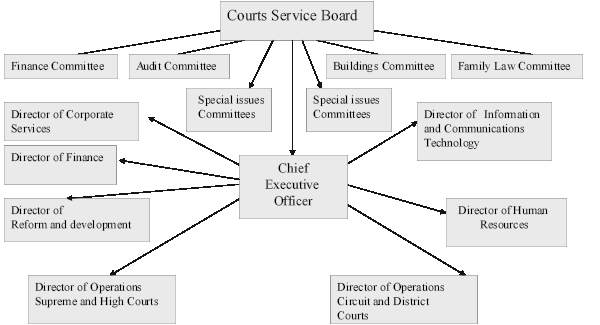
The Courts Service
User Groups
1. Court User Groups
The Courts Service is committed to providing a high quality customer focussed service for persons using the courts. As part of our Customer Service Action Plan user groups have been established to assist us develop a customer centred approach to service delivery. User Groups have been set up in Dublin and in the regions.
1.1. Purpose of Groups
These groups help ensure that the views and suggestions of those intimately involved in the courts system are taken into consideration in the development and operation of policy and initiatives. Such groups assist greatly in improving the efficiency and effectiveness of the system. They also provide a useful forum for the exchange of ideas and help in making users aware of each others needs and concerns.
1.2. Membership
The members of the court user groups are persons representing organisations and others who use the courts or court offices. These include representatives from professional bodies such as the Law Society of Ireland, the Bar Council, the Dublin Solicitors’ Bar Association, the Family Lawyers’ Association, the Office of the Director of Corporate Enforcement, the Consultative Committee of Accounting Bodies in Ireland, the Institute of Chartered Accountants in Ireland, the Prisons Service, the Garda Siochana, the Probation & Welfare Service, the Legal Aid Board, the Office of the Director of Public Prosecutions, the Chief Prosecutions’ Solicitors’ Office, the Chief State Solicitors’ Office, Law Agencies, Victim Support organisations and various other advocacy groups such as Women’s Aid and Amen.
1.3. National Groups
There are six Dublin based user groups which meet at least 3 times per year as follows:
- Criminal cross jurisdiction User Group forum
- Civil cross jurisdiction User Group forum
- Circuit Criminal Court User Group
- Central Criminal Court User Group
- Family Law Court User Group for the Circuit & High Courts
- Dublin Metropolitan District Court User Groups which include the Children Court, Family Law Court, Criminal Court and Traffic Court.
There are also user groups specific to particular areas of the courts such as the Insolvency User Group and the Probate User Group.
1.4. Regional & Local Groups
There are also cross jurisdictional user groups for each county which are managed by the local Regional Offices. These user groups include representatives from the local practicing Barristers, Solicitors, Probation & Welfare Service, An Garda Siochana, Prisons, Legal Aid Board, Victim Support organisations and advocacy groups. The provincial groups meet at least once a year and deal with general issues of interest and concern. When specific local projects are being undertaken the user groups meet as and when the need arises.
In addition to being excellent mechanisms for delivering good customer service, user groups also provide a very useful means of testing the tolerance of a user group for proposed changes e.g. new methods of service delivery, and for communicating informally with the bodies they represent. The experience of the Irish Courts Service has been that the longer a user group has been in existence the more useful it becomes. A level of mutual trust builds up over the passage of time, not only between the Courts Service and the users but also among the various external members
2. Customer Service Annual Forum
In addition to the Court User Groups, the Courts Service hosts an annual forum for all users of the Courts Service. This meeting is a forum for the Courts Service to consult with the following organisations:
- AdVIC
- An Garda Síochána
- Ballymun Community Law Centre
- Bar Council
- Bar Council
- Bridewell Garda Station
- CCABI, Institute of Chartered Accountants in Ireland
- Chief Prosecution Solicitor
- Chief State Solicitor
- Child Care Directorate
- Citizens’ Information Centres
- CLRG (company law review group)
- Commission for Victims of Crime
- Companies Registration Office
- Competition Authority
- Coroners Society of Ireland & Medical Bureau of Road Safety
- Court Support Service
- Crime Victims Helpline
- Dept. of JE&LR
- Dublin Solicitors’ Bar Association
- Family Lawyers Assoc
- FLAC (free legal advice centre)
- HSE
- Immigrant Council of Ireland
- Law Reform Commission
- Law Society
- Legal Aid Board
- MABS (money advice & budget services)
- National Crime Council
- National Network of Women’s Refuges & Support Services
- Northside Community Law Centre
- Office of the Director of Corporate Enforcement
- Office of the Min. for Children
- Personal Injuries Assessment Board
- Prisons Service
- Probation and Welfare Service
- Rape Crisis Network
- Revenue Commissioners Solicitor
- Revenue Solicitors Office
- Special Residential Services Board
- Women’s Aid
- Youth Justice Service (DJELR)
This annual event provides the Courts Service with an opportunity to inform user organisations of proposed new developments. They also allow the Service to obtain feedback from these organisations on future plans and proposals, and on past performance. The presentations to the 2007 meeting of the forum dealt with such issues as the Courts Service capital development programme, the new Criminal Court Complex, an on-line search facility for the High Court case tracking system, e-small claims and developments in the Courts Service website. The fourth annual forum will take place in the Hilary Term of 2008 (January to March 2008).
Assembly and Executive Review Committee Inquiry
into The Devolution of Policing and Justice Matters
Prosecutions: Independence And Accountability
Introduction
1. This short paper addresses issues which the Committee has been considering in relation to prosecutions. The future arrangements for prosecution under the new devolved arrangements significantly change the relationship between the Public Prosecution Service for NI (PPS) and the Attorney General by underpinning the independence of the Director of Public Prosecutions for Northern Ireland (DPP). In the light of this change, the Committee raises the question of the relationship between the PPS and the Assembly.
2. By way of introduction, it may be noted that although the changes to be introduced in Northern Ireland are a considerable departure from the model that has existed hitherto in the United Kingdom, the nature of the Attorney General’s role has been the subject of considerable debate in England and Wales in recent years. This led the Government to publish in July 2007 a Consultation Paper on the Role of the Attorney General which sets out various options for reform of the role of the Attorney General. One of the options is whether changes should be made to the role of the Attorney General in relation to criminal proceedings including the role of superintending the prosecuting authorities.
The New Arrangements for Northern Ireland
3. As explained in the Government’s Consultation Paper, Devolving Policing and Justice in Northern Ireland, the current position in Northern Ireland is that one person, the Attorney General, holds two posts: Attorney General for England and Wales and Attorney General for Northern Ireland. The DPP as head of the PPS is subject to the superintendence and direction of the Attorney General and is accountable to the Attorney for the performance of his functions. The Attorney is in turn answerable to Parliament for the PPS.
4. Under the new arrangements the Attorney General for England and Wales will no longer be the Attorney General for Northern Ireland and the First Minister and deputy First Minister must appoint the Attorney General for Northern Ireland. The functions that the current Attorney General exercises relating to Northern Ireland which are excepted and not devolved will be the responsibility of the Advocate General for Northern Ireland who will be the Attorney General for England and Wales.
5. The DPP’s relationship with both the new Attorney General for Northern Ireland and the Advocate General for Northern Ireland will change. Section 42 (1) of the Justice (NI) Act 2002 (the 2002 Act) states that the functions of the Director shall be exercised independently of any other person. The section goes on to prescribe a different relationship between the Director and the Attorney General for Northern Ireland – one of consultation rather than superintendence. Section 42(2) provides that the Director must consult the Attorney General for Northern Ireland and the Advocate General (a) before issuing or making alterations to a code under section 37 (Code for Prosecutors), and (b) before preparing his annual report. Section 42(3) provides that the Attorney General and the Director may (from time to time) consult each other on any matter for which the Attorney General for Northern Ireland is accountable to the Assembly. Section 42(4) provides for a similar relationship regarding the matters for which the Advocate General is responsible to Parliament.
The Changed Relationship between the Attorney General and the DPP
6. To understand the context of the changed relationship between the Attorney General and the DPP one has to turn to the Criminal Justice Review which originally proposed the changes that have been enacted in the 2002 Act. The Review considered that in the particular circumstances of Northern Ireland the independence of the prosecution process from political pressure should be strengthened, by ensuring that the relationship between the Attorney General and head of the Prosecution Service, while containing elements of oversight, is consultative and not supervisory. In other words:
…[T]here should be no power for the Attorney General to direct the prosecutor, whether in individual cases or on policy matters. (para 4.162)
7. The Review stated that it was attracted to aspects of the model in the Republic of Ireland. There section 2(5) of the Prosecution of Offences Act 1974 states in similar terms to section 42(1) of the 2002 Act that the DPP shall be independent in the performance of his or her functions. The relationship between the DPP and the Attorney General is also expressed in similar terms to section 42(3) of the 2002 Act. Section 2(6) provides that the Attorney and the Director shall consult each other from time to time in relation to matters pertaining to the functions of the Director. In his book, The Attorney General, Politics and the Public Interest, Edwards records that in the explanatory memorandum issued by the Department of the Prime Minister of Ireland in making public the terms of the Prosecution of Offences Bill, it was envisaged that the provision for consultation would not confer on the Attorney General any right to give directions to the Director as to how he will perform his functions in relation to particular cases or generally. Edwards concludes that the DPP in the Republic of Ireland is not accountable to the Attorney General.
8. It may useful at this point to draw upon a distinction made by the Criminal Justice Review between accountability in the subordinate/obedient sense and accountability in the explanatory/answerability which was identified in research undertaken for the Review. The DPP will no longer be accountable to the Attorney General in the subordinate/obedient sense. The logic of the consultative relationship would seem to require that the Attorney General will no longer be able to make decisions in relation to prosecution and the section 41 of the 2002 Act transfers a number of decision making functions to the DPP. But it is clear that the Attorney General will still have certain functions in relation to prosecution which the Review described as ‘elements of oversight’. For example, as mentioned above, the DPP must consult the Attorney General before preparing his or her annual report and before issuing or making alterations to the Code for Prosecutors. Although the Attorney General has no power to give directions on these matters, the fact that the DPP must consult on them could be characterized as accountability in the explanatory/answerability sense. In addition, the Review recommended that the Criminal Justice Inspectorate be under a duty to inspect the work of the PPS and report to the Attorney General on this. Section 47 of the 2002 Act enables inspections to take place after consultation with the Attorney General and this work must be reported to the Attorney General.
The Relationship between the PPS and the Assembly
9. It is suggested that it may be useful to distinguish between three different functions relating to the work of the PPS and the DDP – the general work of the Service, prosecution policy and individual prosecution decisions. The Criminal Justice Review recommended that the head of the prosecution service should be accountable to the appropriate Assembly Committee for financial and administrative matters relating to the running of the service. Section 30(11) of the Justice Act provides that the Director may not be required in any proceedings of the Assembly to answer any question or produce any document relating to a matter other than the finances and administration of the Service. This implies that the DPP may be required to account directly to the Assembly for matters of finance and administration. A parallel may be drawn here with the Republic of Ireland where legislation provides that the Committee of Public Accounts may in respect of the DPP and his officers direct their attendance to answer questions on matters relating to ‘the general administration of the office’.[1]
10. It is also clear that it is envisaged that the Assembly will have a role in relation to the work of the PPS through the Attorney General. This will have to be set out clearly in standing orders. The Criminal Justice Review considered that the Attorney General would be answerable to the Assembly for the work of the prosecution service in general terms. This contrasts with the position in the Republic of Ireland where it appears that the Attorney General is not personally answerable to parliament for the way he discharges his functions. Section 25(1) of the 2002 Act provides that the Attorney General may participate in the proceedings of the Assembly to the extent permitted by its standing orders. Section 25(3) provides that the Attorney General may, in any proceedings of the Assembly, decline to answer any question or produce any document relating to the operation of the system of prosecution of offences in any particular case if he considers that answering the question or producing the document might prejudice criminal proceedings in that case or would be otherwise against the public interest. It would seem to be implicit in these provisions that standing orders may require the Attorney General to answer questions on the general work of the PPS, not related to a specific case. This is borne out further by section 42(3) which provides that the Attorney General and the DPP may consult each other on any matter for which the Attorney General is accountable to the Assembly. Section 42(6) in addition provides that the Attorney General must lay a copy of each annual report of the PPS before the Assembly.
11. It may seem anomalous that the Attorney General should be ‘accountable’ for the general work of the PPS when the Attorney General is not responsible for the work of the PPS. The Criminal Justice Inspectorate in its report on the Public Prosecution Service considered that the new arrangements whereby the PPS will be a non-Ministerial Department funded from the Northern Ireland block grant with an Attorney General unable to provide a line of accountability may perpetuate some of the difficulties it identified in the current arrangements whereby there is a disjunction between one Department (the NIO) being responsible for funding while not being able to engage in a normal dialogue about performance which would routinely take place between a funding department and a publicly funded body. The importance of the PPS, in its view, required that it be accountable through its funding body for the delivery of a high quality service. It considered that it was beyond its remit to recommend a specific structure but thought that an arrangement was possible which would provide the necessary accountability while preserving the independence of decision making.
12. Turning to questions of prosecution policy, the Criminal Justice Review considered that the Attorney General should not be able to direct the DPP on any matter of policy and this is carried through into the 2002 Act by the consultative nature of the relationship. However, as noted above, the DPP must consult the Attorney General before issuing or making alterations to the Code for Prosecutors which gives guidance on general principles to be applied when making prosecution decisions. This suggests that prosecution policy is not an issue which is the exclusive concern of the PPS. The recent Consultation Paper on the Role of the Attorney General in England and Wales states that the Government has a legitimate interest in overall prosecution policy and takes as an example the role of the Attorney General for England and Wales in ensuring that prosecutors give greater priority to certain categories of cases such as street crime, rape, counter-terrorism, animal rights extremism and tackling radicalism (para 3.19). It is suggested that under the new arrangements in Northern Ireland the Attorney General could continue to have a role of bringing policy matters of concern to the Northern Ireland Executive and Assembly to the attention of the PPS through the consultative mechanism.
13. Finally, there is the question of individual decisions. The consultative nature of the relationship precludes the Attorney General from exercising any power of direction over individual prosecution decisions. A further question is whether the Assembly may have a legitimate interest in being provided with an explanation for individual decisions in certain, perhaps high profile cases. As noted, section 25(3) enables the Attorney General to decline to answer any question in any particular case which may prejudice the proceedings or be against the public interest. But the 2002 Act does not appear to preclude the Attorney General from answering questions in individual cases subject to these exceptions. The Criminal Justice Review considered that it may be that the prosecutor and the Attorney General would conclude that in no circumstances should they be expected to answer such questions but it did not think that this should be ruled out for all time. Its approach was to stand firm against the DPP being accountable in the subordinate/obedient sense for individual decisions but to encourage explanatory mechanisms where it was possible to do so.
14. It may be thought anomalous that the Attorney General should be asked to explain decisions which he has not taken and is not responsible for. Under the existing arrangements, however, in recent times Attorneys seeking to explain prosecution decisions to Parliament have made it clear that they did not direct such decisions and that they were made independently by the DPP. Alternatively, it may be thought more appropriate for the Director of Public Prosecutions to explain his own decisions directly to the public where there is a request for reasons and it is possible to do so. This would be consistent with the present Code for Prosecutors which states that where a request for reasons is made the PPS will consider what information may reasonably be given. This is a difficult area that will have to be worked out between the First Minister, the deputy First Minister, the Attorney General and DPP and within the consultative relationship between the Attorney General and the DPP.
Conclusion
15. In its review of other jurisdictions the Criminal Justice Review concluded that there were discernible trends in the direction of independence of prosecution decision making from political influence (in other words away from accountability in the subordinate/obedient sense) but that there was also a discernible trend in the direction of enhancing transparency through ‘explanatory’ mechanisms. In proposing a changed relationship between the Attorney General and the DPP under devolved arrangements, the Criminal Justice Review was attempting to balance prosecutorial independence and political accountability along these lines. A recent study co-authored by this commentator has argued that the arrangements for Northern Ireland are more in line with international standards than those that currently operate in the rest of the United Kingdom. It is one thing, however, to prescribe a model for the future; it is quite another to make it work effectively. The 2002 Act has set the framework for the arrangements but there will need to be a shared understanding of what is required by the DPP, the Attorney General, the First Minister and deputy First Minister and the Assembly in order to make the new arrangements work.
Professor John Jackson
Queen’s University Belfast
December 2007
References
Attorney Generals’ Office, The Governance of Britain: A Consultation on the Role of the Attorney General (2007)
Bryett and Osborne, Criminal Prosecution Procedure and Practice: International Perspectives (2000) Criminal Justice Review Group Research Report 16
Criminal Justice Inspection Northern Ireland, An Inspection of the Public Prosecution Service for Northern Ireland (2007)
Criminal Justice Review Group, Review of the Criminal Justice System in Northern Ireland (2000)
Edwards, The Attorney General, Politics and the Public Interest (1984)
Jackson and Hancock, Standards for Prosecutors: An Analysis of the United Kingdom National Prosecuting Agencies (2006)
Northern Ireland Office, Devolving Policing and Justice in Northern Ireland: A Discussion Paper (2007)
Public Prosecution Service for Northern Ireland, Code for Prosecutors (2005)
[1] See Committees of the Houses of the Oireachtas (Compellability, Privileges and Immunities of Witnesses) Act 1997.

